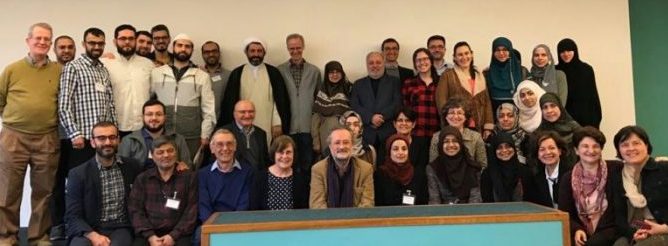
Apr 18, 2018 | Non categorizzato
 It will be discussed on Saturday, April 21, from 16 to 19 pm, within the wider context of a conference promoted by the Focolare Movement. The title of this event is“Together as a sign of hope. Christians and Muslims journeying together in the light of the charism of unity” and it will take place at the Mariapolis Centre in Castel Gandolfo, Rome from the 19 to 22 April. About 600 Christians and Muslims are expected to attend. In a social context, particularly in the western world, marked by fear, prejudice and distrust that build barriers and by ideas that nourish clashes and divisions, witness of a shared commitment between Christians and Muslims, launches a message that goes against the current and sows seeds of hope. These Christians and Muslims unit for peace, solidarity, development and harmony among peoples of different faiths, cultures and traditions. It is possible to live together in harmony, respect, solidarity and peace. It is also possible to work together, share common objectives and cooperate to achieve them, without weakening one’s identity and heritage of values, while exercising a fair and frank confrontation that strengthens mutual understanding and respect, and giving preference to that which unites over that which divides. The driving force of this journey is the charism of unity of Chiara Lubich. On May 18, 1997, in her speech at the Malcolm X Mosque in Harlem, where she made a pact to work for unity and peace together with Imam Wallace Deen Mohammed and the Muslim community present, she said: “Here I have experienced profound fraternity. Its beauty is so remarkable that it can only be God’s work. He has really made us one family for his plans”. While speaking about the underlying principle of this journey of communion, she explained: “The so-called Golden Rule – ‘Do not do to others as you would not have them do to you’ – is common to almost all religions, even if with different versions. This Golden Rule is enough to guarantee our bond of love with each neighbour, and this love would be enough to make humanity become one family”. In the wake of that experience and of initiatives launched in various countries to promote Islamic-Christian dialogue, the coming event at Castelgandolfo aims at being a step foward in the journey towards universal brotherhood and a sign of hope for humanity. “Religious education is attention to peace” says Adnane Mokrani, a professor at the Pontifical Gregorian University and at the Pontifical Institute for Arabic and Islamic Studies (PISAI) and president of Cipax, who will be present at the conference. “With such an approach, there would be no divisions, but there would be solidarity, collaboration, unity among people of different faiths, called to work together for the common good of humanity and to serve everyone without any distinction”. Maria Voce, President of the Focolare Movement, Cardinal Jean-Louis Pierre Tauran, President of the Pontifical Council for Interreligious Dialogue, Abdullah el Radwan, Head of the Islamic Cultural Centre of Italy, Izzedin Elzir, Imam of Florence and president of UCOII, Piero Coda, Dean of the Sophia University Institute and Mohammad Shomali, director of the London Islamic Centre will be among the speakers during this open gathering. Numerous experiences of dialogue and fruitful collaboration will be shared as fragments of unity to be multiplied.
It will be discussed on Saturday, April 21, from 16 to 19 pm, within the wider context of a conference promoted by the Focolare Movement. The title of this event is“Together as a sign of hope. Christians and Muslims journeying together in the light of the charism of unity” and it will take place at the Mariapolis Centre in Castel Gandolfo, Rome from the 19 to 22 April. About 600 Christians and Muslims are expected to attend. In a social context, particularly in the western world, marked by fear, prejudice and distrust that build barriers and by ideas that nourish clashes and divisions, witness of a shared commitment between Christians and Muslims, launches a message that goes against the current and sows seeds of hope. These Christians and Muslims unit for peace, solidarity, development and harmony among peoples of different faiths, cultures and traditions. It is possible to live together in harmony, respect, solidarity and peace. It is also possible to work together, share common objectives and cooperate to achieve them, without weakening one’s identity and heritage of values, while exercising a fair and frank confrontation that strengthens mutual understanding and respect, and giving preference to that which unites over that which divides. The driving force of this journey is the charism of unity of Chiara Lubich. On May 18, 1997, in her speech at the Malcolm X Mosque in Harlem, where she made a pact to work for unity and peace together with Imam Wallace Deen Mohammed and the Muslim community present, she said: “Here I have experienced profound fraternity. Its beauty is so remarkable that it can only be God’s work. He has really made us one family for his plans”. While speaking about the underlying principle of this journey of communion, she explained: “The so-called Golden Rule – ‘Do not do to others as you would not have them do to you’ – is common to almost all religions, even if with different versions. This Golden Rule is enough to guarantee our bond of love with each neighbour, and this love would be enough to make humanity become one family”. In the wake of that experience and of initiatives launched in various countries to promote Islamic-Christian dialogue, the coming event at Castelgandolfo aims at being a step foward in the journey towards universal brotherhood and a sign of hope for humanity. “Religious education is attention to peace” says Adnane Mokrani, a professor at the Pontifical Gregorian University and at the Pontifical Institute for Arabic and Islamic Studies (PISAI) and president of Cipax, who will be present at the conference. “With such an approach, there would be no divisions, but there would be solidarity, collaboration, unity among people of different faiths, called to work together for the common good of humanity and to serve everyone without any distinction”. Maria Voce, President of the Focolare Movement, Cardinal Jean-Louis Pierre Tauran, President of the Pontifical Council for Interreligious Dialogue, Abdullah el Radwan, Head of the Islamic Cultural Centre of Italy, Izzedin Elzir, Imam of Florence and president of UCOII, Piero Coda, Dean of the Sophia University Institute and Mohammad Shomali, director of the London Islamic Centre will be among the speakers during this open gathering. Numerous experiences of dialogue and fruitful collaboration will be shared as fragments of unity to be multiplied.
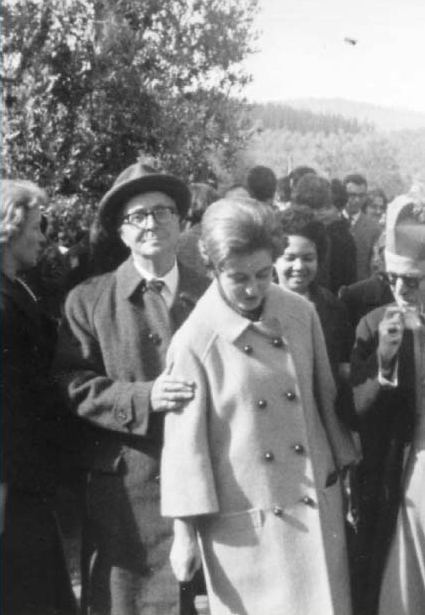
Apr 18, 2018 | Non categorizzato
 20 April 1979 – Like every Christian, my love goes to the Lord in every moment and I contemplate Him with respectful fear. At times, however, I take chances since it never represses my calling as a jokester. And this morning at Mass an invocation suddenly popped into my mind: “You are the Omnipotent.” And immediately after my weak poetic side looked for a rhyme: “I am ‘nopotent’.” Then, I thought that if I’m nothing, by receiving God into myself, I take on Divine value. 5 November 1979 – I’m often taken by thoughts of death, but they don’t come in darkness and sorrow. Death comes as a light that shows our greatness and the beauty of life, and of its Author who could be anything but a most benevolent father. Looking at certain periods in life was hard, crude, desolate: the misery, the mourning, the wars, the betrayals, the meaninglessness… But contemplated as a whole, life appears a prodigy – a demonstration – of God’s fatherliness: 86 years of life, the wounds of battle that kept the war ever present, the political battles, the financial problems, the misunderstandings both inflicted and undergone, the physical weakness, etc. But seen as a whole, it appears a defeat of death to me, a joyful and necessary operation in which I was given to do more good than bad and have feelings of extraordinary successes, friendships, journeys, mystical elevations, lessons of wisdom and faith. I never stop thanking the sharer of so many good thing that were, given to me so freely. So even amid the shadows and the sorrows, life was beautiful for me, a gift worthy of its Creator. And my daily observations, reasonings and verifying has proven to me the truth of the religious faith that has always enlightened me and made me want to live. Life is truly beautiful, and its beauty shows the absurdity of politics and the personal behaviours of those who have worked to make it ugly (war, terrorism, exploitation, hedonism, greed, lust) and all the deformations and lacerations intended by stupidity the intelligence of the world’s Enemy. Source: Igino Giordani, Diario di fuoco, Città Nuova, Rome, 2005 (1980), pp.238-240. Brochure: On the anniversary of his death, the Centre named after him has published a brochure about the life of Igino Giordani and his spiritual journey. For information: info@iginogiordani.info Giordani on Facebook
20 April 1979 – Like every Christian, my love goes to the Lord in every moment and I contemplate Him with respectful fear. At times, however, I take chances since it never represses my calling as a jokester. And this morning at Mass an invocation suddenly popped into my mind: “You are the Omnipotent.” And immediately after my weak poetic side looked for a rhyme: “I am ‘nopotent’.” Then, I thought that if I’m nothing, by receiving God into myself, I take on Divine value. 5 November 1979 – I’m often taken by thoughts of death, but they don’t come in darkness and sorrow. Death comes as a light that shows our greatness and the beauty of life, and of its Author who could be anything but a most benevolent father. Looking at certain periods in life was hard, crude, desolate: the misery, the mourning, the wars, the betrayals, the meaninglessness… But contemplated as a whole, life appears a prodigy – a demonstration – of God’s fatherliness: 86 years of life, the wounds of battle that kept the war ever present, the political battles, the financial problems, the misunderstandings both inflicted and undergone, the physical weakness, etc. But seen as a whole, it appears a defeat of death to me, a joyful and necessary operation in which I was given to do more good than bad and have feelings of extraordinary successes, friendships, journeys, mystical elevations, lessons of wisdom and faith. I never stop thanking the sharer of so many good thing that were, given to me so freely. So even amid the shadows and the sorrows, life was beautiful for me, a gift worthy of its Creator. And my daily observations, reasonings and verifying has proven to me the truth of the religious faith that has always enlightened me and made me want to live. Life is truly beautiful, and its beauty shows the absurdity of politics and the personal behaviours of those who have worked to make it ugly (war, terrorism, exploitation, hedonism, greed, lust) and all the deformations and lacerations intended by stupidity the intelligence of the world’s Enemy. Source: Igino Giordani, Diario di fuoco, Città Nuova, Rome, 2005 (1980), pp.238-240. Brochure: On the anniversary of his death, the Centre named after him has published a brochure about the life of Igino Giordani and his spiritual journey. For information: info@iginogiordani.info Giordani on Facebook
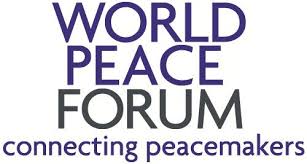
Apr 17, 2018 | Focolare Worldwide
 “Leadership for Peace” is the theme of the 12th edition of the World Peace Forum from 19 to 22 April. The International Forum links and gathers hundreds of young activists and promoters in the respective countries and actions for peace. After the recent editions in Cairo (Egypt), Florianapolis (Brazil) and Madaba (Jordan), this year Toronto (Canada) will host the event with an extensive programme of debates, studies and analyses for development, exchange of good practices, conflict resolution models, and identification of common values and strategies to create a chain of leaders motivated in building world peace. Forum 2018 particularly addresses directors, public and private administrators, teachers, educators, NGO presidents, religious leaders and government agencies, activists, and members of movements that operate in favour of dialogue, peace and disarmament. For information: www.worldpeaceforum.org
“Leadership for Peace” is the theme of the 12th edition of the World Peace Forum from 19 to 22 April. The International Forum links and gathers hundreds of young activists and promoters in the respective countries and actions for peace. After the recent editions in Cairo (Egypt), Florianapolis (Brazil) and Madaba (Jordan), this year Toronto (Canada) will host the event with an extensive programme of debates, studies and analyses for development, exchange of good practices, conflict resolution models, and identification of common values and strategies to create a chain of leaders motivated in building world peace. Forum 2018 particularly addresses directors, public and private administrators, teachers, educators, NGO presidents, religious leaders and government agencies, activists, and members of movements that operate in favour of dialogue, peace and disarmament. For information: www.worldpeaceforum.org

Apr 17, 2018 | Non categorizzato
“Walking together, serving justice and peace.” With this goal, the World Council of Churches, the worldwide organization focused on dialogue between the different Christian denominations, has reached the 70th anniversary of its founding in 1948. This year there will be a number of opportunities to look at the results of the work that has been carried out for Christian unity. At the same time, it will be an opportunity to renew the commitment toward the future challenge of full communion, to best respond to God’s calling for the unity of the human family, justice and world peace. Among the festivities, the Focolare Movement has organized an event on April 18 in Geneva, Switzerland in order to commemorate the rich collaboration between Chiara Lubich and the Focolare Movement with the World Council of Churches. The program includes a presentation by Pastor Olav Fykse Tveit, the secretary general of the council, and Jesús Morán, the co-president of the Focolare. For streaming see link
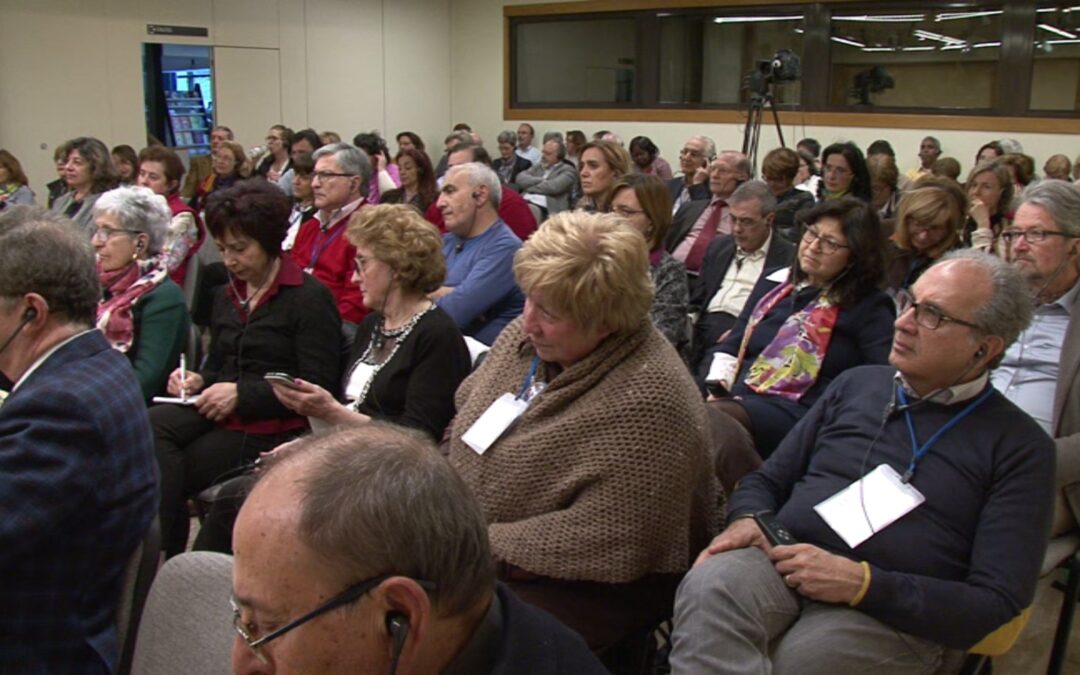
Apr 17, 2018 | Non categorizzato
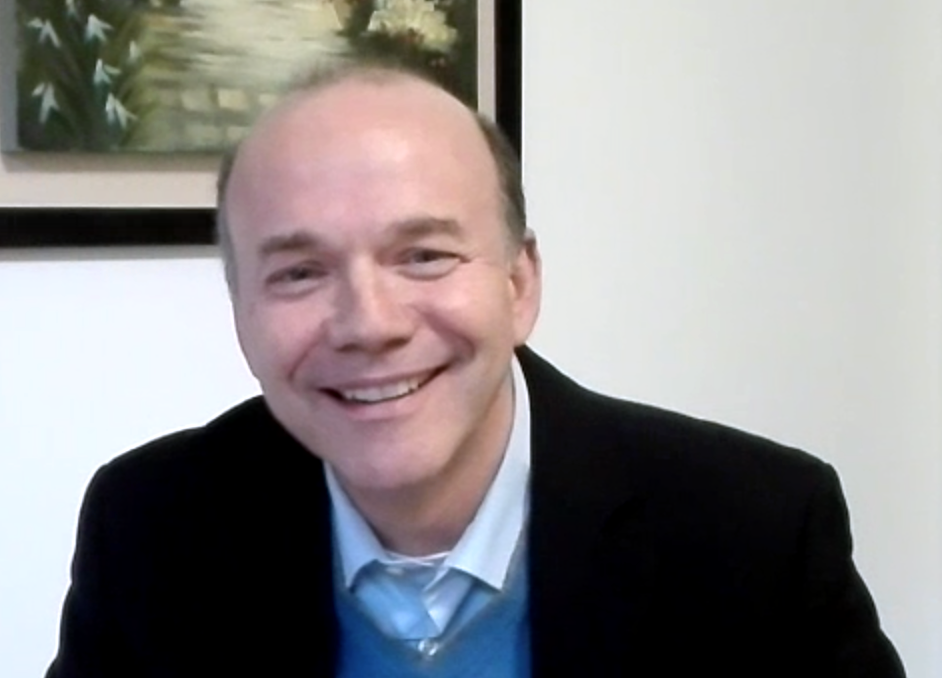
Marc St Hilaire. Focolare Movement
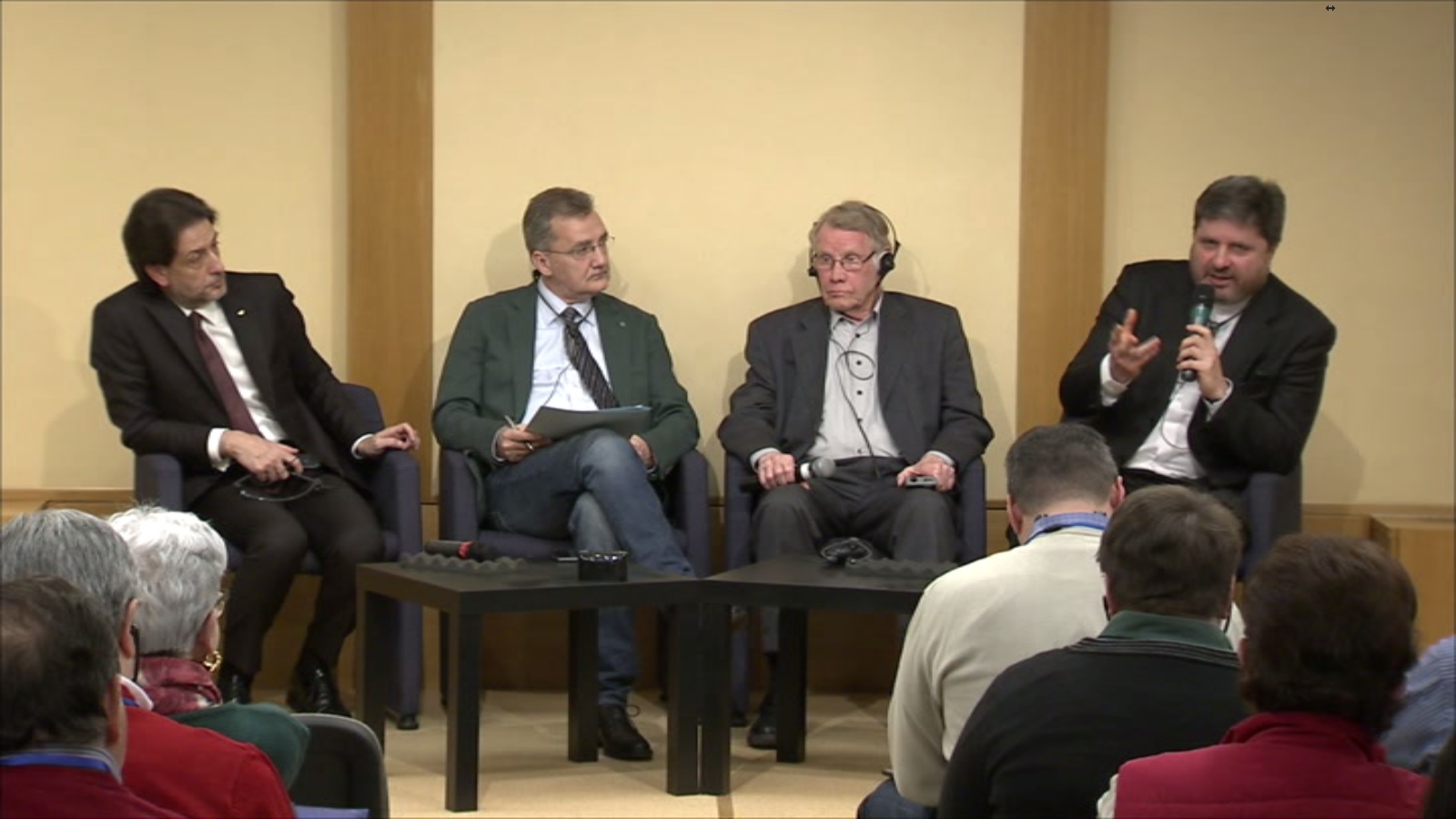
Salvatore Martinez, Aurelio Molè, P. Marmann, D. Angelo Romano
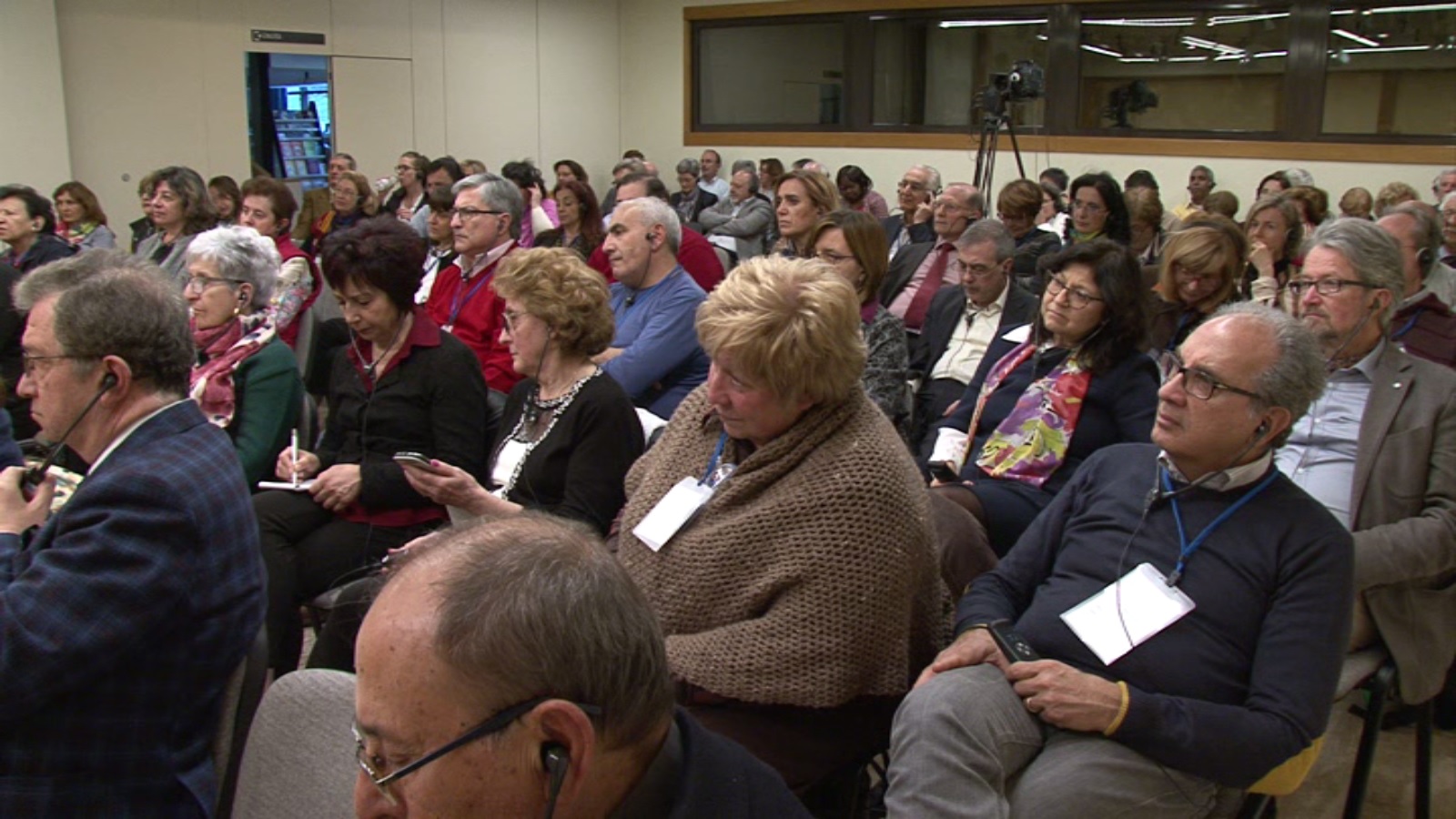 Fr Angelo Romano, Rector of the Basilica of St Bartholomew in Rome, for the Community of Sant’Egidio and in charge of dialogue, “There are sectors in which the path of communion has to grow: as Christians we cannot refuse to question ourselves about the phenomenon of migration and take steps together. Another topic to examine more deeply are the conflicts, which generate poverty and suffering and send a message that is contrary to the Gospel, which says that those who are different can never live together; whereas, we believe that the Gospel is a leaven of unity and peace, and Christians are called to provide a new perspective.” The work of the movements is an incarnation of the Gospel: “We’re the answer,” says Martinez, “of that dichotomy that many would like to put between doctrine and mercy, because the theology of the spirit is done with the life.” And proposing a Church that is poor and missionary is not in antithesis with the doctrine, but part of it: “It’s that dialogue with the world and modernity that the Second Vatican Council prophesied,” says Martinez, “which Paul VI was the first to attempt and all the popes to continue. It’s this original synthesis that the Pope asks us to give witness to: a doctrine that one incarnates in the history.” In this prospective, twenty years from 1998, the ecclesial movements appear more and more to be “the Providential answer to the needs of our time”. It is an answer that implies a constant effort towards unity, to bringing the face of Christ to the human peripheries.
Fr Angelo Romano, Rector of the Basilica of St Bartholomew in Rome, for the Community of Sant’Egidio and in charge of dialogue, “There are sectors in which the path of communion has to grow: as Christians we cannot refuse to question ourselves about the phenomenon of migration and take steps together. Another topic to examine more deeply are the conflicts, which generate poverty and suffering and send a message that is contrary to the Gospel, which says that those who are different can never live together; whereas, we believe that the Gospel is a leaven of unity and peace, and Christians are called to provide a new perspective.” The work of the movements is an incarnation of the Gospel: “We’re the answer,” says Martinez, “of that dichotomy that many would like to put between doctrine and mercy, because the theology of the spirit is done with the life.” And proposing a Church that is poor and missionary is not in antithesis with the doctrine, but part of it: “It’s that dialogue with the world and modernity that the Second Vatican Council prophesied,” says Martinez, “which Paul VI was the first to attempt and all the popes to continue. It’s this original synthesis that the Pope asks us to give witness to: a doctrine that one incarnates in the history.” In this prospective, twenty years from 1998, the ecclesial movements appear more and more to be “the Providential answer to the needs of our time”. It is an answer that implies a constant effort towards unity, to bringing the face of Christ to the human peripheries.
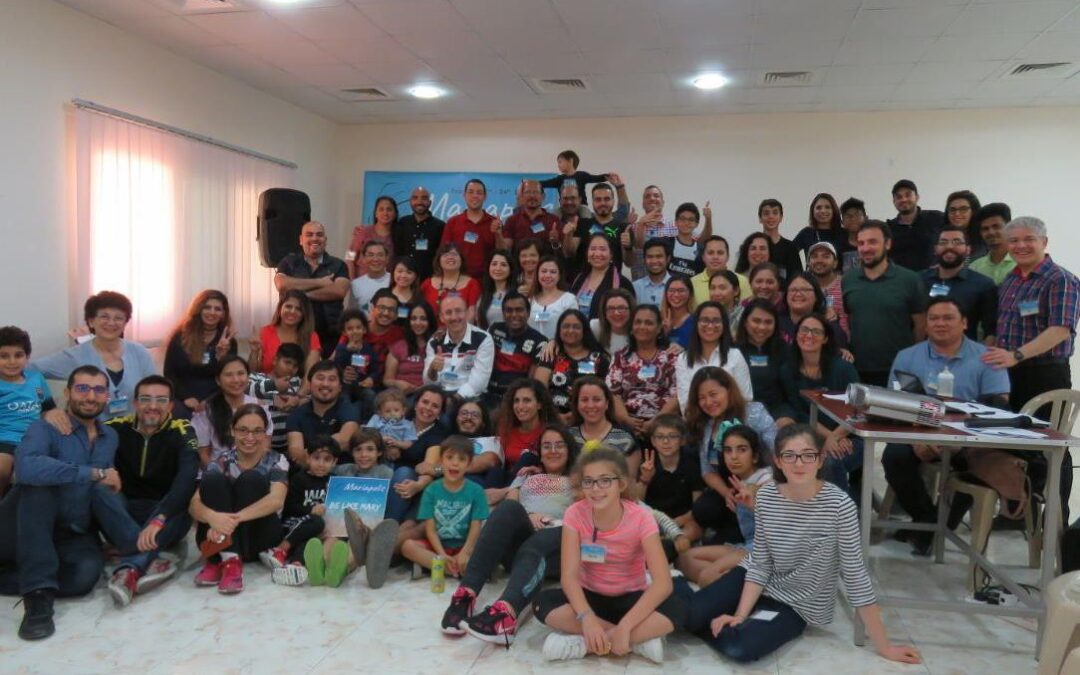
Apr 16, 2018 | Focolare Worldwide
The Burj Khalifa is currently the world’s tallest building, its 160 floors rising to a dizzying 830 metres. At ground level an immense choreographed fountain is illuminated by laser beams bouncing through water jets to a constantly changing musical accompaniment. Although its “world-highest” title is under threat from the Kingdom Tower of Gedda (200 floors) and other skyscrapers rising up in various countries, the city of Dubai is synonymous with its ‘At The Top’ observation deck, offering breath-taking birds-eye views of stunning ultramodern constructions. In recent years, the so-called ‘city of dreams’ has seen one of the highest immigration rates in the world, attracting people from many different countries looking for work. This has produced a distinctively cosmopolitan environment, one not without difficulties, particularly for its foreign workers. In this high-rise ‘concrete jungle’ dwells a small community of the Focolare Movement. Many left their own countries for Dubai – like countless others – hoping to find better financial opportunities for their families. For three weeks in February this community enthusiastically welcomed Romè from the Philippines, Fadia and Susanne from Jordan and Murad from Syria, later joined by Alessandro from Italy for part of the time. Together they formed a ‘temporary focolare’ in this unique location. 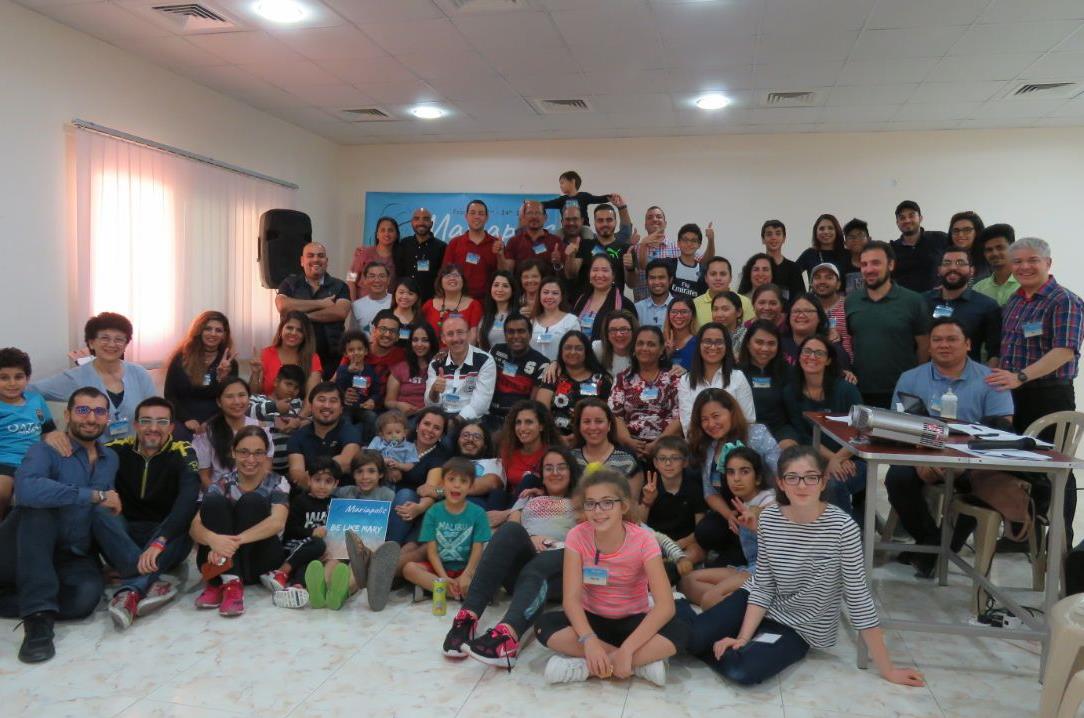 The visitors recall: “We were welcomed at the airport by a group of radiant faces. Each one of us was presented with a beautiful flower! Instantly we were made to feel at home. Our first morning in Dubai dawned with an email greeting from Focolare President, Maria Voce: ‘May Jesus be always present among you, and may He be the most beautiful gift for those you will meet!’ These words guided our steps as we entered into the heart of this community. On tip-toe we contacted one person after another, setting up appointments in their homes, in churches, restaurants, shopping centres and even in metro stations. Wherever we met, people brought items – providence – to share with others. Every moment of the day, and well into the night hours as well, provided opportunities to build a ‘shelter’ for Jesus, for Jesus among us. And what joy every time!” The visitors joined an international and culturally diverse group of Focolare animators to prepare a 2-day Mariapolis. “Our presence in Dubai was in order to serve. But each one of the 70 participants at the Mariapolis, from eleven different nationalities, gave their own active contribution. Chiara Lubich’s last wish ‘always be a family’ was evident there.” The visitors continue: “Talking with several Dubai residents, we became aware of how many worries they may have – discrimination, the fear of losing a job, the high cost of living combined with disproportionately low salaries, no permanent residence, and often no clear future. However, beneath all this, lies a ‘treasure’ hidden in each one’s heart: God, whom they have chosen as their ideal in life.” In conclusion, “We saw how it’s the life of unity lived as part of a community which helps each one withstand the daily challenges.” This – and not height in metres – is what characterizes their distinctive race to The Top. Chiara Favotti
The visitors recall: “We were welcomed at the airport by a group of radiant faces. Each one of us was presented with a beautiful flower! Instantly we were made to feel at home. Our first morning in Dubai dawned with an email greeting from Focolare President, Maria Voce: ‘May Jesus be always present among you, and may He be the most beautiful gift for those you will meet!’ These words guided our steps as we entered into the heart of this community. On tip-toe we contacted one person after another, setting up appointments in their homes, in churches, restaurants, shopping centres and even in metro stations. Wherever we met, people brought items – providence – to share with others. Every moment of the day, and well into the night hours as well, provided opportunities to build a ‘shelter’ for Jesus, for Jesus among us. And what joy every time!” The visitors joined an international and culturally diverse group of Focolare animators to prepare a 2-day Mariapolis. “Our presence in Dubai was in order to serve. But each one of the 70 participants at the Mariapolis, from eleven different nationalities, gave their own active contribution. Chiara Lubich’s last wish ‘always be a family’ was evident there.” The visitors continue: “Talking with several Dubai residents, we became aware of how many worries they may have – discrimination, the fear of losing a job, the high cost of living combined with disproportionately low salaries, no permanent residence, and often no clear future. However, beneath all this, lies a ‘treasure’ hidden in each one’s heart: God, whom they have chosen as their ideal in life.” In conclusion, “We saw how it’s the life of unity lived as part of a community which helps each one withstand the daily challenges.” This – and not height in metres – is what characterizes their distinctive race to The Top. Chiara Favotti
Apr 15, 2018 | Focolare Worldwide
The military intervention in Syria on the night of Friday 13th April has become the focus of international concern. After the heartfelt appeal of the Holy Father, Maria Voce, President of the Focolare, expressed, on behalf of the members of the Movement all over the world, her closeness, solidarity and prayer for the Syrian people who have been suffering immensely for seven years now. “Since we are continually in contact with our communities in Syria,” Maria Voce said, “we cannot fail to make our own their great suffering on perceiving themselves as victims of a proxy war, caused and carried out by outside interests.” “The Movement,” the President stressed, “appeals to political leaders all over the world to return to a profound and truthful dialogue, guided by the sincere search for a peaceful solution, for the good of the Syrian people and all peoples in the Middle East.”
Rocca di Papa (Italy), 15th April 2018
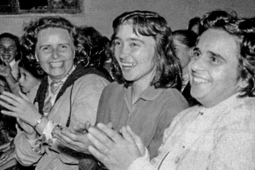
Apr 13, 2018 | Non categorizzato
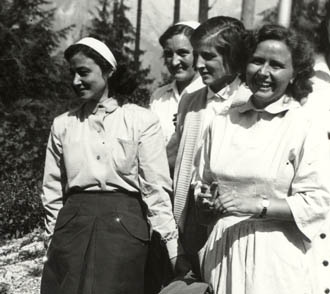 “We’ll never be able to quantify the help that we receive from our brothers and sisters. How much courage their faith inspires in us, how much warmth their love, how much their example draws us!” Chiara Lubich (1920-2008), who wrote these words, was known as someone who drew after her hundreds and thousands of people and constructed relationships with Buddhists, Muslims. She is still being followed by people with no religious affiliation and breatheing new life into politics and economy. The friendship with the first companions of Silvia Lubich whom they knew simply as “Chiara” or Clare, played no small role. It all began with a choice of God and her consecration to Him in 1943, Trent, Italy. However, quite soon it was no longer a single “I”, but a collective subject that began to move, to act, to pray and to love: Chiara and her first companions could have ended becoming anyone, but they became beacons of light on all five continents. This story has many incredible elements, but yet it’s simple. You understand it if you open and read in chapter 13 of John’s Gospel: “I give you a new commandment, that you love one another. As I have loved you, so must you love one another” (13:34). This is a commandment that can only be lived out in the company of others. When Chiara and her companions read this Gospel passage in a bomb shelter, they looked at one another very intensely as they thought about the commitment it would be. They didn’t hesitate, but said to each other: “I’m ready to love you to the point of giving my life for you.” Chiara would later consider this the cornerstone on which the entire Focolare Movement would rest. It’s certainly not something unheard of in the history of the Church, but there might be one thing new about it. Chiara immediately conveyed to her companions whatever she was living and all that the Holy Spirit was inspiring in her. The bond among them was stronger than cement, and I would like to illustrate the qulaity of their relationship that valued and freed potentials, edifying a work that was of God.
“We’ll never be able to quantify the help that we receive from our brothers and sisters. How much courage their faith inspires in us, how much warmth their love, how much their example draws us!” Chiara Lubich (1920-2008), who wrote these words, was known as someone who drew after her hundreds and thousands of people and constructed relationships with Buddhists, Muslims. She is still being followed by people with no religious affiliation and breatheing new life into politics and economy. The friendship with the first companions of Silvia Lubich whom they knew simply as “Chiara” or Clare, played no small role. It all began with a choice of God and her consecration to Him in 1943, Trent, Italy. However, quite soon it was no longer a single “I”, but a collective subject that began to move, to act, to pray and to love: Chiara and her first companions could have ended becoming anyone, but they became beacons of light on all five continents. This story has many incredible elements, but yet it’s simple. You understand it if you open and read in chapter 13 of John’s Gospel: “I give you a new commandment, that you love one another. As I have loved you, so must you love one another” (13:34). This is a commandment that can only be lived out in the company of others. When Chiara and her companions read this Gospel passage in a bomb shelter, they looked at one another very intensely as they thought about the commitment it would be. They didn’t hesitate, but said to each other: “I’m ready to love you to the point of giving my life for you.” Chiara would later consider this the cornerstone on which the entire Focolare Movement would rest. It’s certainly not something unheard of in the history of the Church, but there might be one thing new about it. Chiara immediately conveyed to her companions whatever she was living and all that the Holy Spirit was inspiring in her. The bond among them was stronger than cement, and I would like to illustrate the qulaity of their relationship that valued and freed potentials, edifying a work that was of God. 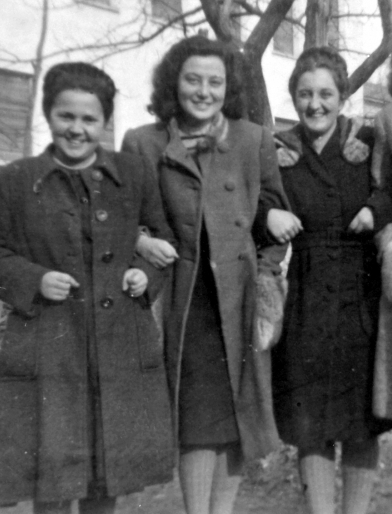 Ten years went by and it was 1954. Chiara was living with Giosi, Graziella, Natalia, Aletta, Marilen, Bruna and Eli. One day, as Chiara paused to look at them, she recalled the sentence from the book of Proverbs: “Wisdom has built her a house and set up her seven columns” (Proverbs 9:1). She was looking at the seven young women in front of her, each with her own talent, all of them united and rooted in God. These were Wisdom’s seven columns, the seven colours of the spectrum that emerge from the one light of Love. Seven interdependent aspects of love, each flowing from and into the other. Chiara entrusted Giosi with the communion of goods and the paychecks, not only the care of the poor: the red of love. To Graziella she entrusted “witness and spreading,” the orange. Natalia had been her first companion: she personified the heart of this ideal, the cry of Jesus Forsaken of love. She would carry thi secret beyond the Iron Curtain. She was the spirituality and prayer life, the yellow of the spectrum. Aletta would be remembered as the one who encouraged the members to be mindful of their health, and to form a community united in love. Chiara entrusted her with the green, Creation and physical life. To Marilen, who lived for fifteen years in the midst of a Cameroon forest, Chiara entrusted the blue: harmony and the home. Bruna was a bit of an intellectual and Chiara saw her as the one who could develop the aspect of studies: the indigo. Eli was always at Chiara’s side and helped to make sure that all the members around the world were living as one. She was entrusted with the aspect of unity and the means of communication, the violet. Some other of her first companions would also have special tasks: Dori, Ginettta, Gis, Valeria, Lia, Silvana and Palmira.
Ten years went by and it was 1954. Chiara was living with Giosi, Graziella, Natalia, Aletta, Marilen, Bruna and Eli. One day, as Chiara paused to look at them, she recalled the sentence from the book of Proverbs: “Wisdom has built her a house and set up her seven columns” (Proverbs 9:1). She was looking at the seven young women in front of her, each with her own talent, all of them united and rooted in God. These were Wisdom’s seven columns, the seven colours of the spectrum that emerge from the one light of Love. Seven interdependent aspects of love, each flowing from and into the other. Chiara entrusted Giosi with the communion of goods and the paychecks, not only the care of the poor: the red of love. To Graziella she entrusted “witness and spreading,” the orange. Natalia had been her first companion: she personified the heart of this ideal, the cry of Jesus Forsaken of love. She would carry thi secret beyond the Iron Curtain. She was the spirituality and prayer life, the yellow of the spectrum. Aletta would be remembered as the one who encouraged the members to be mindful of their health, and to form a community united in love. Chiara entrusted her with the green, Creation and physical life. To Marilen, who lived for fifteen years in the midst of a Cameroon forest, Chiara entrusted the blue: harmony and the home. Bruna was a bit of an intellectual and Chiara saw her as the one who could develop the aspect of studies: the indigo. Eli was always at Chiara’s side and helped to make sure that all the members around the world were living as one. She was entrusted with the aspect of unity and the means of communication, the violet. Some other of her first companions would also have special tasks: Dori, Ginettta, Gis, Valeria, Lia, Silvana and Palmira.

1959: Lia, Marilen, Bruna
Apr 13, 2018 | Focolare Worldwide
Syria is a martyred nation due to its civil war and constant tensions. Many people have lost their job and forced to spend all their savings in order to survive and pay for medical assistance. Doctors, teachers and other trained personnel have emigrated abroad. Those who have remained have most likely lost their homes and forced into already overcrowded neighbourhoods. The areas that are more in urgent need of help in view of future reconstruction are those dealing with financial support services, education and health care. Program activities: 1. Education and Training support in Homs and Damascus: After-school programs, tutoring, morning tea and supply of teaching materials for 220 students; 2. EHIS School for the Deaf in Aleppo: Lessons in the classroom and extra-curricular activities for 75 children; 3. Professional course in Aleppo: Traditional Syrian crafts; 4. Social and health care in Homs and Kafarbo: Access to medical care for cancer patients (chemotherapy and other treatments), financial assistance for surgical procedures, support for patients suffering from kidney failure, financial support for other medical services (radiology, blood tests etc) and counselling; 5. Family income support in Kafarbo, Homs, Aleppo and Damascus: Monthly financial subsidies for food, rent, home repairs, medical assistance. The carrying out of the activities guarantees employment for about 70 people, including teachers, social workers, trainers and assistants and involves about 50 volunteers. Places Kafarbo – Homs – Aleppo – Damascus Beneficiaries 200 families for income support 114 men and women for medical assistance 295 young people for assistance with education and training Costs of the program Total cost: € 293.138,33 Total contributions required by AMU: € 241.586,20 To support the program, please send donations to: Azione per un Mondo Unito ONLUS (AMU) Bank: Banca Popolare Etica IBAN: IT58 S050 1803 2000 0001 1204 344 SWIFT/BIC code: CCRTIT2T Azione per Famiglie Nuove ONLUS (AFN) Bank: Banca Prossima IBAN:IT55 K033 5901 6001 0000 0001 060 SWIFT/BIC code: BCITITMX Description: Emergenza Syria Program Donations made out to Emergency Syria on either bank account will be administered jointly by AMU & AFN
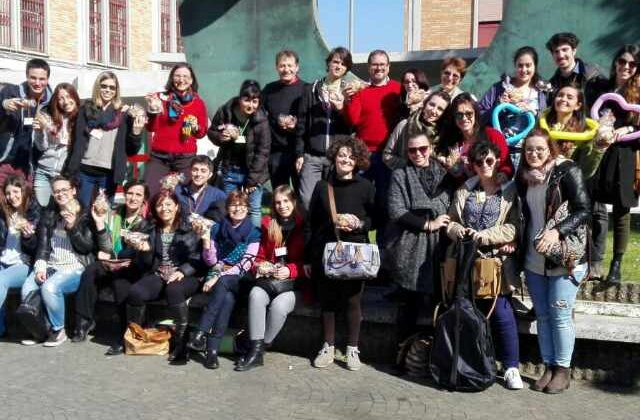
Apr 12, 2018 | Focolare Worldwide
 “For nearly three years we Young People For A United World, here in Rome, have been working with the prison adminstration and the G9 Committee, a group of eight prisoners from an un-named department of the prison of Rebibbia, who, although they don’t have children of their own, have been engaged in promoting opportunities for other prisoners to meet with their families. Raffaele Natalucci and another twenty-nine young people from Rome share their story. “Three times a year we set up stands where parents and children can spend some time together, playing and colouring with their little ones. During the organized events in the grassy areas, the internal courtyard of the prison, nearly three-hundred people are able to gather, which include inmates and their families, and numerous volunteers from the local area. During one of those events a detainee shared his experience with us: “Being deprived of your freedom, estranges you from reality. Staying in a cell, between four walls, one’s horizon also begins to shrink. Those that had benefited from special permits said that it was difficult to look far into the horizon. The opportunity to do jobs inside the prison means a lot to me. Before, I spent my energy on illegal activity, but that turned out to be like eating an ice-cream cone that was melting in the sun. But to work at organizing sport events or projects that benefit the inmates is a hundred times better than any salary.” Raffaele continues: “As Young People For Unity, we’re having a very powerful human experience: the order from the prison guards to leave every piece of personal property behind resounds, every time, like an invitation to also abandon every prejudice, going beyond the barriers between the outside world and the prison world, to build authentic relationships with the people in jail, to the point that they now refer to us as the “External Committee”. We’ve launched a “Project on Legality” with a series of thematic gatherings outside the prison. In full sync with the instructors, inmates and experts, we’ve chosen to explore several topics, such as interpersonal relationships, integration among cultures, a legality of “us”, the rediscovery of one’s attitudes and re-insertion into professional life.” On Father’s Day, March 19th, we invited psychologist, Ezio Aceti, to speak on parenthood, to some seventy inmates in the prison theatre. The presenation was focused on the needs and expectations of the child. “Take note of the other person’s thoughts, talk honestly about oneself, show a positive image,” he explained. “These are the necessary prerequisites so that the encounter between detainies and their children will bear fruit.” During the roundtable conference, one detainee asked: “What can a father with a life sentence say to his daughter?” “That her father made a mistake, but is doing all he can,” was the answer. “If his daughter finds that integrity and the courage to get up again, that will be the image she has of her father.” “Parenthood is keeping a bond going. You must transmit a feeling of belonging to your children. Then they will have a positive experience and will remember their father who is in prison.” Lastly, the psychologist strongly encouraged the detainees: “Raising a child does not mean not making mistakes, but putting everything into it in spite of the mistakes. That will teach your children tolerance. You can be good fathers even if you’ve made mistakes. Deep down all of us feel discouraged, but there’s another voice in our hearts that tells us: Get up, begin again. It doesn’t matter how many times you’ve gone wrong, but how many times you’ve got up again. The miracle is that by always getting up again, a change will take place.”
“For nearly three years we Young People For A United World, here in Rome, have been working with the prison adminstration and the G9 Committee, a group of eight prisoners from an un-named department of the prison of Rebibbia, who, although they don’t have children of their own, have been engaged in promoting opportunities for other prisoners to meet with their families. Raffaele Natalucci and another twenty-nine young people from Rome share their story. “Three times a year we set up stands where parents and children can spend some time together, playing and colouring with their little ones. During the organized events in the grassy areas, the internal courtyard of the prison, nearly three-hundred people are able to gather, which include inmates and their families, and numerous volunteers from the local area. During one of those events a detainee shared his experience with us: “Being deprived of your freedom, estranges you from reality. Staying in a cell, between four walls, one’s horizon also begins to shrink. Those that had benefited from special permits said that it was difficult to look far into the horizon. The opportunity to do jobs inside the prison means a lot to me. Before, I spent my energy on illegal activity, but that turned out to be like eating an ice-cream cone that was melting in the sun. But to work at organizing sport events or projects that benefit the inmates is a hundred times better than any salary.” Raffaele continues: “As Young People For Unity, we’re having a very powerful human experience: the order from the prison guards to leave every piece of personal property behind resounds, every time, like an invitation to also abandon every prejudice, going beyond the barriers between the outside world and the prison world, to build authentic relationships with the people in jail, to the point that they now refer to us as the “External Committee”. We’ve launched a “Project on Legality” with a series of thematic gatherings outside the prison. In full sync with the instructors, inmates and experts, we’ve chosen to explore several topics, such as interpersonal relationships, integration among cultures, a legality of “us”, the rediscovery of one’s attitudes and re-insertion into professional life.” On Father’s Day, March 19th, we invited psychologist, Ezio Aceti, to speak on parenthood, to some seventy inmates in the prison theatre. The presenation was focused on the needs and expectations of the child. “Take note of the other person’s thoughts, talk honestly about oneself, show a positive image,” he explained. “These are the necessary prerequisites so that the encounter between detainies and their children will bear fruit.” During the roundtable conference, one detainee asked: “What can a father with a life sentence say to his daughter?” “That her father made a mistake, but is doing all he can,” was the answer. “If his daughter finds that integrity and the courage to get up again, that will be the image she has of her father.” “Parenthood is keeping a bond going. You must transmit a feeling of belonging to your children. Then they will have a positive experience and will remember their father who is in prison.” Lastly, the psychologist strongly encouraged the detainees: “Raising a child does not mean not making mistakes, but putting everything into it in spite of the mistakes. That will teach your children tolerance. You can be good fathers even if you’ve made mistakes. Deep down all of us feel discouraged, but there’s another voice in our hearts that tells us: Get up, begin again. It doesn’t matter how many times you’ve gone wrong, but how many times you’ve got up again. The miracle is that by always getting up again, a change will take place.”
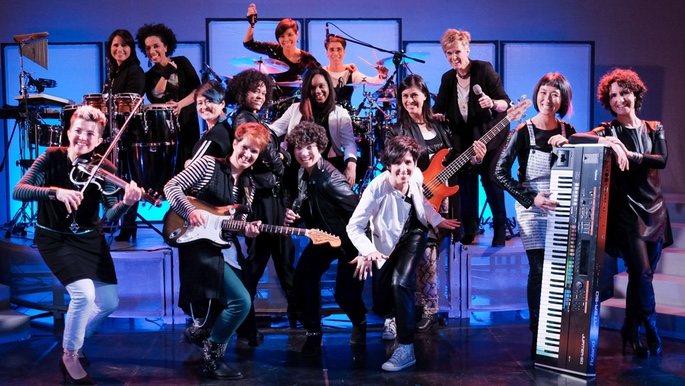
Apr 12, 2018 | Non categorizzato
 Dates: May 12th: Workshop with young people and final performance May 13th: Concert: “On the Other Side” At 9:00 p.m. GenVerde Tours
Dates: May 12th: Workshop with young people and final performance May 13th: Concert: “On the Other Side” At 9:00 p.m. GenVerde Tours
Apr 12, 2018 | Non categorizzato
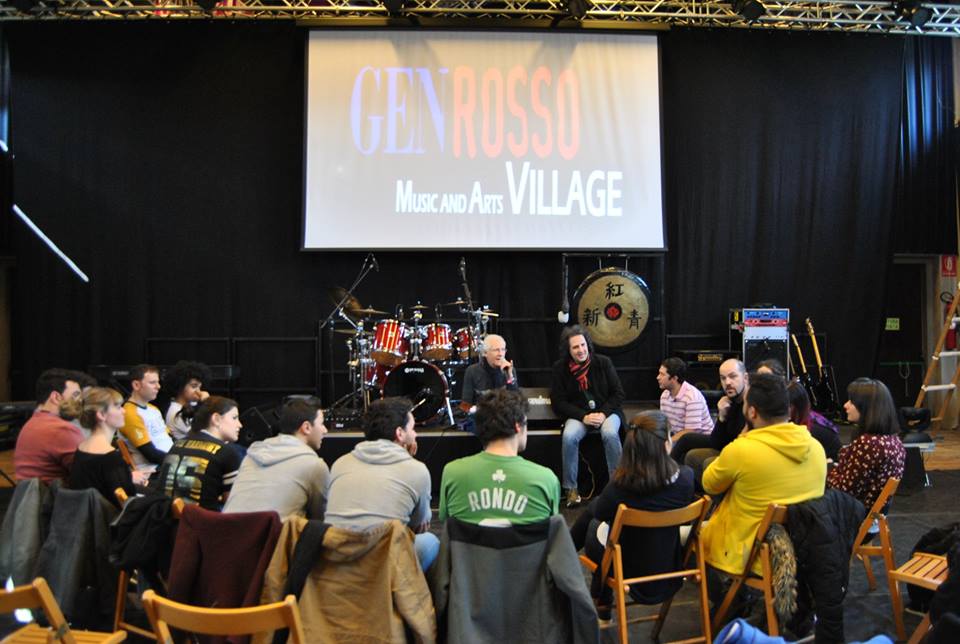
Apr 11, 2018 | Non categorizzato
 The GEN ROSSO (INTERNATIONAL PERFORMING ARTS GROUP) is presenting the 1st edition of the Gen Rosso Music and Arts Village, a residential in-depth artistic experience with the sharing of values in the light of the charism of unity. The project addresses young professionals and students preferably from 18 to 30 years of age, in disciplines such as music, dance, singing and theatre. The didactic method is designed and handled by Gen Rosso tutors having the qualified artistic capacities and experience. The program will include the study of specific themes. Exchange of experiences, dialogue sessions and practical labs will be exhibited in a final performance. The evening sessions will be enriched with interesting artistic contributions. The first edition of the Village will take place from 25 March (arrivals in the afternoon) to 1 April 2018. A participation certificate will be issued at the conclusion. Gen Rosso, through the Village secretariat, is at everyone’s disposal for further information and all the documentation needed for enrolment. (limited number). Contacts Secreteriat VILLAGE: +39 0558339821 (9.00-13.00, Italian time) Franco Gallelli cell +39 3806592166 Email secretariat VILLAGE: village@genrosso.com
The GEN ROSSO (INTERNATIONAL PERFORMING ARTS GROUP) is presenting the 1st edition of the Gen Rosso Music and Arts Village, a residential in-depth artistic experience with the sharing of values in the light of the charism of unity. The project addresses young professionals and students preferably from 18 to 30 years of age, in disciplines such as music, dance, singing and theatre. The didactic method is designed and handled by Gen Rosso tutors having the qualified artistic capacities and experience. The program will include the study of specific themes. Exchange of experiences, dialogue sessions and practical labs will be exhibited in a final performance. The evening sessions will be enriched with interesting artistic contributions. The first edition of the Village will take place from 25 March (arrivals in the afternoon) to 1 April 2018. A participation certificate will be issued at the conclusion. Gen Rosso, through the Village secretariat, is at everyone’s disposal for further information and all the documentation needed for enrolment. (limited number). Contacts Secreteriat VILLAGE: +39 0558339821 (9.00-13.00, Italian time) Franco Gallelli cell +39 3806592166 Email secretariat VILLAGE: village@genrosso.com
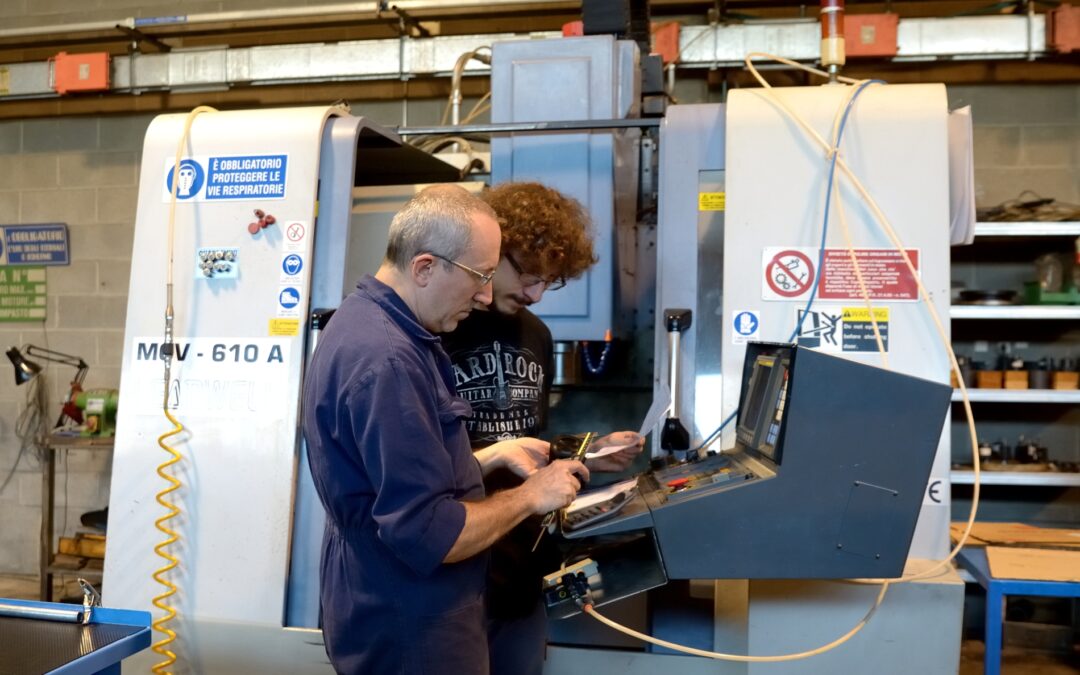
Apr 10, 2018 | Focolare Worldwide
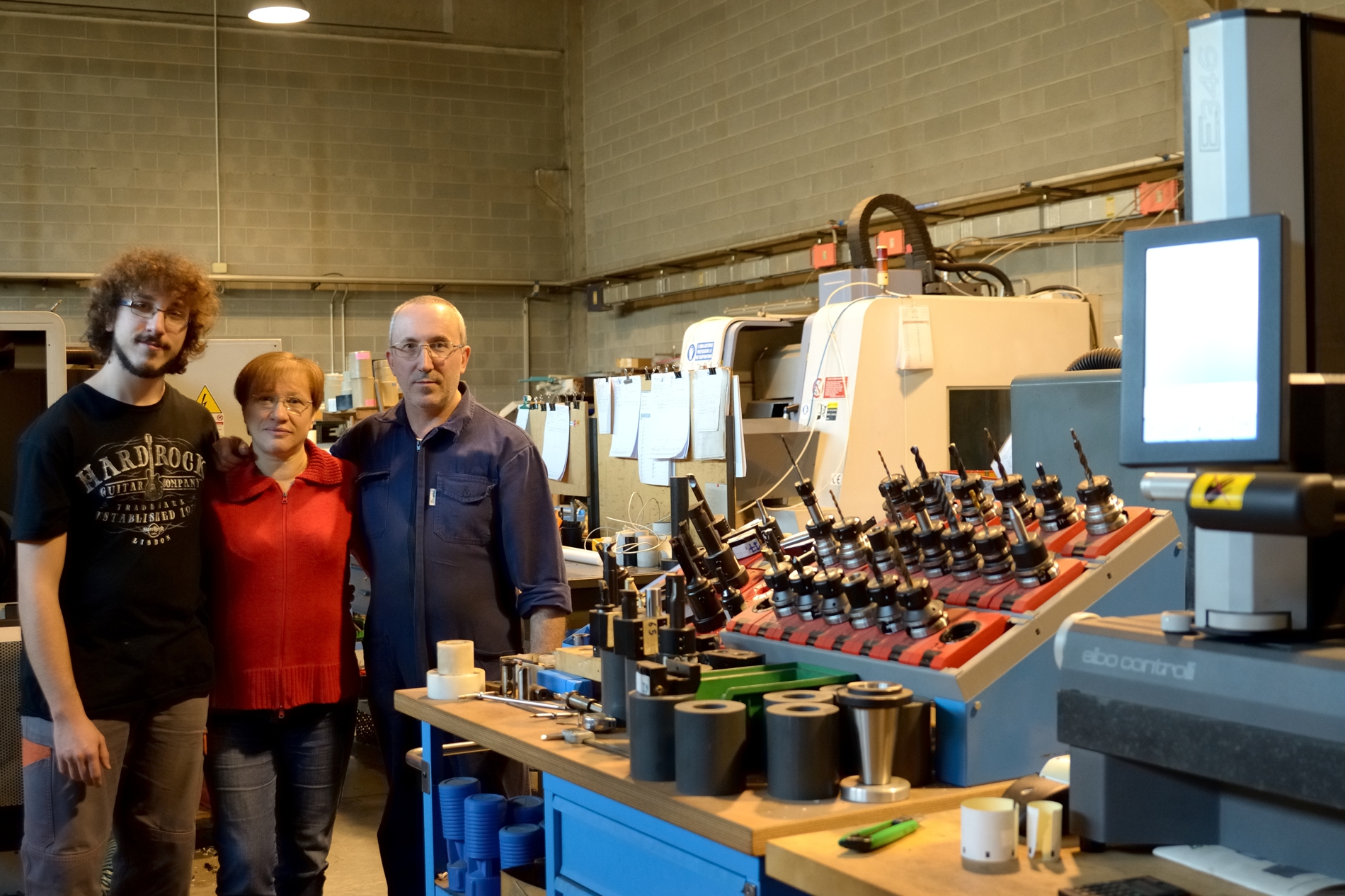 Letizia Mombelli and her husband are the owners of a small company in Brescia, northern Italy. Over the years, they have coped with many crisis and setbacks but have always made decisions in front of God, entrusted their worries to him and relied upon his providence. They began by opening up a small mechanics workshop with just a few employees. However, shortage of work, bureaucracy and their choice to avoid corruption at all costs led to them losing lots of money. Very sadly, they had to let most of their workers go and sell a lot of their equipment in order to pay their employees until they found another job. Letizia said, “We felt a terrible sense of failure but we didn’t give up. We had the support of the members of the Movement who prayed for us. We trusted in God and asked him to guide us in the decisions we were making; we tried to maintain good relationships with our clients, suppliers, representatives – with everyone who came to the workshop. We didn’t have to wait too long before God’s providence arrived.” After coping very courageously with that difficult phase of the business, there was the possibility of change: other small businesses and suppliers provided practical help and the company was able to get back on its feet. Letizia continued, “One of the best things to emerge from that time was seeing what our children learned from the experience. They grew up appreciating the simple things in life and were able to see God’s love in lots of small things. This brought us together as a family.”
Letizia Mombelli and her husband are the owners of a small company in Brescia, northern Italy. Over the years, they have coped with many crisis and setbacks but have always made decisions in front of God, entrusted their worries to him and relied upon his providence. They began by opening up a small mechanics workshop with just a few employees. However, shortage of work, bureaucracy and their choice to avoid corruption at all costs led to them losing lots of money. Very sadly, they had to let most of their workers go and sell a lot of their equipment in order to pay their employees until they found another job. Letizia said, “We felt a terrible sense of failure but we didn’t give up. We had the support of the members of the Movement who prayed for us. We trusted in God and asked him to guide us in the decisions we were making; we tried to maintain good relationships with our clients, suppliers, representatives – with everyone who came to the workshop. We didn’t have to wait too long before God’s providence arrived.” After coping very courageously with that difficult phase of the business, there was the possibility of change: other small businesses and suppliers provided practical help and the company was able to get back on its feet. Letizia continued, “One of the best things to emerge from that time was seeing what our children learned from the experience. They grew up appreciating the simple things in life and were able to see God’s love in lots of small things. This brought us together as a family.” 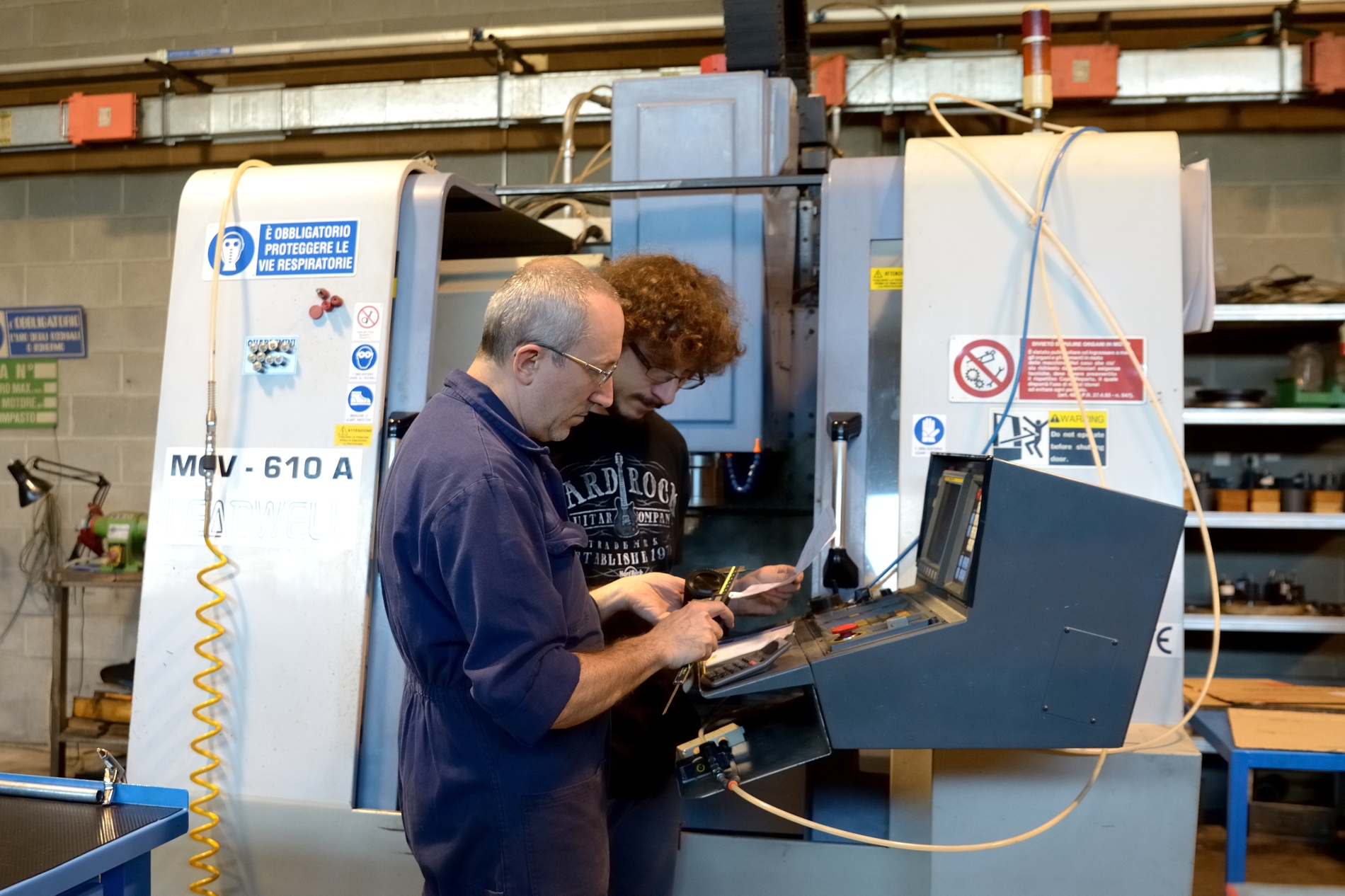 However, in 2009, Letizia’s company was hit by the global economic crisis and orders for work began to decrease significantly. Once again, the family trusted in God and orders picked up again. In 2016, the company received a very large order which guaranteed economic stability for several years. After dispatching the first consignment, Letizia discovered that their products were being used in the arms trade. Thinking of the images of despair of refugees fleeing from war torn countries, Letizia and her family decided to reject the order. “We were very apprehensive about turning down work but my husband and I were sure that it was the right thing to do. Furthermore, our son who had begun to work with us was in full agreement.” There was then yet another crisis that almost led to the closure of the company. Letizia and her family trusted in God’s providence and again work began to arrive. In fact, there were more orders than there had been for several years. “I feel as if God is walking alongside us,” Letizia confided. She then referred to the foundress of the Focolare Movement. “I am grateful to Chiara Lubich who is like a guiding light, helping us to make the right decisions, putting human beings before profit and economic security.” Chiara Favotti
However, in 2009, Letizia’s company was hit by the global economic crisis and orders for work began to decrease significantly. Once again, the family trusted in God and orders picked up again. In 2016, the company received a very large order which guaranteed economic stability for several years. After dispatching the first consignment, Letizia discovered that their products were being used in the arms trade. Thinking of the images of despair of refugees fleeing from war torn countries, Letizia and her family decided to reject the order. “We were very apprehensive about turning down work but my husband and I were sure that it was the right thing to do. Furthermore, our son who had begun to work with us was in full agreement.” There was then yet another crisis that almost led to the closure of the company. Letizia and her family trusted in God’s providence and again work began to arrive. In fact, there were more orders than there had been for several years. “I feel as if God is walking alongside us,” Letizia confided. She then referred to the foundress of the Focolare Movement. “I am grateful to Chiara Lubich who is like a guiding light, helping us to make the right decisions, putting human beings before profit and economic security.” Chiara Favotti
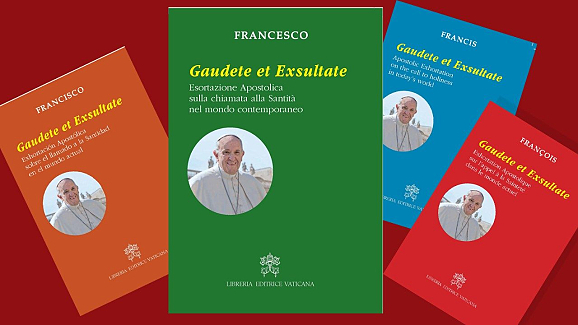
Apr 10, 2018 | Non categorizzato
 The third Apostolic Exhortation of Pope Francis on the call to sanctity in the contemporary world, “Gaudete et Exsultate” (Rejoice and be glad) was published on 9 April. Five Chapters, 44 pages: not a treatise on holiness, but an invitation to all, especially the young people, to “let the call to sanctity echo once again” indicating its risks, challenges, its opportunities.” Francis remarked – “Holiness is the nicest countenance of the Church. Also in the most varied environments outside the Catholic Church, the Spirit arouses signs of his presence that even help the disciples of Christ.” To become saints – the Pope sustained – we don’t have to copy lifestyles that may seem unreachable: “What counts is that each of the faithful discerns his own path and lets the best of himself emerge, that is, all the very personal things God has endowed him with and which does not lie in imitating something which was not conceived for him.” How can we answer this call? It’s done by tracing the path of the evangelical Beatitudes, a positive model “in the light of the Master” and a major road “against the current” with respect to the direction of the world everyone pursues. Gaudete et Exsultate
The third Apostolic Exhortation of Pope Francis on the call to sanctity in the contemporary world, “Gaudete et Exsultate” (Rejoice and be glad) was published on 9 April. Five Chapters, 44 pages: not a treatise on holiness, but an invitation to all, especially the young people, to “let the call to sanctity echo once again” indicating its risks, challenges, its opportunities.” Francis remarked – “Holiness is the nicest countenance of the Church. Also in the most varied environments outside the Catholic Church, the Spirit arouses signs of his presence that even help the disciples of Christ.” To become saints – the Pope sustained – we don’t have to copy lifestyles that may seem unreachable: “What counts is that each of the faithful discerns his own path and lets the best of himself emerge, that is, all the very personal things God has endowed him with and which does not lie in imitating something which was not conceived for him.” How can we answer this call? It’s done by tracing the path of the evangelical Beatitudes, a positive model “in the light of the Master” and a major road “against the current” with respect to the direction of the world everyone pursues. Gaudete et Exsultate
Apr 10, 2018 | Focolare Worldwide
With her reassuringly calm demeanour, mother-of-two Maria – born in Italy, married to a French man – teaches her mother tongue in a notorious neighbourhood on the outskirts of Paris, in one of those schools which finds it practically impossible to retain its staff. In fact, determination, courage and passion are all required in no small measure to be able to work in such a disadvantaged area, scarred by drug and arms trafficking, with dealers right at the school gates. The pupils come from a wide range of cultures and different nationalities. Maria reflects, “For me, it’s quite simply a matter of responding to a calling to work for equal opportunities, to propose and deliver a programme of formation that aims high, and to bring the love of Christ where it seems to be lacking.” Maria explains how coming into contact as a child with Chiara Lubich nurtured this aspiration and sustained her into adult life. “Thanks to the relationships of unity I live with those who share this same ideal, I’m able to refresh my outlook and attitude every day, whatever difficulties I face.” It was a real challenge, especially at the start, to understand how to interact constructively with the students, how to react to their verbal aggression and acts of vandalism. It soon became clear that in order to be able to help the children, it was necessary to get the families involved. In addition, the constant stream of new teaching staff needed support in order to engage effectively with such a complex situation. This kind of supportive synergy among colleagues gave an excellent example to the students. Maria continues,“From an educational perspective, I base my work on an interdisciplinary approach incorporating cultural projects. The organisation of any project requires teamwork, and our attempt as colleagues to live in the spirit of fraternity, offers a credible model to the students.” These projects often conclude with a trip to Italy, both motivating the students to learn the language and encouraging cultural exchanges with Italian youth, which can also provide an enriching experience of fraternity. “This kind of project,” relates Maria, “leads to the involvement of our pupils’ families in the life of the school, it establishes a relationship of trust in which we can seek solutions together so that no student is held back by economic problems.” In other words, Maria’s objective is to create an educational network involving families and teachers, all striving for the human and cultural development of these at-risk children. It is an approach which is already showing positive results. When Aïcha was disrupting her class, it was quietly – but firmly – explained to her how “everyone must do their part to live in harmony”. Her response was to write, “I’m sorry for how I behaved on Friday. I let myself down and it’ll not happen again. You’re a great person, you’re clever and wise. You pass true values onto your students and make us want to do well. I’ll never forget you.” The care and respect given to each child encouraged another pupil, Yanis, who was at first extremely reserved, to open up and display a hitherto unexpressed interest in art and history. The key is always the personal care and attention due to each individual with their own story and their own sensitivity. “I’ve learnt never to expect immediate results,” concludes Maria. “When a young person shows no sign of improvement, it’s important to keep on believing in them, accompanying them, not allowing yourself to be blocked by anything, but continuing to identify the positive within them and giving value to that. Every day, the challenge is to find the courage and strength to nurture hope through actions aimed at building true relationships”.
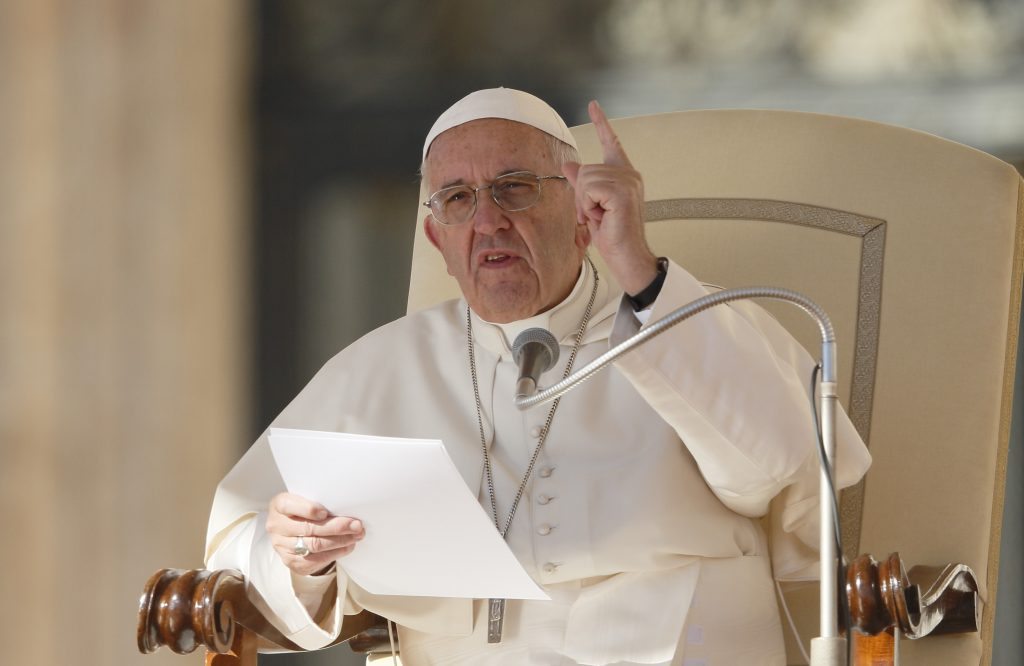
Apr 9, 2018 | Non categorizzato
 “Horrible news of bombardments continues to arrive from Syria, with dozens of victims including women and children. News of many wounded by the effects of chemical substances contained in bombs. Let us pray for the deceased, the wounded and the families that are experiencing pain and suffering. There’s no such thing as a good war and a bad war and nothing, nothing can justify the use of such tools of extermination against individuals and whole populations. Let us pray that responsible politicians and military leaders choose the other path, that of negotiation, the only way that can lead to a peace that isn’t the result of death and destruction.” These words were spoken by Pope Francis on Sunday, April 8, 2018. We join in his appeal, praying that negotiated solutions will be found to the terrible conflict that is bloodying Syria in recent days and many other places that receive little coverage in the news, which continue to produce victims in many places in the world. And we continue to work at all level promoting peace through dialogue.
“Horrible news of bombardments continues to arrive from Syria, with dozens of victims including women and children. News of many wounded by the effects of chemical substances contained in bombs. Let us pray for the deceased, the wounded and the families that are experiencing pain and suffering. There’s no such thing as a good war and a bad war and nothing, nothing can justify the use of such tools of extermination against individuals and whole populations. Let us pray that responsible politicians and military leaders choose the other path, that of negotiation, the only way that can lead to a peace that isn’t the result of death and destruction.” These words were spoken by Pope Francis on Sunday, April 8, 2018. We join in his appeal, praying that negotiated solutions will be found to the terrible conflict that is bloodying Syria in recent days and many other places that receive little coverage in the news, which continue to produce victims in many places in the world. And we continue to work at all level promoting peace through dialogue.
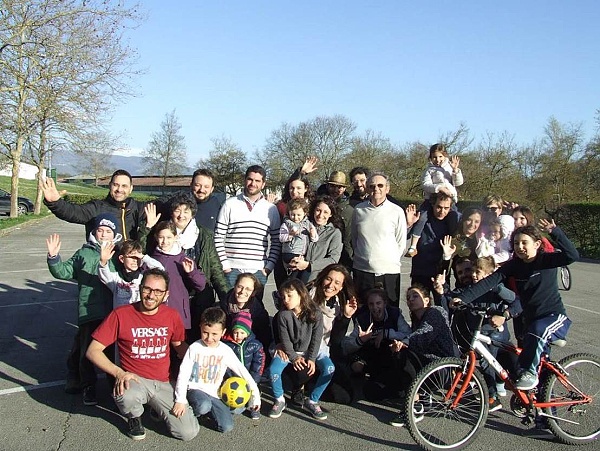
Apr 9, 2018 | Focolare Worldwide
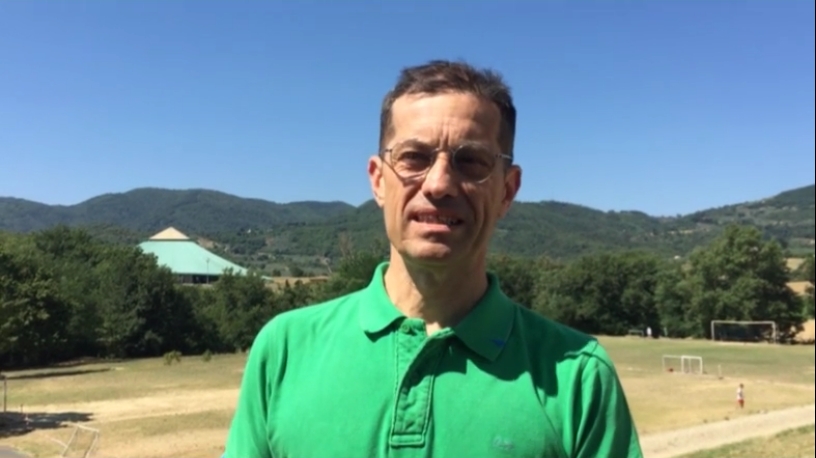 How did Loppiano take the news of the Pope’s visit? “Just a minute after the President, Maria Voce had spread the news on our social media pages and among the groups of inhabitants, there was a storm of messages expressing joy and wonder.” What does this event mean for you, as an inhabitant? “Even John Paul II was supposed to come here in the year 2000. The visit was cancelled four days before, due to a sudden change of programme. The desire for the Pope’s visit remained in our hearts then, and the same desire is present also today among the inhabitants. How would you describe the town to one who has no idea of what Loppiano is? “It is one of the places where one can more deeply experience the charism of unity that Chiara Lubich received from God, and from which the Focolare Movement was born and developed: that unity which is reached by building fraternal relationships, and living the testament of Jesus, “That all may be one.” About 1,000 people from 65 countries live in Loppiano, with various cultures, religions, and educational and social conditions. Here they learn first of all to become a community. What unites them is the desire to live the law on which the town is based: mutual love. This makes Loppiano a place of brotherhood.”
How did Loppiano take the news of the Pope’s visit? “Just a minute after the President, Maria Voce had spread the news on our social media pages and among the groups of inhabitants, there was a storm of messages expressing joy and wonder.” What does this event mean for you, as an inhabitant? “Even John Paul II was supposed to come here in the year 2000. The visit was cancelled four days before, due to a sudden change of programme. The desire for the Pope’s visit remained in our hearts then, and the same desire is present also today among the inhabitants. How would you describe the town to one who has no idea of what Loppiano is? “It is one of the places where one can more deeply experience the charism of unity that Chiara Lubich received from God, and from which the Focolare Movement was born and developed: that unity which is reached by building fraternal relationships, and living the testament of Jesus, “That all may be one.” About 1,000 people from 65 countries live in Loppiano, with various cultures, religions, and educational and social conditions. Here they learn first of all to become a community. What unites them is the desire to live the law on which the town is based: mutual love. This makes Loppiano a place of brotherhood.”  What’s life like in the town? “There are various economic activities, 11 training schools, a university institute, a big church that will host the Pope, many houses and cultivated fields. The inhabitants study, work, socialize, and live the normal life of all the towns, only that they try to do so by living the law of mutual love.” The Pope will arrive in Loppiano after Nomadelfia. What relationship is there between the two towns? “They have a lot in common, though with completely different histories and charisms: both are places of brotherhood that look to the lowly people and have the Gospel as their law. There have been various occasions for encounters, even recently. So we are happy that the Pope will land here with his heart full of what he will receive in Nomadelfia. He will be welcomed with the same love and enthusiasm.” Wherever the Pope goes, the spotlight of the world media turns on: how will the choice to visit Loppiano be interpreted? “I think that behind this desire is firstly the love for the charism of unity, gift which God has given us through Chiara Lubich. Bergoglio had met the Movement in Argentina, but even more closely as Pope. Loppiano is the place where this charism is most visible.” How are you preparing for the visit? “What Maria Voce said has become an imperative for us. In these 100 days we have undertaken the commitment to intensify the life of love and unity rooted in the Gospel, so that the Pope may find that “Where two or more united in my name ” (Matthew 18,20),” the presence of Jesus in our midst, is a reality. The Pope will stop to pray in the Church of Maria Theotokos, where there is a chapel dedicated to Christians of other confessions: what does this place represent? “Precisely Chiara wanted the Church to be in the geographic centre of Loppiano, so it would become the entire town’s point of unity. It is the place where we inhabitants meet daily to pray, but it is a reference point for the entire territory. It is the city’s seal.” Is it also a way of underlining the centrality of the figure of Mary in the Movement? “Certainly. Not by chance the Church was dedicated to Maria Theotokos, Mary Mother of God, to underline the strongly Marian feature of the charism and of the Focolare movement. And precisely because Mary is the Mother of God and thus of humanity, the Church is open also to people of other Christian confessions, and other religions and beliefs. Inside there are various points where each one can pray, feel at home and contemplate.” The Pope’s visit will take place on the 10th anniversary of the passing of Chiara Lubich. A coincidence? “I think we can consider this visit as a gift of God, a caress, and a sign of His love for the Work of Mary. Then we shall see what the Pope will want to say to us.”
What’s life like in the town? “There are various economic activities, 11 training schools, a university institute, a big church that will host the Pope, many houses and cultivated fields. The inhabitants study, work, socialize, and live the normal life of all the towns, only that they try to do so by living the law of mutual love.” The Pope will arrive in Loppiano after Nomadelfia. What relationship is there between the two towns? “They have a lot in common, though with completely different histories and charisms: both are places of brotherhood that look to the lowly people and have the Gospel as their law. There have been various occasions for encounters, even recently. So we are happy that the Pope will land here with his heart full of what he will receive in Nomadelfia. He will be welcomed with the same love and enthusiasm.” Wherever the Pope goes, the spotlight of the world media turns on: how will the choice to visit Loppiano be interpreted? “I think that behind this desire is firstly the love for the charism of unity, gift which God has given us through Chiara Lubich. Bergoglio had met the Movement in Argentina, but even more closely as Pope. Loppiano is the place where this charism is most visible.” How are you preparing for the visit? “What Maria Voce said has become an imperative for us. In these 100 days we have undertaken the commitment to intensify the life of love and unity rooted in the Gospel, so that the Pope may find that “Where two or more united in my name ” (Matthew 18,20),” the presence of Jesus in our midst, is a reality. The Pope will stop to pray in the Church of Maria Theotokos, where there is a chapel dedicated to Christians of other confessions: what does this place represent? “Precisely Chiara wanted the Church to be in the geographic centre of Loppiano, so it would become the entire town’s point of unity. It is the place where we inhabitants meet daily to pray, but it is a reference point for the entire territory. It is the city’s seal.” Is it also a way of underlining the centrality of the figure of Mary in the Movement? “Certainly. Not by chance the Church was dedicated to Maria Theotokos, Mary Mother of God, to underline the strongly Marian feature of the charism and of the Focolare movement. And precisely because Mary is the Mother of God and thus of humanity, the Church is open also to people of other Christian confessions, and other religions and beliefs. Inside there are various points where each one can pray, feel at home and contemplate.” The Pope’s visit will take place on the 10th anniversary of the passing of Chiara Lubich. A coincidence? “I think we can consider this visit as a gift of God, a caress, and a sign of His love for the Work of Mary. Then we shall see what the Pope will want to say to us.”
Apr 8, 2018 | Focolare Worldwide
|
Christos anesti! Alithos anesti! Христос воскресе!Christ is Risen! Indeed He is risen! Khrishti unjal! Vertet unjal! Hristos voskrese! Vo istina voskrese! Khrystos uvaskros! Sapraudy uvaskros! Le Christ est ressuscité! En verité il est ressuscité! Kriste ahzdkhah! Chezdmaridet! Christus ist erstanden! Er ist wahrhaftig erstanden! Cristo è risorto! Veramente è risorto! Cristos a inviat! Adevarat a inviat! Khristos voskrese! Voistinu voskrese! Cristos vaskres! Vaistinu vaskres!
Christ is risen from the dead, trampling down death by death, and on those in the tombs bestowing life!Христос воскресе из мертвых, смертию смерть поправ, и сущим во гробех живот даровав!
|
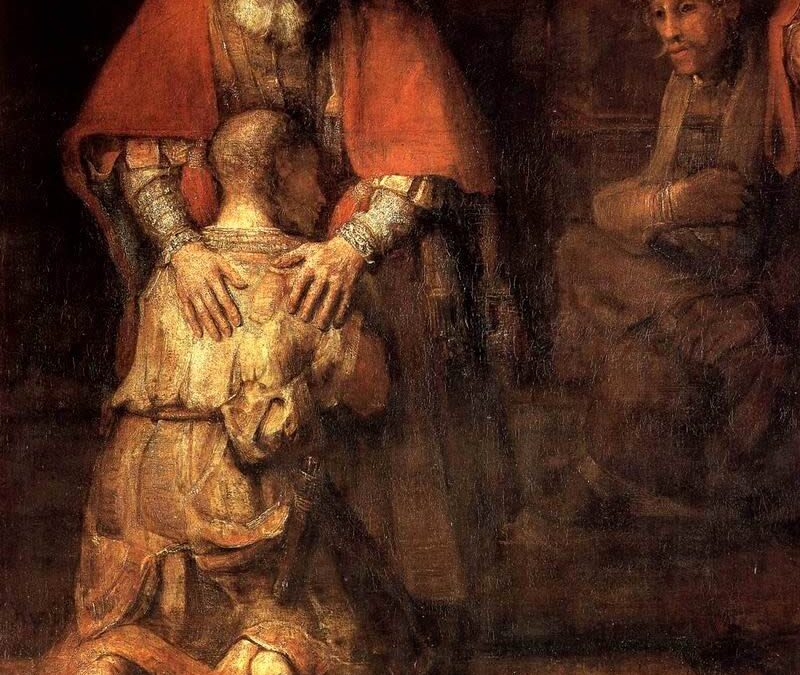
Apr 7, 2018 | Non categorizzato
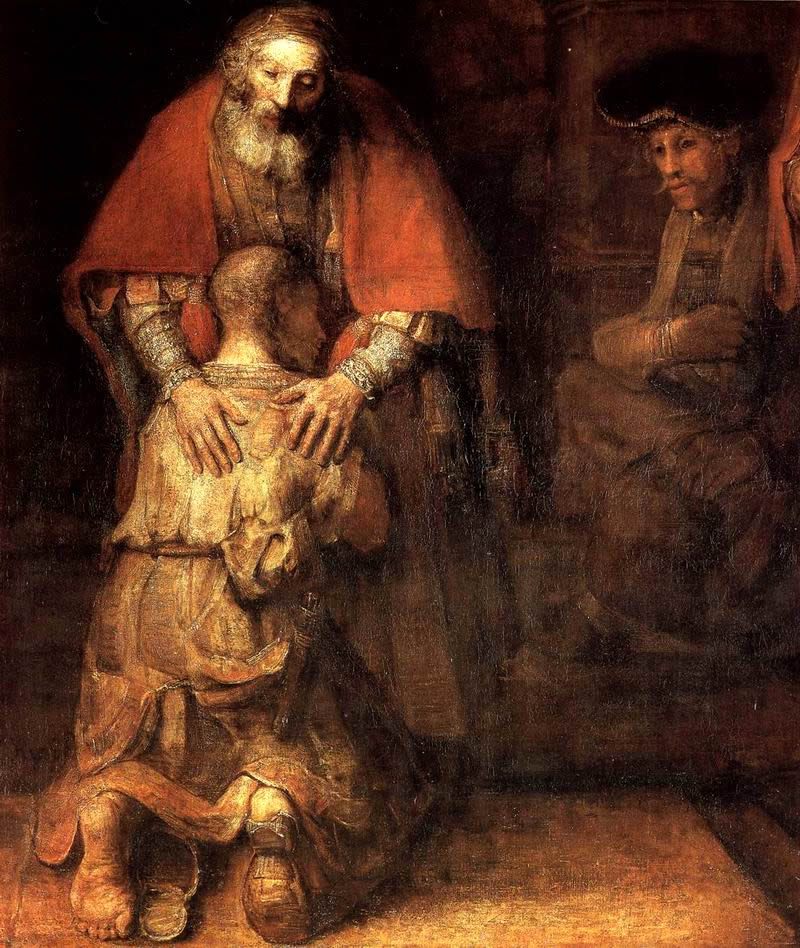
“The Return of the Prodigal Son” by Rembrandt
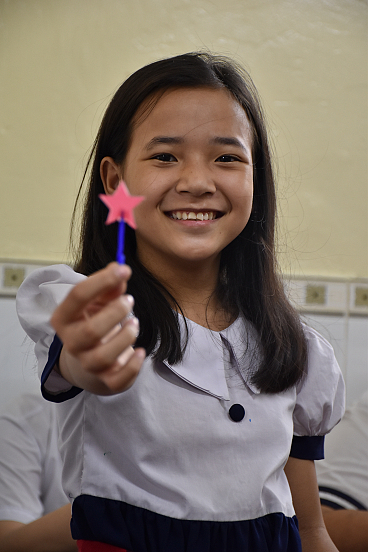
Apr 7, 2018 | Focolare Worldwide
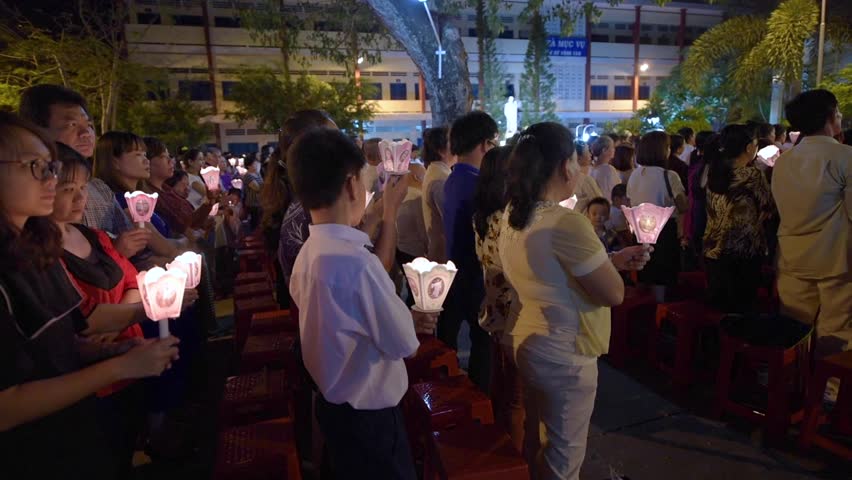 Easter is now over: today is Easter Monday and it’s a normal working day. It’s really hot and the rain is menacing the skies. It is only the Christians who are feasting. Here and there one can hear the cheering and the cries of Alleluia seeping out from the homes. And yet I’m in a Communist country. But as one goes out of the church, the streets are filled with the incredible sound of motorbikes blocking the traffic. The police in front of the cathedral have to direct the traffic. In order to take part in the Easter Triduum, one has to arrive 30 minutes before to find a place. In church I leave the bag on the bench and nobody touches it. I look at the people: many children, young people, couples and the elderly with their sober but smiling faces. I think of Europe, of the half-empty churches even on feast days. In these parts, even at 5 o’clock in the morning of any day, children, even small ones, together with the adults are in the first rows to sing. Here, everyone knows the prayers and the hymns by heart. In Saigon every corner is swarmed in a disorderly and nearly savage life. Yet, there is a lot of faith, perhaps as in no other Asian city. Because here faith comes at a cost. Everything costs in Vietnam. Some time ago I made a journey by bus, five and a half hours with a throng of people and in the heat. At a certain point quintals of Indian maize were loaded onto the bus among the travellers, dragged underfoot into the baggage compartment. The people started to scream whilst the driver and his assistant shouted at them to shut up. A lady near me who felt embarrassed at seeing me in that confusion, told me: “Life here is hard. Don’t forget it if you want to live here”. I don’t know that lady’s name and perhaps I’ll never see her again. But those words opened a new dimension within me. Life, theirs as well as mine, has to pass through pain, weariness, suffering, to then flow with joy. I understood her this way. From that day everything in me was simplified. Like everybody, I experience joy, but also pain and fatigue. I am one of them. I’m not even considered special because I’m a foreigner, but just one among many foreigners.
Easter is now over: today is Easter Monday and it’s a normal working day. It’s really hot and the rain is menacing the skies. It is only the Christians who are feasting. Here and there one can hear the cheering and the cries of Alleluia seeping out from the homes. And yet I’m in a Communist country. But as one goes out of the church, the streets are filled with the incredible sound of motorbikes blocking the traffic. The police in front of the cathedral have to direct the traffic. In order to take part in the Easter Triduum, one has to arrive 30 minutes before to find a place. In church I leave the bag on the bench and nobody touches it. I look at the people: many children, young people, couples and the elderly with their sober but smiling faces. I think of Europe, of the half-empty churches even on feast days. In these parts, even at 5 o’clock in the morning of any day, children, even small ones, together with the adults are in the first rows to sing. Here, everyone knows the prayers and the hymns by heart. In Saigon every corner is swarmed in a disorderly and nearly savage life. Yet, there is a lot of faith, perhaps as in no other Asian city. Because here faith comes at a cost. Everything costs in Vietnam. Some time ago I made a journey by bus, five and a half hours with a throng of people and in the heat. At a certain point quintals of Indian maize were loaded onto the bus among the travellers, dragged underfoot into the baggage compartment. The people started to scream whilst the driver and his assistant shouted at them to shut up. A lady near me who felt embarrassed at seeing me in that confusion, told me: “Life here is hard. Don’t forget it if you want to live here”. I don’t know that lady’s name and perhaps I’ll never see her again. But those words opened a new dimension within me. Life, theirs as well as mine, has to pass through pain, weariness, suffering, to then flow with joy. I understood her this way. From that day everything in me was simplified. Like everybody, I experience joy, but also pain and fatigue. I am one of them. I’m not even considered special because I’m a foreigner, but just one among many foreigners.  The story of that Man who hung from a cross, similar to those of many people I meet each day, reminds me of the words of that lady. I can find it in the poor who have nothing, in the sick man with a tumour, with bones jutting out from his ribs, who has no money to cure himself. Or in that lady, Giau, 64, who though poor, adopted a Down Syndrome child who had been literally thrown out by the parents. And yet, it’s Easter. Even for the Rohingya refugees, living between Myanmar and Bangladesh. It’s Easter in North Korea which seeks peace after having fired missiles. It’s Easter amongst the allied troops who are preparing for the umpteenth drill. It’s Easter for the children of Xang Cut, in the delta zone of Mikong, where the water is still infested through Agent Orange, thrown by the allies 40 years ago. And it’s Easter for the children of Saigon, gathered from the streets and given education by the teachers of Pho. They will have something to eat thanks to their heroic love. Even here, in the midst of many challenges, dangers, widespread pollution and an overwhelming sense of hopelessness, someone continues to smile, because they are loved and helped by a friendly hand. This is Easter: taking care of others, relieving their pain, sharing their tears. The world, the other, belongs to me. And my happiness passes through that of others, of many others.
The story of that Man who hung from a cross, similar to those of many people I meet each day, reminds me of the words of that lady. I can find it in the poor who have nothing, in the sick man with a tumour, with bones jutting out from his ribs, who has no money to cure himself. Or in that lady, Giau, 64, who though poor, adopted a Down Syndrome child who had been literally thrown out by the parents. And yet, it’s Easter. Even for the Rohingya refugees, living between Myanmar and Bangladesh. It’s Easter in North Korea which seeks peace after having fired missiles. It’s Easter amongst the allied troops who are preparing for the umpteenth drill. It’s Easter for the children of Xang Cut, in the delta zone of Mikong, where the water is still infested through Agent Orange, thrown by the allies 40 years ago. And it’s Easter for the children of Saigon, gathered from the streets and given education by the teachers of Pho. They will have something to eat thanks to their heroic love. Even here, in the midst of many challenges, dangers, widespread pollution and an overwhelming sense of hopelessness, someone continues to smile, because they are loved and helped by a friendly hand. This is Easter: taking care of others, relieving their pain, sharing their tears. The world, the other, belongs to me. And my happiness passes through that of others, of many others.
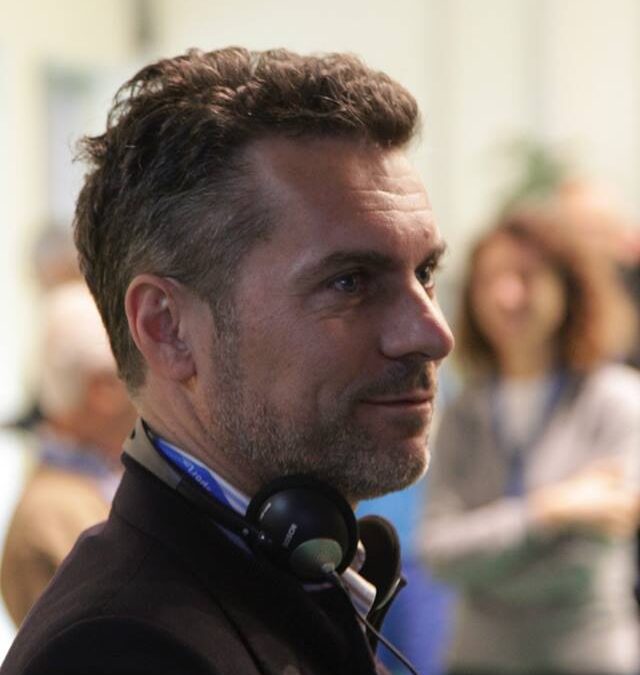
Apr 6, 2018 | Non categorizzato
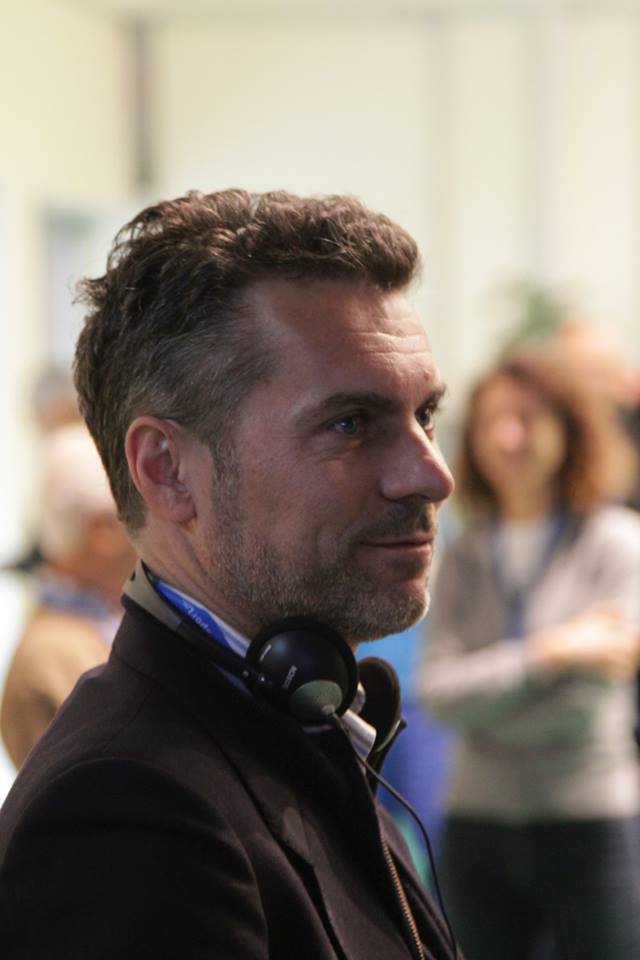 Sports and peace have been a winning combination since ancient times, when an “Olympic truce” was put in force during the games that were celebrated in honor of Zeus. All public and private hostilities were put on hold in order to safeguard the athletes and spectators who had to cross enemy territories in order to reach Olympia. The International Day of Sport that will be celebrated April 6 will be held on the same day that, in 1896, saw the reopening of the Olympic Games for the modern era, once again in Greece. This emphasizes the value and relevance of this year’s Day of Sport. Paolo Cipolli is the director of Sportmeet, an international network of athletes and sports professionals. Since 2002 it has been dedicated to and contributed toward developing a sports culture that is focused on peace, development and universal fraternity. “Sport, which some sociologists have defined as an ‘imitation of war’ or ‘war without shooting,’ can still represent an element of reconciliation despite its combative content,” says Cipolli. “Through a process of catharsis, purification through conflict and the element of competition, controlled by the rules of the game, sports holds great potential for relationships.” The recent Winter Games are a great example. “What happened at PyeongChang was truly surprising,” says Cipolli. “At first, the choice of a venue near the border of the two Koreas, especially during a time when there were escalating tensions, seemed ill-fated. And yet, the miracle of sport occurred, and the Olympics showed themselves to be not only an extraordinary chance to change the expectations of a breakdown, but also a surprising opportunity to bring the two countries closer. It was a miracle that threw a curve ball at international politics,” he says. “This has happened before. Many times in recent history, sports became an opportunity to ease tensions. I remember that famous game of ping pong between China and the United States in 1971.” Sportmeet, which began within the Focolare Movement, promotes values of holistic personal growth and peace within the world of sports. What are its goals? “What moves us is the drive to bring our spiritual legacy, Chiara Lubich’s ideal of unity, into this area. We support the positive experiences that exist, recognizing everything good that the history of sport has brought about to date. We also hope to grow awareness that sports has great possibilities for developing fraternity. “Recently we had the opportunity to promote and participate in the first Via Pacis Half Marathon in Rome. We will continue to work in partnership with various religious communities and sports institutions for the next marathon, to be held on September 23.” The reality of limitations runs through all our lives, whether individually or collectively. It is a mold we all come through, with disadvantages, difficulties and social hurdles, both physical and psychological. How does sports address this? “The experience of sports contributes to an understanding of limitations that goes beyond its specific area of expertise. By its very nature, sports is a contest with limitations. Promoting participation prepares us for differences, opening pathways to integrate and overcome any political, religious, ethnic or social barriers.” What’s next? “We are organizing an international conference around these themes, to be held April 20–22 in Rome. It will be open to those working in the field of sports and others, in order to learn about and promote good practices. “On the main day, April 21, there will be an ‘Earth Village’ at Villa Borghese, where we will get together with participants from the Eco-One conference entitled ‘Nature breaks limits.’ We’ll take an interdisciplinary approach to limitations. “It will be a roaming conference between the Corviale neighborhood, which is on the geographic and social margins of the city, and central Rome. It will be a chance to see the difficulty, vulnerability and the ‘margins’ and realize that they are limits to recognize. “They make us more human.” Chiara Favotti
Sports and peace have been a winning combination since ancient times, when an “Olympic truce” was put in force during the games that were celebrated in honor of Zeus. All public and private hostilities were put on hold in order to safeguard the athletes and spectators who had to cross enemy territories in order to reach Olympia. The International Day of Sport that will be celebrated April 6 will be held on the same day that, in 1896, saw the reopening of the Olympic Games for the modern era, once again in Greece. This emphasizes the value and relevance of this year’s Day of Sport. Paolo Cipolli is the director of Sportmeet, an international network of athletes and sports professionals. Since 2002 it has been dedicated to and contributed toward developing a sports culture that is focused on peace, development and universal fraternity. “Sport, which some sociologists have defined as an ‘imitation of war’ or ‘war without shooting,’ can still represent an element of reconciliation despite its combative content,” says Cipolli. “Through a process of catharsis, purification through conflict and the element of competition, controlled by the rules of the game, sports holds great potential for relationships.” The recent Winter Games are a great example. “What happened at PyeongChang was truly surprising,” says Cipolli. “At first, the choice of a venue near the border of the two Koreas, especially during a time when there were escalating tensions, seemed ill-fated. And yet, the miracle of sport occurred, and the Olympics showed themselves to be not only an extraordinary chance to change the expectations of a breakdown, but also a surprising opportunity to bring the two countries closer. It was a miracle that threw a curve ball at international politics,” he says. “This has happened before. Many times in recent history, sports became an opportunity to ease tensions. I remember that famous game of ping pong between China and the United States in 1971.” Sportmeet, which began within the Focolare Movement, promotes values of holistic personal growth and peace within the world of sports. What are its goals? “What moves us is the drive to bring our spiritual legacy, Chiara Lubich’s ideal of unity, into this area. We support the positive experiences that exist, recognizing everything good that the history of sport has brought about to date. We also hope to grow awareness that sports has great possibilities for developing fraternity. “Recently we had the opportunity to promote and participate in the first Via Pacis Half Marathon in Rome. We will continue to work in partnership with various religious communities and sports institutions for the next marathon, to be held on September 23.” The reality of limitations runs through all our lives, whether individually or collectively. It is a mold we all come through, with disadvantages, difficulties and social hurdles, both physical and psychological. How does sports address this? “The experience of sports contributes to an understanding of limitations that goes beyond its specific area of expertise. By its very nature, sports is a contest with limitations. Promoting participation prepares us for differences, opening pathways to integrate and overcome any political, religious, ethnic or social barriers.” What’s next? “We are organizing an international conference around these themes, to be held April 20–22 in Rome. It will be open to those working in the field of sports and others, in order to learn about and promote good practices. “On the main day, April 21, there will be an ‘Earth Village’ at Villa Borghese, where we will get together with participants from the Eco-One conference entitled ‘Nature breaks limits.’ We’ll take an interdisciplinary approach to limitations. “It will be a roaming conference between the Corviale neighborhood, which is on the geographic and social margins of the city, and central Rome. It will be a chance to see the difficulty, vulnerability and the ‘margins’ and realize that they are limits to recognize. “They make us more human.” Chiara Favotti
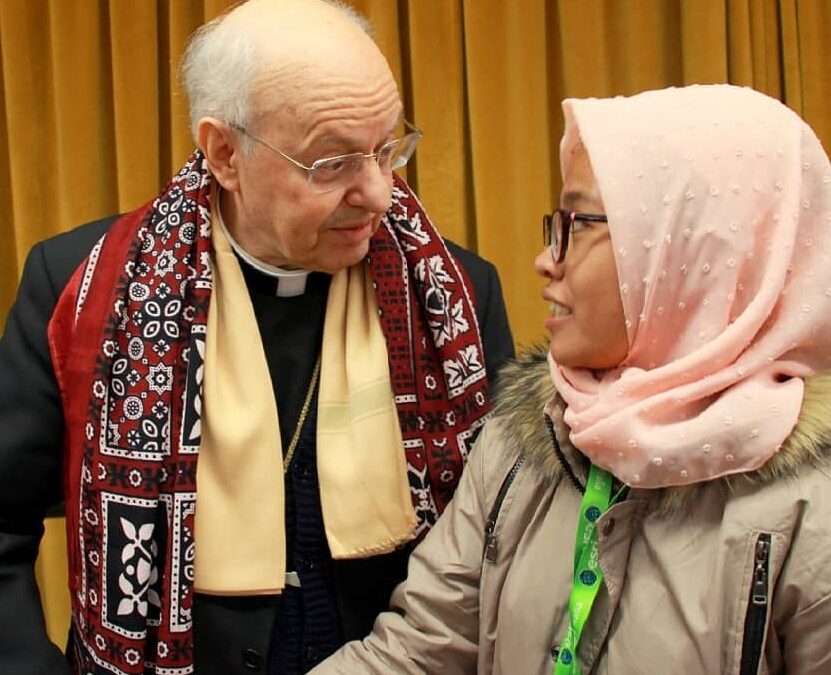
Apr 4, 2018 | Non categorizzato
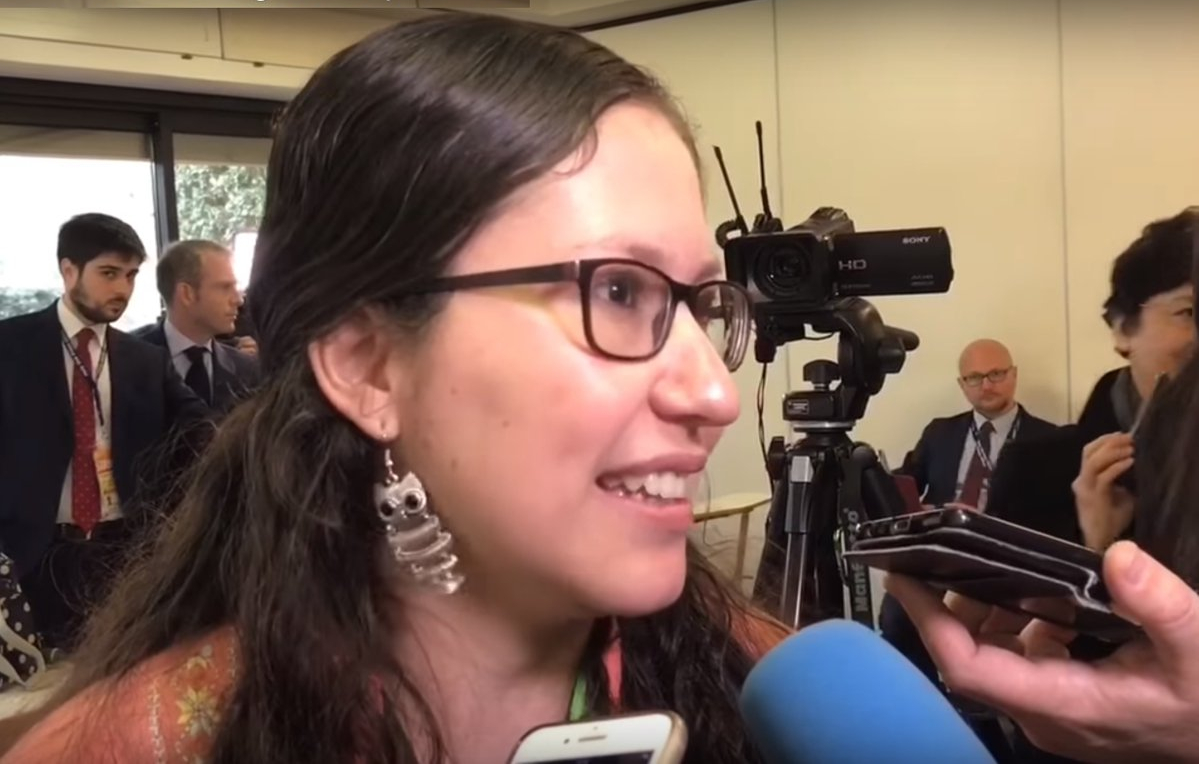 “You will be taken seriously,” the Pope ensured. How many times have the young people in this society felt they are not being considered, heeded, and taken seriously? “They may not take us seriously because they fear that our lack of experience may lead us to make mistakes in all fields. The truth is we may still have a lot to learn, but on the other hand we have something the adults don’t have, and that is our youthfulness here and now, a different experience from what they have lived. We certainly need their experience but we have this plus factor which they don’t have. The young people, however, must not fall into useless criticisms of the adults, trying to destroy the other, but instead, try to cultivate a deep inter-generational dialogue and without judgments. The young people and the adults have specific features that offer the possibility of fruitful and mutual enrichment: the adult person rejuvenates and the young mature.” So, besides the experience of dialogue with the young people of other Churches, faiths and convictions, you have also established a dialogue between generations… “In reality the two dimensions are not separate, and the religious dimension should not be distinct from our humanity and our daily lives; it would be a mistake to distinguish spiritual life from normal life. Instead, transcendence is part of man, and understanding that we are limited and seek the answers by going beyond our own selves is an anthropological issue, typical of our being human. Inter-generational dialogue is a fact because there are people of different ages. Humanity renews itself and within this fact there is also a spiritual aspect which is typical of all ages, in adults as in children.
“You will be taken seriously,” the Pope ensured. How many times have the young people in this society felt they are not being considered, heeded, and taken seriously? “They may not take us seriously because they fear that our lack of experience may lead us to make mistakes in all fields. The truth is we may still have a lot to learn, but on the other hand we have something the adults don’t have, and that is our youthfulness here and now, a different experience from what they have lived. We certainly need their experience but we have this plus factor which they don’t have. The young people, however, must not fall into useless criticisms of the adults, trying to destroy the other, but instead, try to cultivate a deep inter-generational dialogue and without judgments. The young people and the adults have specific features that offer the possibility of fruitful and mutual enrichment: the adult person rejuvenates and the young mature.” So, besides the experience of dialogue with the young people of other Churches, faiths and convictions, you have also established a dialogue between generations… “In reality the two dimensions are not separate, and the religious dimension should not be distinct from our humanity and our daily lives; it would be a mistake to distinguish spiritual life from normal life. Instead, transcendence is part of man, and understanding that we are limited and seek the answers by going beyond our own selves is an anthropological issue, typical of our being human. Inter-generational dialogue is a fact because there are people of different ages. Humanity renews itself and within this fact there is also a spiritual aspect which is typical of all ages, in adults as in children. 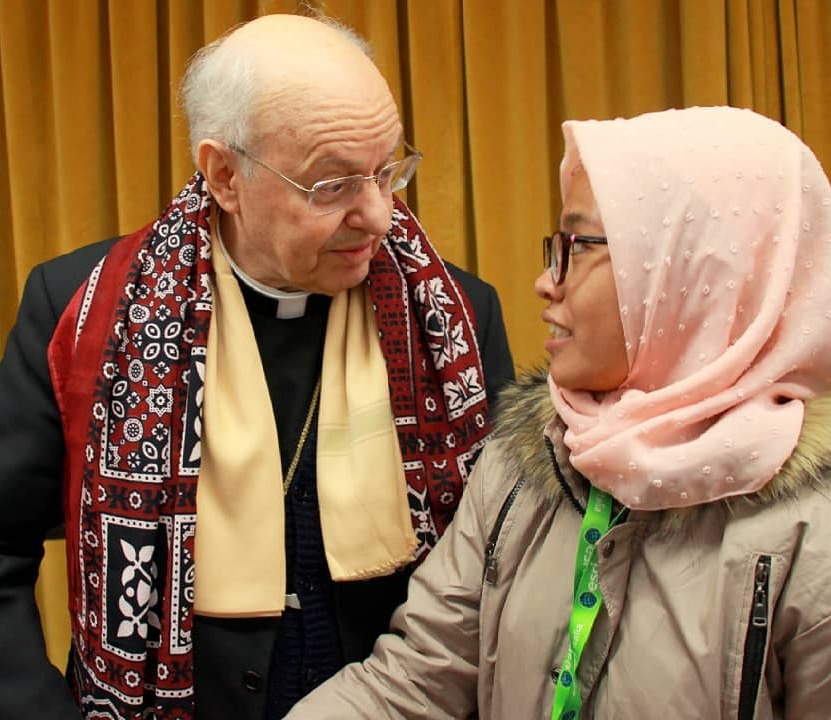 The Pope wanted this Synod on the young people to also be a synod for the young people, with and of the youth. Did you really feel like protagonists? “Very much so, and we were moved by this total openness, firstly of the Pope, and of the Church. His representatives who were there to keep up with us did not interfere: Cardinal Lorenzo Baldisseri and Bishop Fabio Fabene were there to listen to us. In them I saw the figure of Mary who creates total silence and makes room so that the Word could be born, a painting in the background, a precious silence that makes the Word emerge. They were there to listen both during the work session as in recreational moments and when we asked them questions they answered, otherwise they remained silent. In their faces we saw the reflection of the things on which they agreed and those which hurt them and this helped us to find that balance the Pope spoke about on the first day: speak up with daring but be humble if you make mistakes and ask for forgiveness. This happened when we were drawing up the final document, when some may have used overly critical language, but slowly we found this balance, also because their presence helped us. So, certainly we also felt the support of the adults of the hierarchical Church. Not everything was perfect but that’s life.” What impressed you upon completion of the works? “Once the final document was approved I heard the young people of various countries – one from the Samoan isles, an Asian, an African, a European and a Latin American – say that this document reflects what the young people are today. These are the same things my friends think, and the same questions we ask ourselves, and I was really glad because this was the reason for our meeting: to be able to talk of themes that otherwise would not have been faced. It’s true that not everyone agreed with everything, since there are different nuances in every region, however, the main problems and questions, and the experience in pursuing in-depth meaning is reflected in the document with all the contradictions that arose; even if some think in one way, others in a completely opposite way, the quest and aspirations were the same. So I was pleased to see that this 5-day working session, the 300 young people from all over the world and their situations essentially reflect what the young people are today, whether in the Middle East, Asia and in Africa. We are aware that this is a historical moment for the Church, not only because it is the first time it has opened out to listen to the young people in this manner, but also because from now on we will not be able to proceed without taking this meeting and all that has emerged into consideration. It is a start and we are happy to have been part of it.” Read the entire document
The Pope wanted this Synod on the young people to also be a synod for the young people, with and of the youth. Did you really feel like protagonists? “Very much so, and we were moved by this total openness, firstly of the Pope, and of the Church. His representatives who were there to keep up with us did not interfere: Cardinal Lorenzo Baldisseri and Bishop Fabio Fabene were there to listen to us. In them I saw the figure of Mary who creates total silence and makes room so that the Word could be born, a painting in the background, a precious silence that makes the Word emerge. They were there to listen both during the work session as in recreational moments and when we asked them questions they answered, otherwise they remained silent. In their faces we saw the reflection of the things on which they agreed and those which hurt them and this helped us to find that balance the Pope spoke about on the first day: speak up with daring but be humble if you make mistakes and ask for forgiveness. This happened when we were drawing up the final document, when some may have used overly critical language, but slowly we found this balance, also because their presence helped us. So, certainly we also felt the support of the adults of the hierarchical Church. Not everything was perfect but that’s life.” What impressed you upon completion of the works? “Once the final document was approved I heard the young people of various countries – one from the Samoan isles, an Asian, an African, a European and a Latin American – say that this document reflects what the young people are today. These are the same things my friends think, and the same questions we ask ourselves, and I was really glad because this was the reason for our meeting: to be able to talk of themes that otherwise would not have been faced. It’s true that not everyone agreed with everything, since there are different nuances in every region, however, the main problems and questions, and the experience in pursuing in-depth meaning is reflected in the document with all the contradictions that arose; even if some think in one way, others in a completely opposite way, the quest and aspirations were the same. So I was pleased to see that this 5-day working session, the 300 young people from all over the world and their situations essentially reflect what the young people are today, whether in the Middle East, Asia and in Africa. We are aware that this is a historical moment for the Church, not only because it is the first time it has opened out to listen to the young people in this manner, but also because from now on we will not be able to proceed without taking this meeting and all that has emerged into consideration. It is a start and we are happy to have been part of it.” Read the entire document
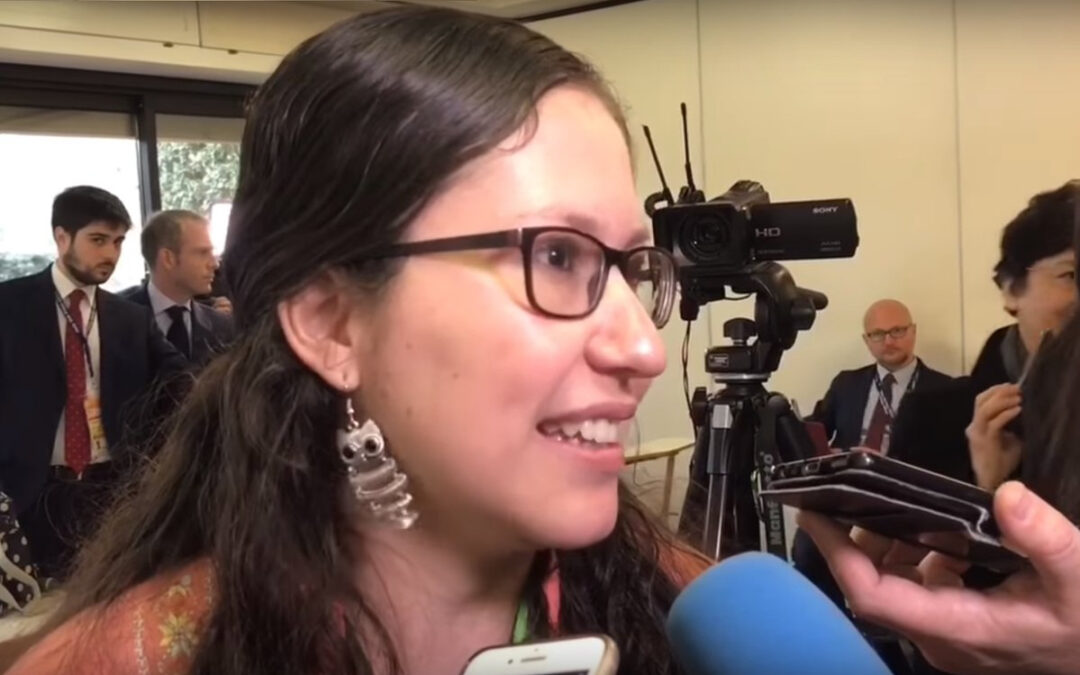
Apr 3, 2018 | Non categorizzato
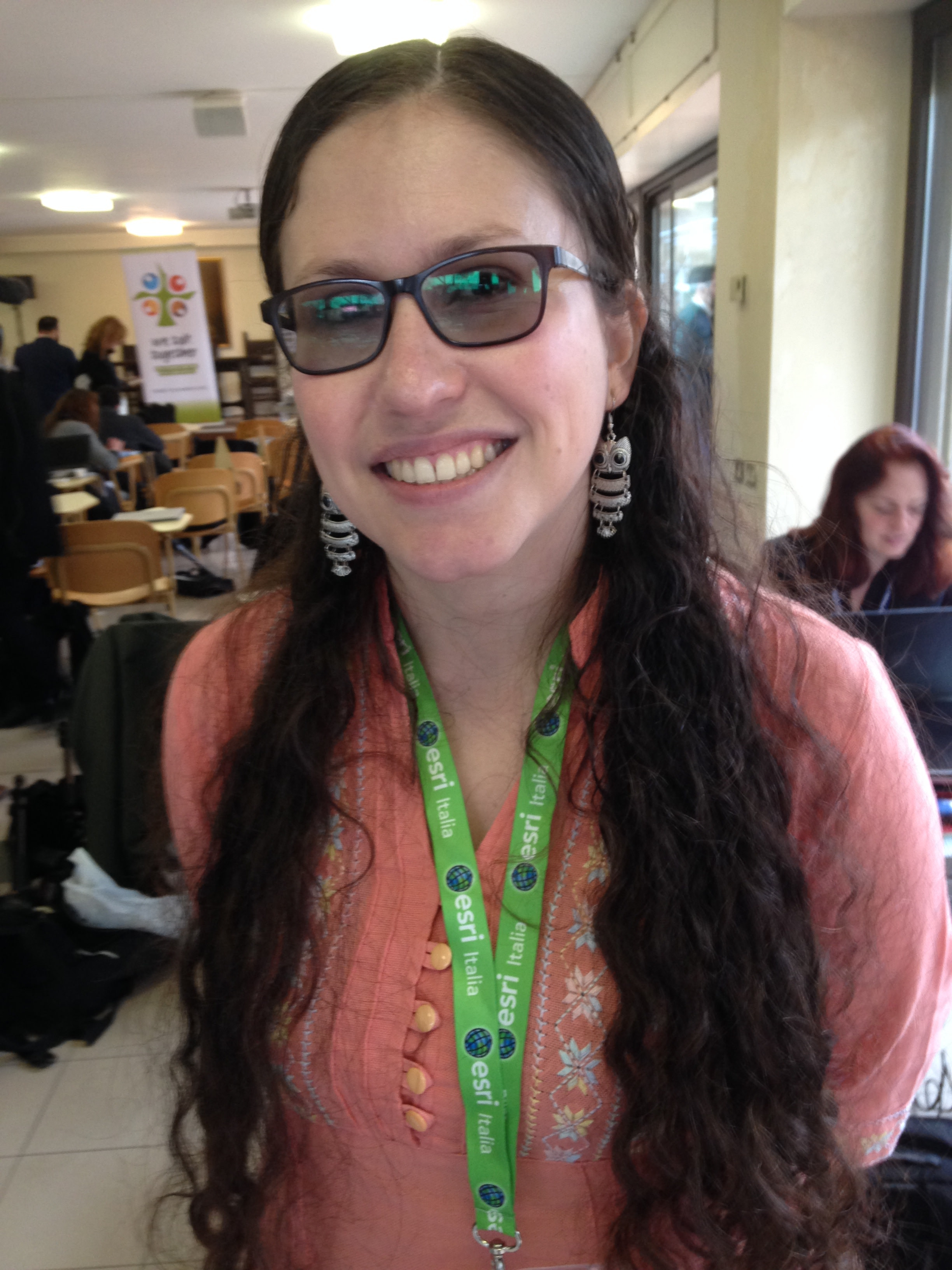
Noemi Sánches from Paraguay
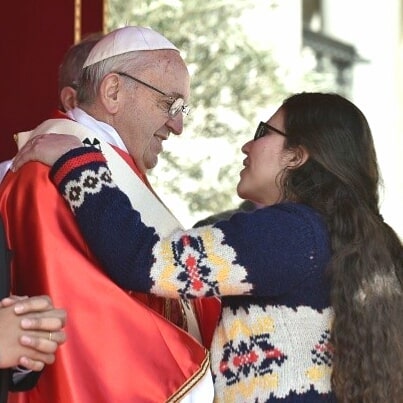 The Pope invited you all to speak up with courage and “cheekiness”. What are some of the the more difficult topics that you anticipate you will be dealing with? “Some very timely and, perhaps, problematic such as homosexuality. Then there was a request for a more concrete stance on migration, refugees and wars. These topics reach beyond mere dogmatism, the family in the traditional sense and how to live it today when it is not like exactly like that. We never asked for a change in the doctrine, but how to understand it to the end in order to live it it out in today’s society. Perhaps this is already being done, but not in a way that is reaching the young people.” At the Pre-Synodal meeting you were among the representatives of Focolare young people from around the world. What are the young people asking of the Church and what are they proposing? What experiences do they have that they can present as a model to others? “Based on the experience in Rome among young people from so many backgrounds, faiths and cultures, with whom we haven’t only spoken but also lived together, shared meals together and enriched one another, the young people from the Focolare – who have the charism of unity, which means dialogue – have proposed that these kinds of gatherings continue abroad among people of all backgrounds. This experience, in fact, helps us to realize that the other person is another me, and that we have the same questions in our hearts, the same challenges, which we approach in different ways, that are also an enrichment for all of us. So each of us as something to give, and it’s a giving that provides a wider vision, a more complete and enriching experience. Together we can arrive at the point of providing concrete answers to the problems we all experience.”
The Pope invited you all to speak up with courage and “cheekiness”. What are some of the the more difficult topics that you anticipate you will be dealing with? “Some very timely and, perhaps, problematic such as homosexuality. Then there was a request for a more concrete stance on migration, refugees and wars. These topics reach beyond mere dogmatism, the family in the traditional sense and how to live it today when it is not like exactly like that. We never asked for a change in the doctrine, but how to understand it to the end in order to live it it out in today’s society. Perhaps this is already being done, but not in a way that is reaching the young people.” At the Pre-Synodal meeting you were among the representatives of Focolare young people from around the world. What are the young people asking of the Church and what are they proposing? What experiences do they have that they can present as a model to others? “Based on the experience in Rome among young people from so many backgrounds, faiths and cultures, with whom we haven’t only spoken but also lived together, shared meals together and enriched one another, the young people from the Focolare – who have the charism of unity, which means dialogue – have proposed that these kinds of gatherings continue abroad among people of all backgrounds. This experience, in fact, helps us to realize that the other person is another me, and that we have the same questions in our hearts, the same challenges, which we approach in different ways, that are also an enrichment for all of us. So each of us as something to give, and it’s a giving that provides a wider vision, a more complete and enriching experience. Together we can arrive at the point of providing concrete answers to the problems we all experience.”  That is a valuable witness in times that are so marked by prejudice and indifference, when it’s easier to build walls and fences than bridges, or reaching out to someone who is different. How was this counter-current proposal received? “By the grace of God, within the Focolare Movement we’ve been living this way for many years and have been holding these kinds of meetings. But even in this space provided for us by the Church for the young people, our proposal was listened to with much joy and satisfaction by people who don’t even know of the Movement and live in different ways. When the time came for concrete proposals, in my group, I proposed that we apply this model of relationship even when we confront other topics, always with this dynamic of openness to everyone, in which everyone lives and takes part together, discovers themselves and one another more. All of the young people immediately agreed. It was unanimous. But we had to acknowledge that there were older and bigger people who listened in and made comments, but I could see in them – not a refusal – but a bit of fear, the fear that the tendency to “go out” towards the other would make them to lose their own identities. However, the young people who had had some experience with this dynamic, immediately realized that you don’t lose your identity, but you enrich it. Obviously, your religious identity has to be carefully form and deepened, but you can give that identity and, when you do, you make room for the other. The young people who lived it, understood it and wanted it. In this sense, we lived out what Pope Francis had said to us at the beginning: You young people have to dream the dreams of the old, but also prophecy, that is, go beyond the dream. And I think that what we lived in Rome was a translation of that exhortation into real life. We wanted to be Church and we realized that to do that we had to go beyond the traditional structures. The Church is universal, so we have to be open to all, welcoming all and reaching all, in order to become more fully what we already are.” Read the full document:
That is a valuable witness in times that are so marked by prejudice and indifference, when it’s easier to build walls and fences than bridges, or reaching out to someone who is different. How was this counter-current proposal received? “By the grace of God, within the Focolare Movement we’ve been living this way for many years and have been holding these kinds of meetings. But even in this space provided for us by the Church for the young people, our proposal was listened to with much joy and satisfaction by people who don’t even know of the Movement and live in different ways. When the time came for concrete proposals, in my group, I proposed that we apply this model of relationship even when we confront other topics, always with this dynamic of openness to everyone, in which everyone lives and takes part together, discovers themselves and one another more. All of the young people immediately agreed. It was unanimous. But we had to acknowledge that there were older and bigger people who listened in and made comments, but I could see in them – not a refusal – but a bit of fear, the fear that the tendency to “go out” towards the other would make them to lose their own identities. However, the young people who had had some experience with this dynamic, immediately realized that you don’t lose your identity, but you enrich it. Obviously, your religious identity has to be carefully form and deepened, but you can give that identity and, when you do, you make room for the other. The young people who lived it, understood it and wanted it. In this sense, we lived out what Pope Francis had said to us at the beginning: You young people have to dream the dreams of the old, but also prophecy, that is, go beyond the dream. And I think that what we lived in Rome was a translation of that exhortation into real life. We wanted to be Church and we realized that to do that we had to go beyond the traditional structures. The Church is universal, so we have to be open to all, welcoming all and reaching all, in order to become more fully what we already are.” Read the full document:
Apr 2, 2018 | Non categorizzato
Evicted We had been evicted and had to be out of the apartment within a month. Rents in the area were quite high. The only thing left for us to do was to look outside the city, hoping to find something that would match our means. We began to involve our friends and acquaintances in the search, but we didn’t come up with anything. We prayed, as we had had done before, with a lot of trust in God. Right towards the end of the month we heard of a family that was leaving a second-floor apartment. We tracked down the owner who lived in another city and explained our situation to him. He took our word on it and accepted our proposal, saying: “Move in. When I come we’ll draw up the new contract.” It seemed unbelievable to find an apartment in the same building and not having to make a big move. We remembered Jesus’s words: “Everything is possible for one who has faith.” (Italy) Optimism I have a difficult character and that’s why I found myself alone at a certain age, after a few attempts at marriage or living in community. A priest had suggested that I help out taking care of a spastic boy, so that the mother, a widow, could attend to some business. I began to visit and saw that, in spite of their hard circumstances, they were always happy and putting on a feast for anybody that went to visit them. Slowly, a new optimism began to enter in me. I discovered that the root of the serenity in that family was their life that was all based on the Gospel. And their attitude was contagious. (Slovakia) The Shrub All because of a bush that, in my opinion, my husband had planted in the wrong place, there was a little upset between us. As I cooked with my soul in confusion, I tried to entrust myself to God and, little by little, I became calm. I thought that I would suggest to my husband that we plant the shrub in a pot, and look for a better place to plant it. It seemed like a good idea to him. We apologized to each other and went to buy the vase. Then we planted it in a better spot. Now, when we look at our shrub, it reminds us that what matters the most in our relationship is that we love one another, and be disposed to give up our own ideas in order to make the other happy, so that God can shine between us. (Switzerland) Not only my physical health After the bone marrow transplant I was well for a long period until I had a relapse and a second transplant was needed. During moments of anguish, I said to myself that I had to give all my worry to Our Lady. When I did it with my heart, I felt a deep peace. At first I prayed all the time to get well. But then I realized that God wanted to draw me to himself precisely through the illness. So, instead of praying only for my physical health, I began to ask for the grace to be able to draw closer to God. (USA)

Apr 1, 2018 | Non categorizzato
 Father, we praise you with all your creatures. They came forth from your all-powerful hand; they are yours, filled with your presence and your tender love. Praise be to you! Son of God, Jesus, through you all things were made. You were formed in the womb of Mary our Mother, you became part of this earth, and you gazed upon this world with human eyes. Today you are alive in every creature in your risen glory. Praise be to you! Holy Spirit, by your light you guide this world towards the Father’s love and accompany creation as it groans in travail. You also dwell in our hearts and you inspire us to do what is good. Praise be to you! Source: Pope Francis, Encyclical Letter Laudato Si’ on the care for the common home (A Christian Prayer for creation, 246)
Father, we praise you with all your creatures. They came forth from your all-powerful hand; they are yours, filled with your presence and your tender love. Praise be to you! Son of God, Jesus, through you all things were made. You were formed in the womb of Mary our Mother, you became part of this earth, and you gazed upon this world with human eyes. Today you are alive in every creature in your risen glory. Praise be to you! Holy Spirit, by your light you guide this world towards the Father’s love and accompany creation as it groans in travail. You also dwell in our hearts and you inspire us to do what is good. Praise be to you! Source: Pope Francis, Encyclical Letter Laudato Si’ on the care for the common home (A Christian Prayer for creation, 246)

Mar 31, 2018 | Non categorizzato
 |
|
| Today more than ever, while new conflicts are starting in various parts of the world, and tragic events of all kinds make our hopes for peace seem vain, we want to affirm our faith in the Man-God, who died and rose again for all people, and to lead the world to its destiny of unity. He is our hope and our joy. I send Easter greetings to all of you, personally and on behalf of the Focolare Movement. I pray that the spirit of the Risen Lord be born and reborn every day in us and amongst us, according to Jesus’ promise, “For where two or three are gathered in my name, I am there among them” (Mt 18:20). Happy Easter everyone!
Maria Voce
|
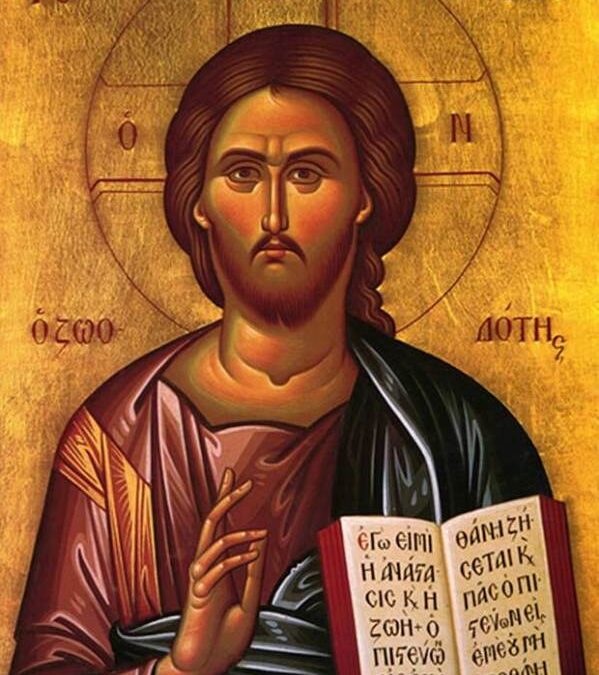
Mar 31, 2018 | Non categorizzato
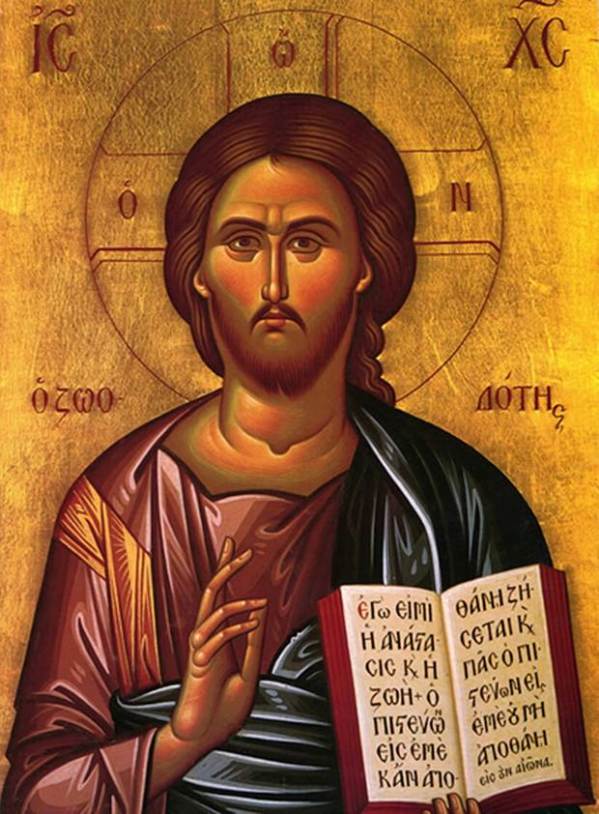 It’s the triumph of the Risen Jesus whom we know and relive personally, in our own small way, after having embraced him forsaken; or when truly united in his name, we experience the effects of his life, the fruits of his Spirit. The Risen Lord must always be present and living in us. The world is waiting for people who not only believe in and love Him one way or another, but people who are authentic witnesses. The world is waiting for people who can truly say, as Mary Magdalene said to the apostles after seeing Jesus near the tomb, those words that we know but which are always new: “We have seen him!” Yes, we have discovered him in the light with which he enlightened us; we have touched him in the peace with which he filled us; we have heard his voice in the depths of our heart; we have rejoiced in his incomparable joy. Source: Chiara Lubich during a telephone link up. Castel Gandolfo, Rome, 20th April 2000.
It’s the triumph of the Risen Jesus whom we know and relive personally, in our own small way, after having embraced him forsaken; or when truly united in his name, we experience the effects of his life, the fruits of his Spirit. The Risen Lord must always be present and living in us. The world is waiting for people who not only believe in and love Him one way or another, but people who are authentic witnesses. The world is waiting for people who can truly say, as Mary Magdalene said to the apostles after seeing Jesus near the tomb, those words that we know but which are always new: “We have seen him!” Yes, we have discovered him in the light with which he enlightened us; we have touched him in the peace with which he filled us; we have heard his voice in the depths of our heart; we have rejoiced in his incomparable joy. Source: Chiara Lubich during a telephone link up. Castel Gandolfo, Rome, 20th April 2000.
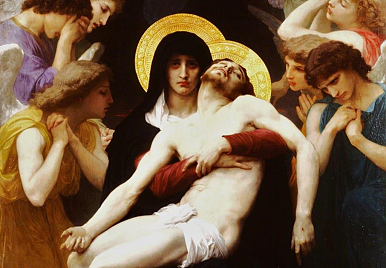
Mar 30, 2018 | Non categorizzato
 “Mary is alone. Alone with her dead son-God. Is it an unspeakable depth of anguish, an infinite agony? Yes, it is, but she remains standing, thus becoming a sublime example and monument of all virtues. She hopes and she believes. During his life, Jesus had spoken of his death but also of his resurrection. Others may have forgotten his words, but she never forgot them. She kept these words in her heart, along with others, and meditated on them (cf. Lk. 2:51). Therefore, she doesn’t give in to suffering: she waits.” Source: Chiara Lubich during a telephone link up. Castel Gandolfo, Romea, 20th April 2000.
“Mary is alone. Alone with her dead son-God. Is it an unspeakable depth of anguish, an infinite agony? Yes, it is, but she remains standing, thus becoming a sublime example and monument of all virtues. She hopes and she believes. During his life, Jesus had spoken of his death but also of his resurrection. Others may have forgotten his words, but she never forgot them. She kept these words in her heart, along with others, and meditated on them (cf. Lk. 2:51). Therefore, she doesn’t give in to suffering: she waits.” Source: Chiara Lubich during a telephone link up. Castel Gandolfo, Romea, 20th April 2000.
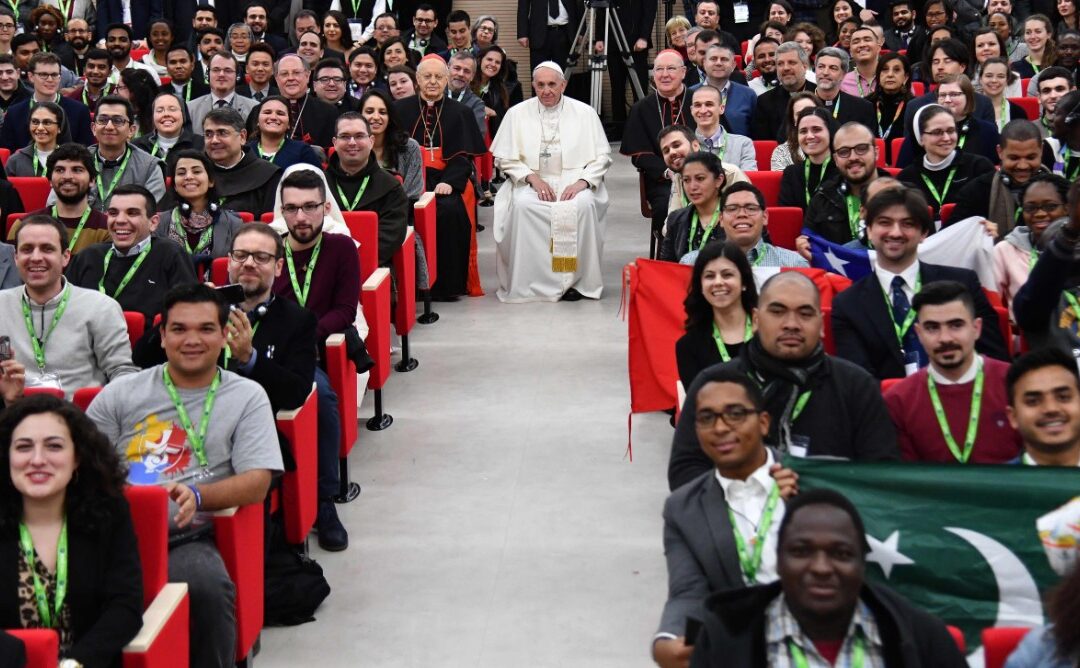
Mar 30, 2018 | Non categorizzato
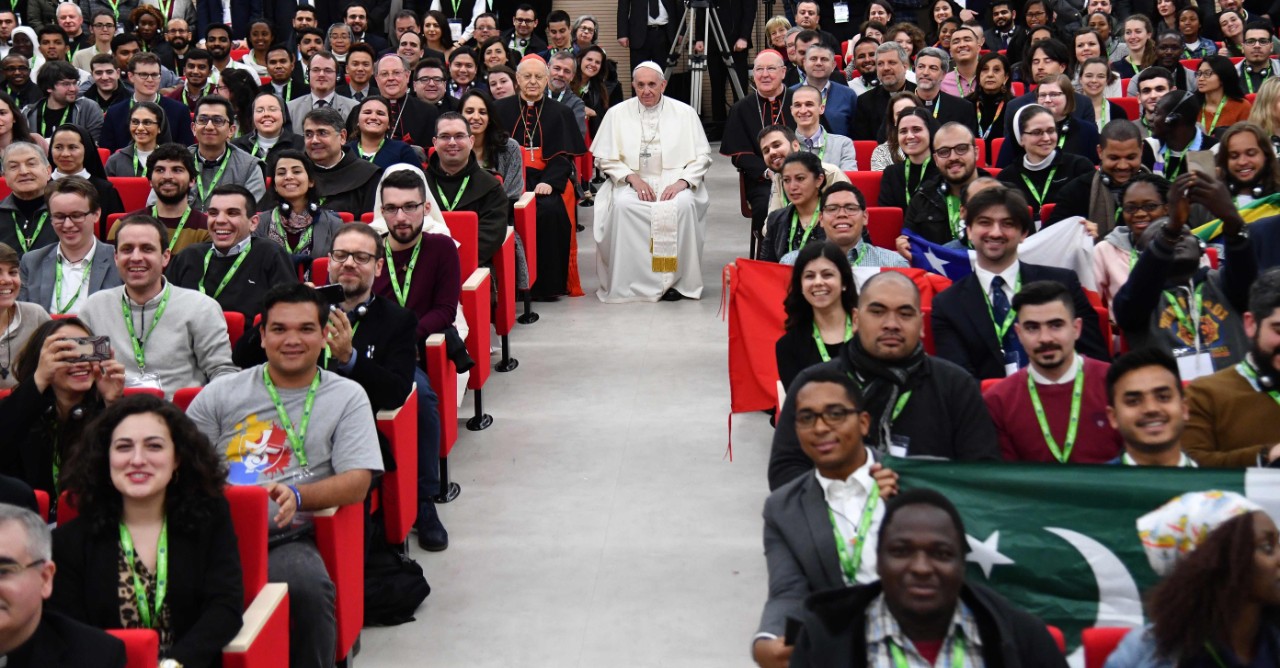 Young people want to find “peace, love, trust, equality, freedom and justice” in the Church. They also search for security, the capacity to listen, consideration, readiness to welcome the contribution of others. These are young people from every corner of the globe, belonging to different faiths, having different beliefs, coming from different social, economic and cultural backgrounds. Even young people who “do not follow traditional religions or say they are religious” but who are “open to spirituality” and want to work for others and for the common good are looking for a guide to provide direction and meaning in life. The young people themselves shared these ideas at a meeting that took place in Rome from March 19th -24th: this meeting was a preparation for the XV Ordinary Synod of Bishops on “Young people, the faith and vocational discernment” that will take place in October 2018. It was Pope Francis himself who wanted this Synod. The 300 young people present for the preparatory meeting and another 15 thousand linked up by web told the Church – gathered to listen in this way for the first time ever – all about their hopes and challenges and what they would like to find in those who are God’s ministers. They also spoke of what they are looking for in society as a whole. They shared their experiences and offered their suggestions to help ensure that the message of the gospel reaches an increasing number of young people, that it is expressed in the right way and with an attitude that is humble and open to dialogue. At the invitation of Pope Francis who asked the young people to speak openly and to be “cheeky” enough to ask difficult questions, they said very clearly that they wanted “attractive role models who are genuine and who do what they say”, “real witnesses who speak the gospel with their lives”, “men and women who can speak with passion about their faith and their relationship with Jesus and encourage others to draw close to him.” They want the Church to be welcoming, merciful, humble, human, inclusive, coherent, believable, “able to empathise with all the young people in the world” and show “tenderness” towards people to “don’t believe in following certain standards.” They are looking for “rational, critical responses to complex questions” such as sexuality, “addiction, marital and family breakdown” and to “the big social problems such as organised crime, human trafficking, violence, corruption, exploitation, murder of women and destruction of the natural environment.” They admit to not having a single, unified vision about complex issues such as migration and welcoming refugees even though there is “a universal duty to care for the dignity of every human being.” They also feel that there is little agreement among young people – neither within the Church nor in the broader world – about controversial issues such as “contraception, abortion, homosexuality, living together, marriage and even how the priesthood is understood.” Nonetheless, even the young people who do not share in the Church’s teaching still “want to be part of it.” Furthermore, they are shocked by the current “political, social and economic instability” and ask the Church to be “solid and with a preference for those who are struggling on the margins of society.” They want a sure guide because “simple answers are not enough.” They also expect the Church to acknowledge the mistakes it has made, all that it has failed to do and even its most painful wounds. This is the only way they can believe and trust the Church. Young people ask to be more involved in decision making, to be given responsibility and leadership roles in a broader context such as parish groups. They also feel that women should be involved more, that there should be more possibility for them to use their talents. They want the Church to be present and to search for them in the social and virtual worlds that they inhabit – in the bar, on the sports field and in social media. They also want to know more about the sacraments and to attend both large-scale events such as the World Youth Day as well as small ones in the diocese and parish. They want to be included, to be part of a group – “even a small local group where we can ask questions and share our Christian life is so important in nurturing and preserving our faith.” In conclusion, they are young people looking for their vocation in the world and for the meaning of life. They care for and cultivate their own spirituality – and almost always – see the Church as a great partner. Now it is up to the Church, as it has said itself, to take notice of what they are saying. The next appointment is in October at the Synod Assembly but, in the meantime, the Pope has said, “You will be taken seriously.”
Young people want to find “peace, love, trust, equality, freedom and justice” in the Church. They also search for security, the capacity to listen, consideration, readiness to welcome the contribution of others. These are young people from every corner of the globe, belonging to different faiths, having different beliefs, coming from different social, economic and cultural backgrounds. Even young people who “do not follow traditional religions or say they are religious” but who are “open to spirituality” and want to work for others and for the common good are looking for a guide to provide direction and meaning in life. The young people themselves shared these ideas at a meeting that took place in Rome from March 19th -24th: this meeting was a preparation for the XV Ordinary Synod of Bishops on “Young people, the faith and vocational discernment” that will take place in October 2018. It was Pope Francis himself who wanted this Synod. The 300 young people present for the preparatory meeting and another 15 thousand linked up by web told the Church – gathered to listen in this way for the first time ever – all about their hopes and challenges and what they would like to find in those who are God’s ministers. They also spoke of what they are looking for in society as a whole. They shared their experiences and offered their suggestions to help ensure that the message of the gospel reaches an increasing number of young people, that it is expressed in the right way and with an attitude that is humble and open to dialogue. At the invitation of Pope Francis who asked the young people to speak openly and to be “cheeky” enough to ask difficult questions, they said very clearly that they wanted “attractive role models who are genuine and who do what they say”, “real witnesses who speak the gospel with their lives”, “men and women who can speak with passion about their faith and their relationship with Jesus and encourage others to draw close to him.” They want the Church to be welcoming, merciful, humble, human, inclusive, coherent, believable, “able to empathise with all the young people in the world” and show “tenderness” towards people to “don’t believe in following certain standards.” They are looking for “rational, critical responses to complex questions” such as sexuality, “addiction, marital and family breakdown” and to “the big social problems such as organised crime, human trafficking, violence, corruption, exploitation, murder of women and destruction of the natural environment.” They admit to not having a single, unified vision about complex issues such as migration and welcoming refugees even though there is “a universal duty to care for the dignity of every human being.” They also feel that there is little agreement among young people – neither within the Church nor in the broader world – about controversial issues such as “contraception, abortion, homosexuality, living together, marriage and even how the priesthood is understood.” Nonetheless, even the young people who do not share in the Church’s teaching still “want to be part of it.” Furthermore, they are shocked by the current “political, social and economic instability” and ask the Church to be “solid and with a preference for those who are struggling on the margins of society.” They want a sure guide because “simple answers are not enough.” They also expect the Church to acknowledge the mistakes it has made, all that it has failed to do and even its most painful wounds. This is the only way they can believe and trust the Church. Young people ask to be more involved in decision making, to be given responsibility and leadership roles in a broader context such as parish groups. They also feel that women should be involved more, that there should be more possibility for them to use their talents. They want the Church to be present and to search for them in the social and virtual worlds that they inhabit – in the bar, on the sports field and in social media. They also want to know more about the sacraments and to attend both large-scale events such as the World Youth Day as well as small ones in the diocese and parish. They want to be included, to be part of a group – “even a small local group where we can ask questions and share our Christian life is so important in nurturing and preserving our faith.” In conclusion, they are young people looking for their vocation in the world and for the meaning of life. They care for and cultivate their own spirituality – and almost always – see the Church as a great partner. Now it is up to the Church, as it has said itself, to take notice of what they are saying. The next appointment is in October at the Synod Assembly but, in the meantime, the Pope has said, “You will be taken seriously.”
Claudia Di Lorenzi
Document
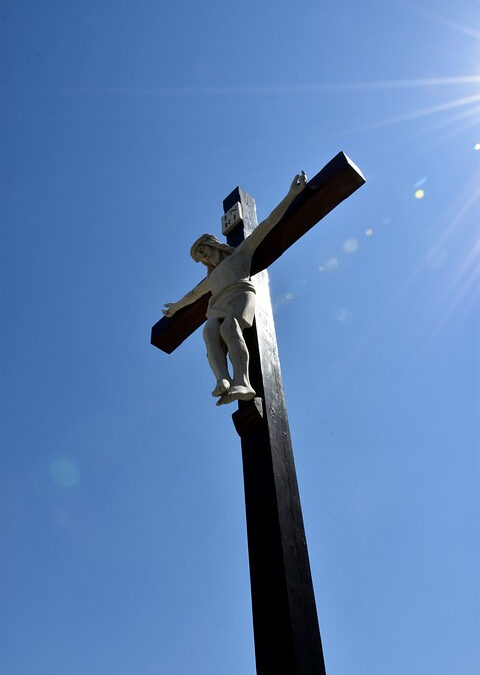
Mar 29, 2018 | Non categorizzato
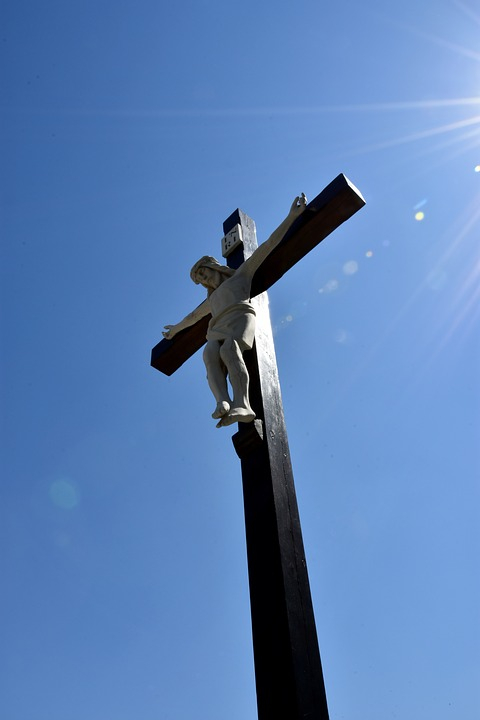 “I’ve recently written a book about him called “The Cry”. I dedicated it to him with the intention of writing it also on your behalf, on behalf of the whole Movement “as – and this is the dedication – a love letter to Jesus forsaken”. In it, I speak of him who, in the one life given to us by God, one day, a particular day that was different for each of us, called us to follow him and give ourselves to him. It’s clear then – and I say this in the book – that what I want to say in those pages cannot be considered as a talk, albeit one that is personal, familiar in tone and deeply felt. Instead it wants to be a song, a hymn of joy and especially of gratitude to him. “He had given everything: the life he lived with Mary, in obedience and in the difficulties of daily life. He had given three years of preaching and three hours on the cross, from which he forgave his executioners, promised Paradise to the good thief, and gave his Mother to us. Only his divinity remained. “His union with the Father, his sweet and ineffable union with God, had made him powerful on earth as the Son of God and majestic on the cross. Yet there, the awareness of God’s presence had to sink into the deepest recesses of his soul so as not to be felt any longer. It had to separate him in some way from the One with whom he had said he was one”, and make him cry out: “My God, my God, why have you forsaken me?” (Mt. 27:46).″ Source: Chiara Lubich during a telephone link up. Castel Gandolfo, Rome, 20th April 2000.
“I’ve recently written a book about him called “The Cry”. I dedicated it to him with the intention of writing it also on your behalf, on behalf of the whole Movement “as – and this is the dedication – a love letter to Jesus forsaken”. In it, I speak of him who, in the one life given to us by God, one day, a particular day that was different for each of us, called us to follow him and give ourselves to him. It’s clear then – and I say this in the book – that what I want to say in those pages cannot be considered as a talk, albeit one that is personal, familiar in tone and deeply felt. Instead it wants to be a song, a hymn of joy and especially of gratitude to him. “He had given everything: the life he lived with Mary, in obedience and in the difficulties of daily life. He had given three years of preaching and three hours on the cross, from which he forgave his executioners, promised Paradise to the good thief, and gave his Mother to us. Only his divinity remained. “His union with the Father, his sweet and ineffable union with God, had made him powerful on earth as the Son of God and majestic on the cross. Yet there, the awareness of God’s presence had to sink into the deepest recesses of his soul so as not to be felt any longer. It had to separate him in some way from the One with whom he had said he was one”, and make him cry out: “My God, my God, why have you forsaken me?” (Mt. 27:46).″ Source: Chiara Lubich during a telephone link up. Castel Gandolfo, Rome, 20th April 2000.
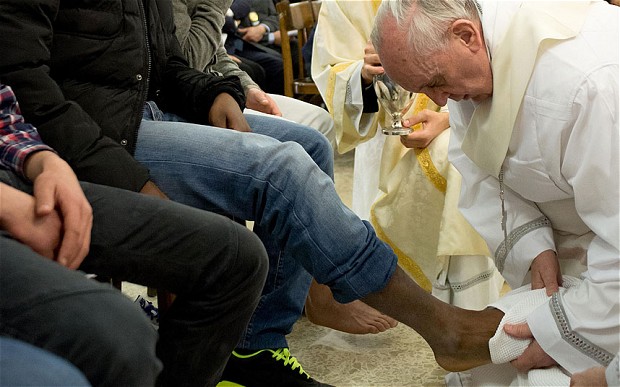
Mar 28, 2018 | Non categorizzato
 Today, then, the word is Love. Holy Thursday is the day on which, over the years, we have often experienced the sweetness of a special union with God. It reminds us of the abundance of love that heaven poured out over the earth. This Love, first of all, is in the Eucharist given to us on this day. This Love is in the priesthood, which is a service of love and enables us to have the Eucharist. This Love is in unity, which is the effect of love and for which Jesus implored the Father: “That they may all be one, as you … and I” (cf. Jn. 17:21). This Love is in the new commandment which he revealed on this day before dying. “Just as I have loved you, you also should love one another. By this everyone will know that you are my disciples, if you have love for one another (Jn. 13:34-35). This commandment enables our life here on earth to be modelled on that of the Holy Trinity. Source: Chiara Lubich during a telephone link up. Castel Gandolfo, Romea, 20th April 2000.
Today, then, the word is Love. Holy Thursday is the day on which, over the years, we have often experienced the sweetness of a special union with God. It reminds us of the abundance of love that heaven poured out over the earth. This Love, first of all, is in the Eucharist given to us on this day. This Love is in the priesthood, which is a service of love and enables us to have the Eucharist. This Love is in unity, which is the effect of love and for which Jesus implored the Father: “That they may all be one, as you … and I” (cf. Jn. 17:21). This Love is in the new commandment which he revealed on this day before dying. “Just as I have loved you, you also should love one another. By this everyone will know that you are my disciples, if you have love for one another (Jn. 13:34-35). This commandment enables our life here on earth to be modelled on that of the Holy Trinity. Source: Chiara Lubich during a telephone link up. Castel Gandolfo, Romea, 20th April 2000.
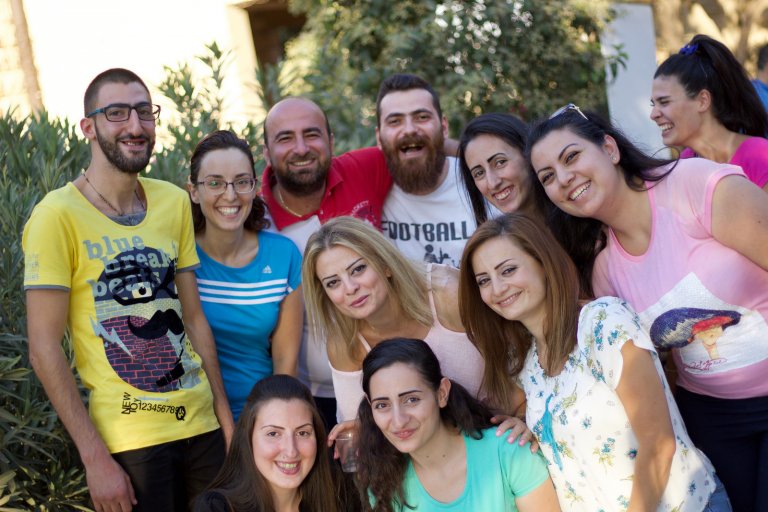
Mar 28, 2018 | Non categorizzato
 “September flew by. I had taken a taxi with some other people who resided in the town. We we were leaving the city that had welcomed me: Aleppo. I was among the few – perhaps the only – foreigner that had chosen this place for vacation. The taxi crossed the city, an expanse of neighbourhoods completely destroyed. How many dead were buried beneath those ruins? The driver didn’t seem to think about that as he sped along the street that led south in the direction of Homs. From there he would proceed in the direction of Beirut. After two and a half hours we were able to make out the first houses that was left standing. It was difficult to believe. I was welcomed for a month by the Focolare community. When I arrived at the door of a church, someone said to me: ‘Here you will find real Christians,’ words I had never heard spoken before. But now I understand. I saw for myself how the focolare is the place in which everything is shared: the Providence that comes from around the world, with tables full of clothes, and so forth; but mostly the joys and sorrows of daily life… Here, for years, the only support was the Word of the Gospel, the God of love. How the beginnings of the Focolare history returned to my mind, when Chiara Lubich would describe them saying those words that I heard so many times: ‘It was war time and everything crumbled!’
“September flew by. I had taken a taxi with some other people who resided in the town. We we were leaving the city that had welcomed me: Aleppo. I was among the few – perhaps the only – foreigner that had chosen this place for vacation. The taxi crossed the city, an expanse of neighbourhoods completely destroyed. How many dead were buried beneath those ruins? The driver didn’t seem to think about that as he sped along the street that led south in the direction of Homs. From there he would proceed in the direction of Beirut. After two and a half hours we were able to make out the first houses that was left standing. It was difficult to believe. I was welcomed for a month by the Focolare community. When I arrived at the door of a church, someone said to me: ‘Here you will find real Christians,’ words I had never heard spoken before. But now I understand. I saw for myself how the focolare is the place in which everything is shared: the Providence that comes from around the world, with tables full of clothes, and so forth; but mostly the joys and sorrows of daily life… Here, for years, the only support was the Word of the Gospel, the God of love. How the beginnings of the Focolare history returned to my mind, when Chiara Lubich would describe them saying those words that I heard so many times: ‘It was war time and everything crumbled!’
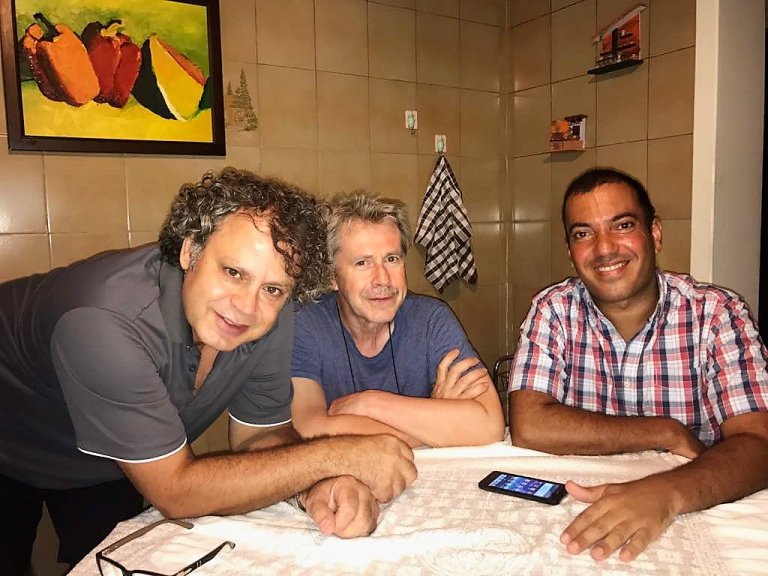
Bernard (centre), with Freddy (left) and Murad (right) in the Focolare centre of Aleppo.
 The price paid by the population during the war was high, too high: many, many dead, then the diseases, depression, trauma, isolation, lack of education and instruction, work training and all the abandoned children… the list would be too long. I always posed a question to the local people: ‘What do you think is important in facing the future?’ I thought the answer would be ‘rebuilding our houses and resuming productive activities.’ But instead, to my great surprise, the answer I heard most was ‘a great spiritual strength, capable of making new life to be born even here.’ Thank you Robert, Pascal, Freddy and Murad. Thank you Ghada, Lina Chris, Maria Grazia, Maria and Zeina for your life and witness. Now you have a special place in my heart.” Compiled by Gustavo Clariá
The price paid by the population during the war was high, too high: many, many dead, then the diseases, depression, trauma, isolation, lack of education and instruction, work training and all the abandoned children… the list would be too long. I always posed a question to the local people: ‘What do you think is important in facing the future?’ I thought the answer would be ‘rebuilding our houses and resuming productive activities.’ But instead, to my great surprise, the answer I heard most was ‘a great spiritual strength, capable of making new life to be born even here.’ Thank you Robert, Pascal, Freddy and Murad. Thank you Ghada, Lina Chris, Maria Grazia, Maria and Zeina for your life and witness. Now you have a special place in my heart.” Compiled by Gustavo Clariá
Mar 27, 2018 | Non categorizzato, Word of
for ages 4-8 | for ages 9-17 | Print | Audio
These words are part of a long dialogue Jesus had with the crowd around him. They had seen the sign that he had performed in the multiplication of the loaves and followed him, perhaps just wanting more material help. Starting from their immediate needs, Jesus gradually brings the conversation around to his mission: he was sent by the Father to give humanity true life, eternal life, which is the life of God himself, who is Love. As Jesus walked along the roads of Palestine, he took an interest in all the people he met, not shying away from their requests for food, water, healing and forgiveness. On the contrary, he met all their needs and gave hope to everyone. That is why he could then ask all who heard him to take a further step, to accept the life he offered, to be in relationship with him, trust him and believe in him. Commenting on this sentence of the Gospel, Chiara Lubich wrote in the magazine Città Nuova in 1991: “Here, Jesus responds to people’s deepest aspirations. They have been created for life and seek life with all their strength. But their great mistake is to look for it in other people and in things that, being limited and passing, cannot give a genuine answer to their aspirations … Only Jesus can satisfy their hunger. Only he can give life without end, for he is the Life.” “Very truly, I tell you, whoever believes has eternal life.” Christian faith is primarily the fruit of a personal encounter with God, with Jesus, who wants nothing more than to have us share in his very own life. Faith in Jesus means following his example of not being wrapped up in ourselves, in our fears and limited plans, but rather to focus our attention on the needs of others. They may have real needs arising from poverty, illness and marginalization, and above all they need to be listened to, accepted and welcomed. In this way, through the life we are living, we will be able to share the love we have received as a gift from God with others. To strengthen us on our journey, he has also left us the great gift of the Eucharist, a sign of a self-giving love that enables others to live. “Very truly, I tell you, whoever believes has eternal life.” Often, during the day, we place our trust in people around us. It may be the teacher who teaches our children, the taxi driver who takes us to our destination, the doctor who treats us … We cannot live without trust, and trust is increased by knowing one another, through friendship, by a relationship deepened over time. How then can we live the Word of Life this month? Continuing her commentary, Chiara invited us to renew our complete choice of Jesus: “We already know how to do this by putting his words into practice with fresh commitment. His words remind us of many specific aspects of life. For example, are we meeting a neighbor? ‘You shall love your neighbor as yourself’ (Mt 22:39). Are we suffering? ‘If any want to become my follower … then they should take up their cross’ (Mt 16:24), and so on. “If we do so, the words of Jesus will be a source of light, and he will come to us with his truth, his strength and his love. Our life will become more and more life with him, doing everything with him. We will no longer be afraid even of the physical death that awaits us all, because with Jesus true life has already begun in us, the life that never ends.” Letizia Magri
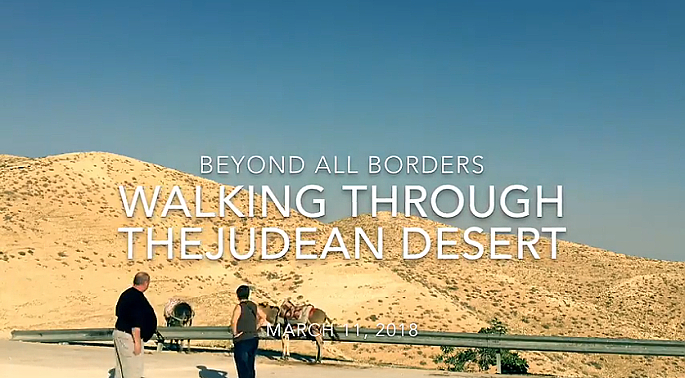
Mar 26, 2018 | Focolare Worldwide

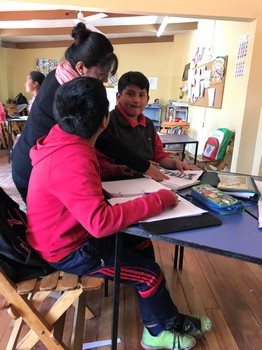
Mar 25, 2018 | Focolare Worldwide
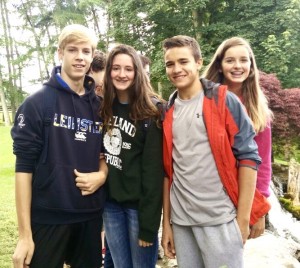 Green and friendly Ireland is full of excellent schools for students of all ages to learn English. Language Learning International (LLI) is no exception. Various kinds of study vacations are available with cutting edge learning techniques, family programs, culture, sport and entertainment, along with internships in France and Spain for Irish students. What distinguishes the educational approach of this school, which was founded in 1989 by Eugene Murphy in Dublin, is the quality of the relationships with the students in a welcoming atmosphere and a sensitive look towards the personal characteristics of each individual. But there is something else. The LLI, with its over 2 thousand students every year, is a representative of the Economy of Communion (EoC) in the training sector. The following experiences were drawn from the EoC website. “A boy showed up at summer camp with Asperger Syndrome, which we didn’t know anything about until he arrived. The first lodgings were not very appropriate for him, because they weren’t able to meet the particular needs of the youngster. They tried moving him to another family, but the difficulties began again. Even though the summer is a very intense season, in the business we want to be sure to ensure just and serene treatment for anyone comes, so we looked for another alternative until we were able to find an elderly woman who was happy to host the boy, being very familiar herself with the syndrome that her grandson also suffered from. Everything turned out positive for everyone: The student was able to take full advantage of the experience and return home happy in the evening. And the person in charge of relations with the family declared that the presence of the boy in the program had filled the entire season with value!” “Great atmosphere at the English course, in the classroom and excellent relationships established; one of the tests to be prepared, however, was an individual oral presentation. Suddenly a 15-year-old boy approached Eugene Murphy, the school’s founder and expert trainer. He told her that he would be unable to do it because of his stuttering. Eugene talked to other trainers and they decide to reassure the boy by doing the test privately. In the end, the teachers encouraged him to share the experience with others anyway, the young man agreed and, between his own emotion and the general emotion, the test concluded with a long applause from the class. It was then discovered that the boy had not spoken until the age of 7 and that performance in public turned out to be a sort of miracle that made him and his parents incredibly joyful”.
Green and friendly Ireland is full of excellent schools for students of all ages to learn English. Language Learning International (LLI) is no exception. Various kinds of study vacations are available with cutting edge learning techniques, family programs, culture, sport and entertainment, along with internships in France and Spain for Irish students. What distinguishes the educational approach of this school, which was founded in 1989 by Eugene Murphy in Dublin, is the quality of the relationships with the students in a welcoming atmosphere and a sensitive look towards the personal characteristics of each individual. But there is something else. The LLI, with its over 2 thousand students every year, is a representative of the Economy of Communion (EoC) in the training sector. The following experiences were drawn from the EoC website. “A boy showed up at summer camp with Asperger Syndrome, which we didn’t know anything about until he arrived. The first lodgings were not very appropriate for him, because they weren’t able to meet the particular needs of the youngster. They tried moving him to another family, but the difficulties began again. Even though the summer is a very intense season, in the business we want to be sure to ensure just and serene treatment for anyone comes, so we looked for another alternative until we were able to find an elderly woman who was happy to host the boy, being very familiar herself with the syndrome that her grandson also suffered from. Everything turned out positive for everyone: The student was able to take full advantage of the experience and return home happy in the evening. And the person in charge of relations with the family declared that the presence of the boy in the program had filled the entire season with value!” “Great atmosphere at the English course, in the classroom and excellent relationships established; one of the tests to be prepared, however, was an individual oral presentation. Suddenly a 15-year-old boy approached Eugene Murphy, the school’s founder and expert trainer. He told her that he would be unable to do it because of his stuttering. Eugene talked to other trainers and they decide to reassure the boy by doing the test privately. In the end, the teachers encouraged him to share the experience with others anyway, the young man agreed and, between his own emotion and the general emotion, the test concluded with a long applause from the class. It was then discovered that the boy had not spoken until the age of 7 and that performance in public turned out to be a sort of miracle that made him and his parents incredibly joyful”.  LLI Director, Cathy Young, tells about a new project that has involved the school in an adventure of openness with a geographic region that is quite far from Ireland: “We wanted to undertake a Economy of Communion project that focused on education. On the United World Association website, we learned of a fantastic project in Bolivia, called Fondazione Unisol, which offers support to several of the poorest families in Cochabamba. We made contact and have put together a project that will finance the purchase of new books and portable computers, furnish new desks and chairs for classrooms, and support the work of two teachers”. “This reciprocal exchange,” says Cathy, “is one of the most beautiful aspects of our collaboration, and it helps us to live better in our daily work environment.” At LLI the students have a live learning experience of the meaning of many words, but the first is sharing. Chiara Favotti
LLI Director, Cathy Young, tells about a new project that has involved the school in an adventure of openness with a geographic region that is quite far from Ireland: “We wanted to undertake a Economy of Communion project that focused on education. On the United World Association website, we learned of a fantastic project in Bolivia, called Fondazione Unisol, which offers support to several of the poorest families in Cochabamba. We made contact and have put together a project that will finance the purchase of new books and portable computers, furnish new desks and chairs for classrooms, and support the work of two teachers”. “This reciprocal exchange,” says Cathy, “is one of the most beautiful aspects of our collaboration, and it helps us to live better in our daily work environment.” At LLI the students have a live learning experience of the meaning of many words, but the first is sharing. Chiara Favotti
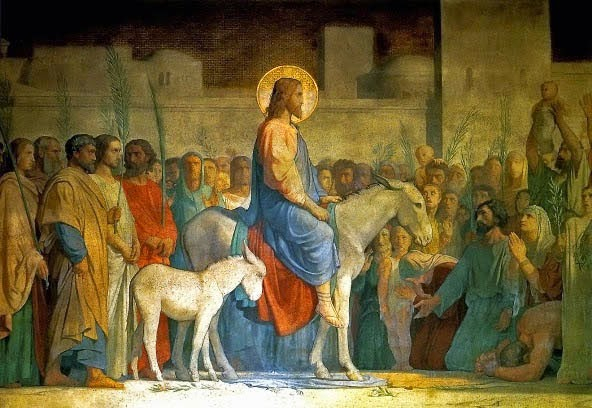
Mar 24, 2018 | Non categorizzato
 “In you, O Lord, I take refuge, I will never be put to shame” (Ps 71:1). This is how the already seriously ill bishop, Klaus Hemmerle, began his last homily at the Dome Church of Aachen, Germany. It was late 1993. “God, you hold me with your strength just as I am. God, you hold the world just as it is. God, you hold this neighbor with your strength just as he is.” To be held up by this God who descended in the kenosis, who stripped himself of everything and took on the form of a slave – this is the only way that the door of hope can be reopened in us: welcoming Him who first welcomed us, letting ourselves be carried by Him. Believing that we are held up by Him: This is the eye of the needle through which we receive the thread of hope that is slipped through it. This God can truly give us hope. This is where our Church with all its errors and weaknesses, with all its requests and its too large and too small challenges, can be something extraordinary: a community of people that believe in the fact that they have been welcomed and supported, a community of people that support one another, in which each one holds up the other.” From “Klaus Hemmerle, innamorato della Parola di Dio” – Città Nuova Ed, 290-291.
“In you, O Lord, I take refuge, I will never be put to shame” (Ps 71:1). This is how the already seriously ill bishop, Klaus Hemmerle, began his last homily at the Dome Church of Aachen, Germany. It was late 1993. “God, you hold me with your strength just as I am. God, you hold the world just as it is. God, you hold this neighbor with your strength just as he is.” To be held up by this God who descended in the kenosis, who stripped himself of everything and took on the form of a slave – this is the only way that the door of hope can be reopened in us: welcoming Him who first welcomed us, letting ourselves be carried by Him. Believing that we are held up by Him: This is the eye of the needle through which we receive the thread of hope that is slipped through it. This God can truly give us hope. This is where our Church with all its errors and weaknesses, with all its requests and its too large and too small challenges, can be something extraordinary: a community of people that believe in the fact that they have been welcomed and supported, a community of people that support one another, in which each one holds up the other.” From “Klaus Hemmerle, innamorato della Parola di Dio” – Città Nuova Ed, 290-291.
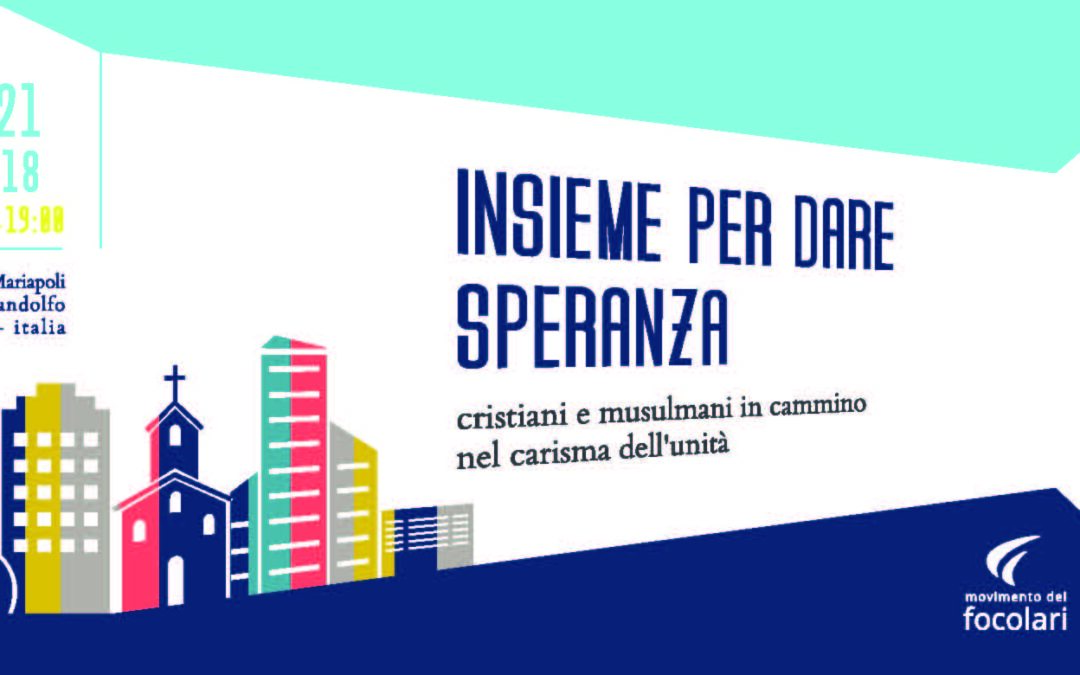
Mar 23, 2018 | Non categorizzato
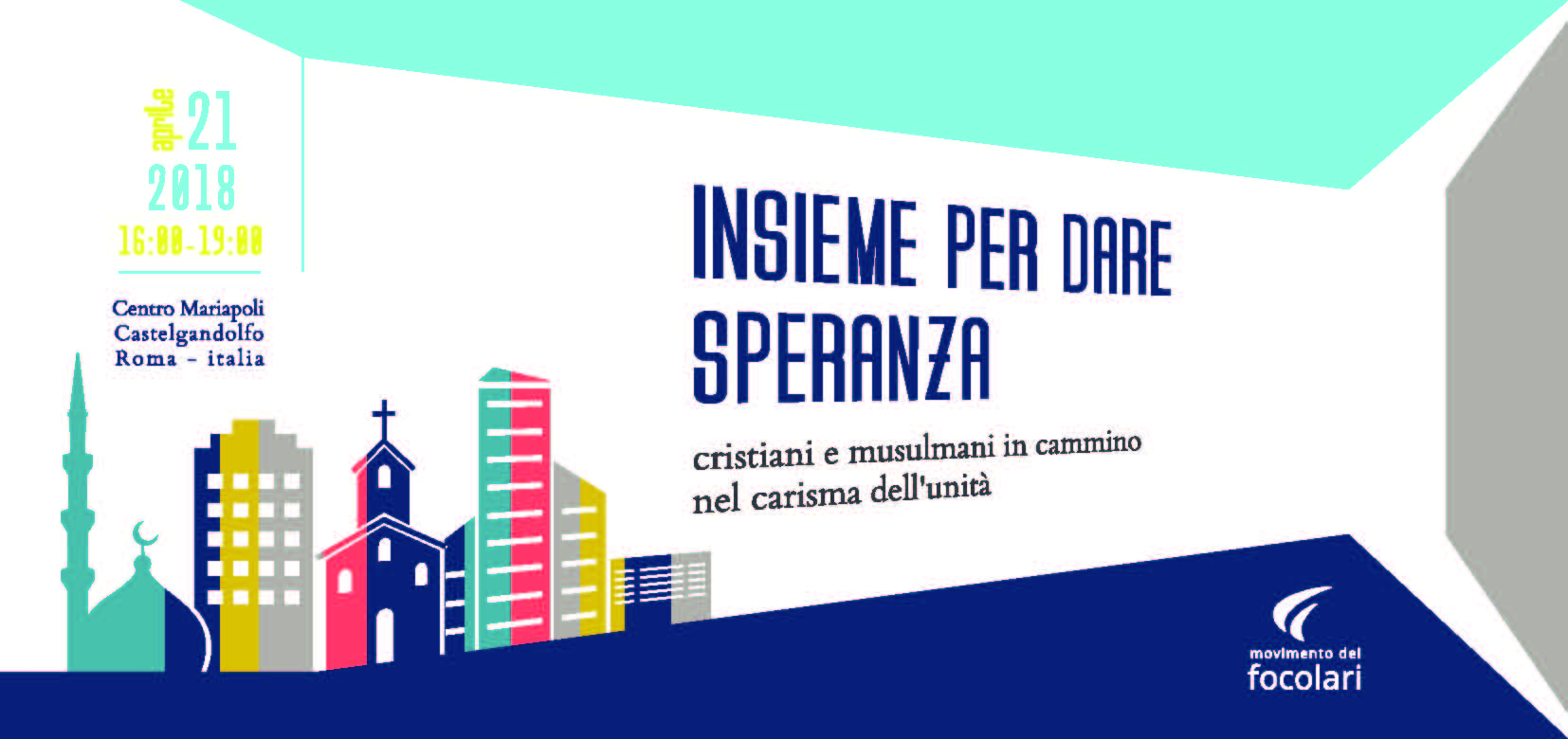 Christians and Muslims on the march, in the charism of unity “What is impossible to thousands of isolated and divided individuals, seems to become possible for people who have made mutual love, mutual understanding and unity the essential motive of their life.” (Chiara Lubich to a group of Muslims, December 7, 2002 in Madrid, Spain) Promoted by the Focolare Movement’s Centre for Interreligious Dialogue, an open gathering will be held on the afternoon of April 21, 2018, from 16:00 until 19:00. The event will take place within the context of some days of sharing between Muslims and Christians which has grown into very solid dialogue and fraternity. Reflections and experiences will be offered from around the world that began and developed within the light of Chiara Lubich’s charism of unity. The common hope is to offer some glimpses of hope inside the complex and often painful situations today’s world is going through. The event will take place at the Mariapolis Centre of Castelgandolfo, Italy. For information: congressoaprile18@focolare.org
Christians and Muslims on the march, in the charism of unity “What is impossible to thousands of isolated and divided individuals, seems to become possible for people who have made mutual love, mutual understanding and unity the essential motive of their life.” (Chiara Lubich to a group of Muslims, December 7, 2002 in Madrid, Spain) Promoted by the Focolare Movement’s Centre for Interreligious Dialogue, an open gathering will be held on the afternoon of April 21, 2018, from 16:00 until 19:00. The event will take place within the context of some days of sharing between Muslims and Christians which has grown into very solid dialogue and fraternity. Reflections and experiences will be offered from around the world that began and developed within the light of Chiara Lubich’s charism of unity. The common hope is to offer some glimpses of hope inside the complex and often painful situations today’s world is going through. The event will take place at the Mariapolis Centre of Castelgandolfo, Italy. For information: congressoaprile18@focolare.org
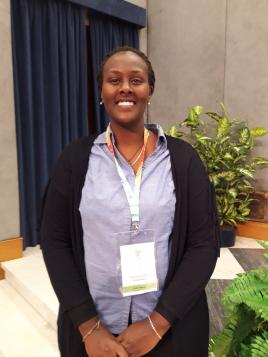
Mar 23, 2018 | Non categorizzato
 “I saw in the Pope, enthusiasm in listening. He asked us to speak up with courage, with no filters, freely, and this is what we do. The Church is at our disposal, and we are certain that the Synod in October will bear many fruits.” Stella Nishimwe comes from Burundi, is a member of the Focolare Movement, and represents her country in the pre-Synodal assembly. “I was struck by what Pope Francis said yesterday. He’s a special person who lives with the people of God and really knows the reality of the world. Together with the population he wishes to seek solutions, starting from the aspects of life. From the Synod, I expect a new path of the Church with the youth will arise, where the young people will feel the common responsibility in the progress of the Church.” Nishimwe then spoke of the conditions of the young people in her country: “They live in poverty, in the uncertainty of the future, with an elevated unemployment. With this Synod I see a Church that listens, walks with us, shares the difficulties which the youth undergo in different countries, under contexts of war, poverty and unemployment. These situations will be difficult to change, but at least we can try together and in so doing experience what it means to be a Church, a sole family.” Fonte: SIR https://www.agensir.it/quotidiano/2018/3/20/pre-sinodo-giovani-nishimwe-burundi-ho-visto-nel-papa-lentusiasmo-dellascolto/
“I saw in the Pope, enthusiasm in listening. He asked us to speak up with courage, with no filters, freely, and this is what we do. The Church is at our disposal, and we are certain that the Synod in October will bear many fruits.” Stella Nishimwe comes from Burundi, is a member of the Focolare Movement, and represents her country in the pre-Synodal assembly. “I was struck by what Pope Francis said yesterday. He’s a special person who lives with the people of God and really knows the reality of the world. Together with the population he wishes to seek solutions, starting from the aspects of life. From the Synod, I expect a new path of the Church with the youth will arise, where the young people will feel the common responsibility in the progress of the Church.” Nishimwe then spoke of the conditions of the young people in her country: “They live in poverty, in the uncertainty of the future, with an elevated unemployment. With this Synod I see a Church that listens, walks with us, shares the difficulties which the youth undergo in different countries, under contexts of war, poverty and unemployment. These situations will be difficult to change, but at least we can try together and in so doing experience what it means to be a Church, a sole family.” Fonte: SIR https://www.agensir.it/quotidiano/2018/3/20/pre-sinodo-giovani-nishimwe-burundi-ho-visto-nel-papa-lentusiasmo-dellascolto/
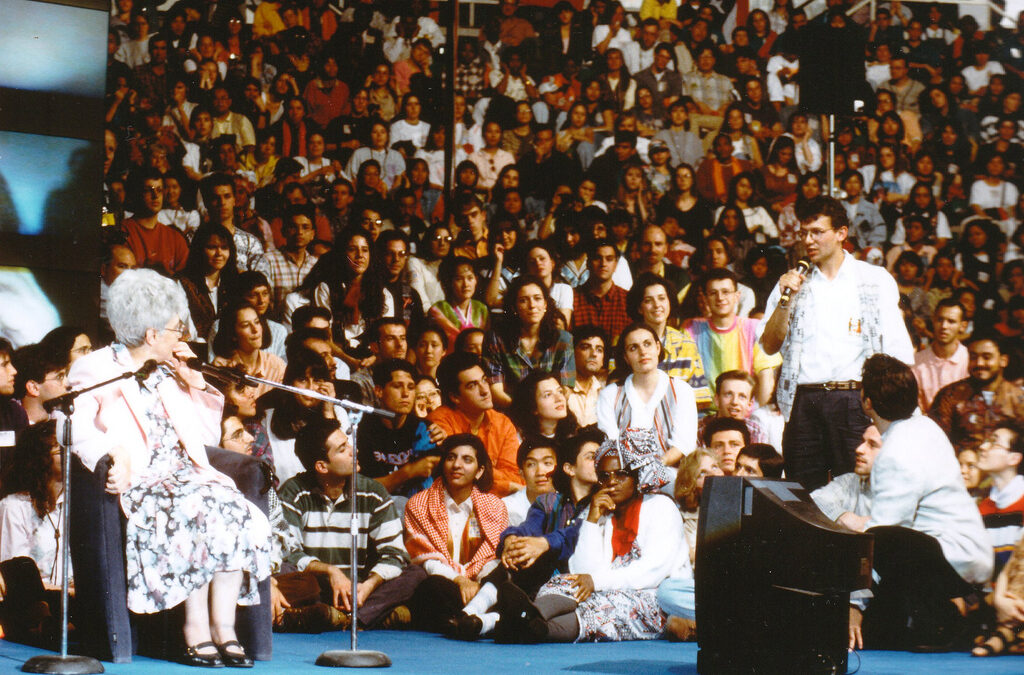
Mar 23, 2018 | Focolare Worldwide
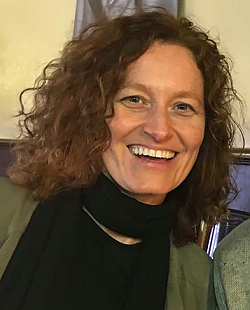
Michelle Sopala
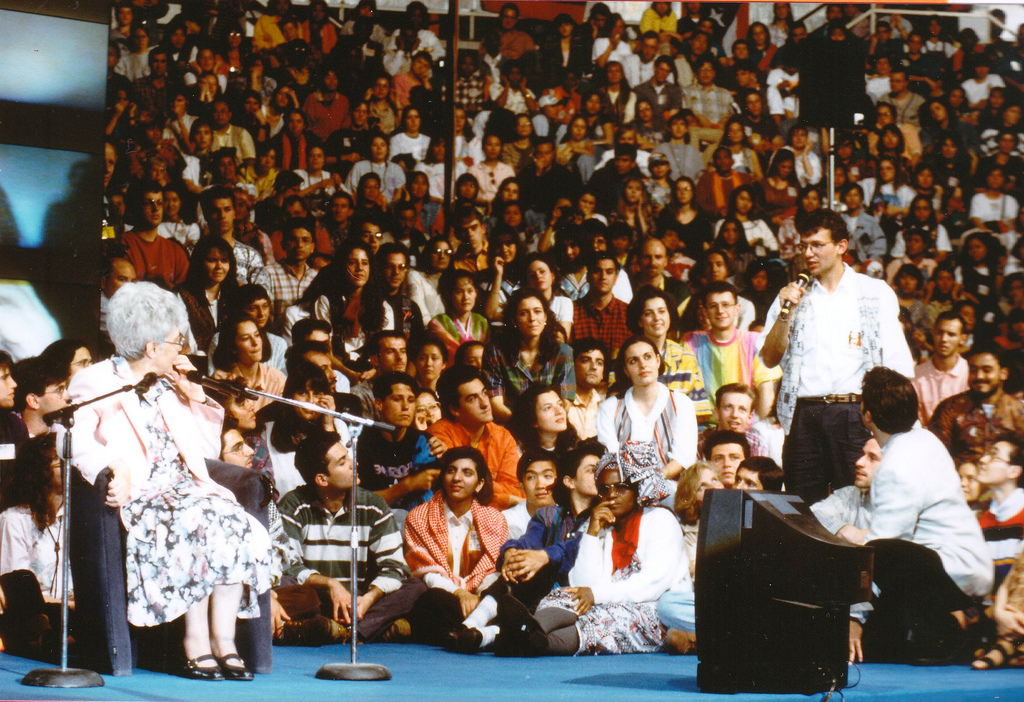 And now for the Genfest, itself! Even though it was a life-changing event in all its aspects, I can’t hide it: for me the highlight was the meeting with Chiara. I don’t know if the other 12 thousand young people in the arena felt the same, but I felt like Chiara was talking to me, and me alone. When Noel asked her the final question, «Chiara, from the bottom of your heart, what would you like to say to us young people?», her answer rang out like a war-call that still rings in my ears. With a super-astute intuition and understanding of what the young heart yearns for, she quoted St. Catherine who had told her disciples not to be satisfied with small things because “God wants them big!”. «You, young people – she said, with a conviction that went straight to the heart – don’t be satisfied with crumbs… with small joys… but aim high and seek the fullness of joy: that joy that comes from living out unity!» Hmm. For better or for worse, that’s been my experience ever since. “Unity”? A deep word that I’m still discovering after these 23 years. But that “fullness of joy”? Yep! I’ve found it! Oh! …and by the way, our performance was chosen. Take a look. Hope you like it! Michelle Sopala
And now for the Genfest, itself! Even though it was a life-changing event in all its aspects, I can’t hide it: for me the highlight was the meeting with Chiara. I don’t know if the other 12 thousand young people in the arena felt the same, but I felt like Chiara was talking to me, and me alone. When Noel asked her the final question, «Chiara, from the bottom of your heart, what would you like to say to us young people?», her answer rang out like a war-call that still rings in my ears. With a super-astute intuition and understanding of what the young heart yearns for, she quoted St. Catherine who had told her disciples not to be satisfied with small things because “God wants them big!”. «You, young people – she said, with a conviction that went straight to the heart – don’t be satisfied with crumbs… with small joys… but aim high and seek the fullness of joy: that joy that comes from living out unity!» Hmm. For better or for worse, that’s been my experience ever since. “Unity”? A deep word that I’m still discovering after these 23 years. But that “fullness of joy”? Yep! I’ve found it! Oh! …and by the way, our performance was chosen. Take a look. Hope you like it! Michelle Sopala
https://youtu.be/LX6rNkyGjoE
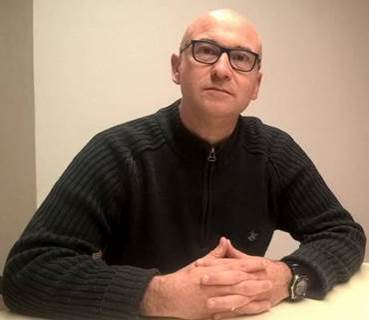
Mar 22, 2018 | Non categorizzato

Jonathan Michelon
https://twitter.com/twitter/statuses/976421224095076352
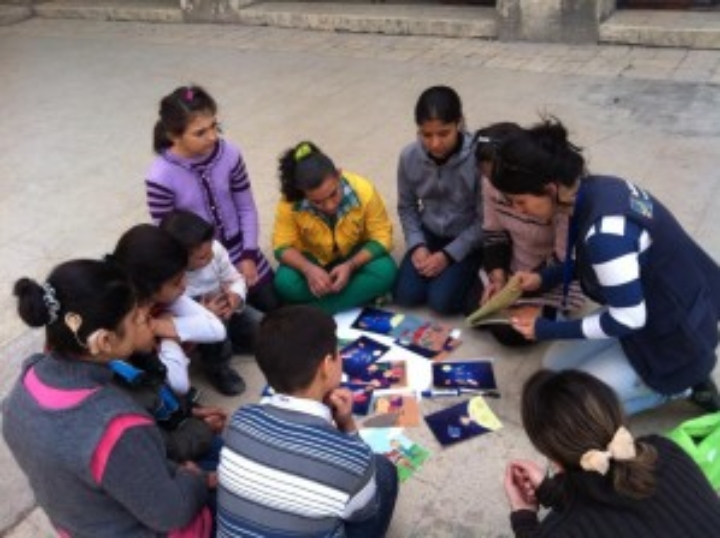
Mar 22, 2018 | Focolare Worldwide
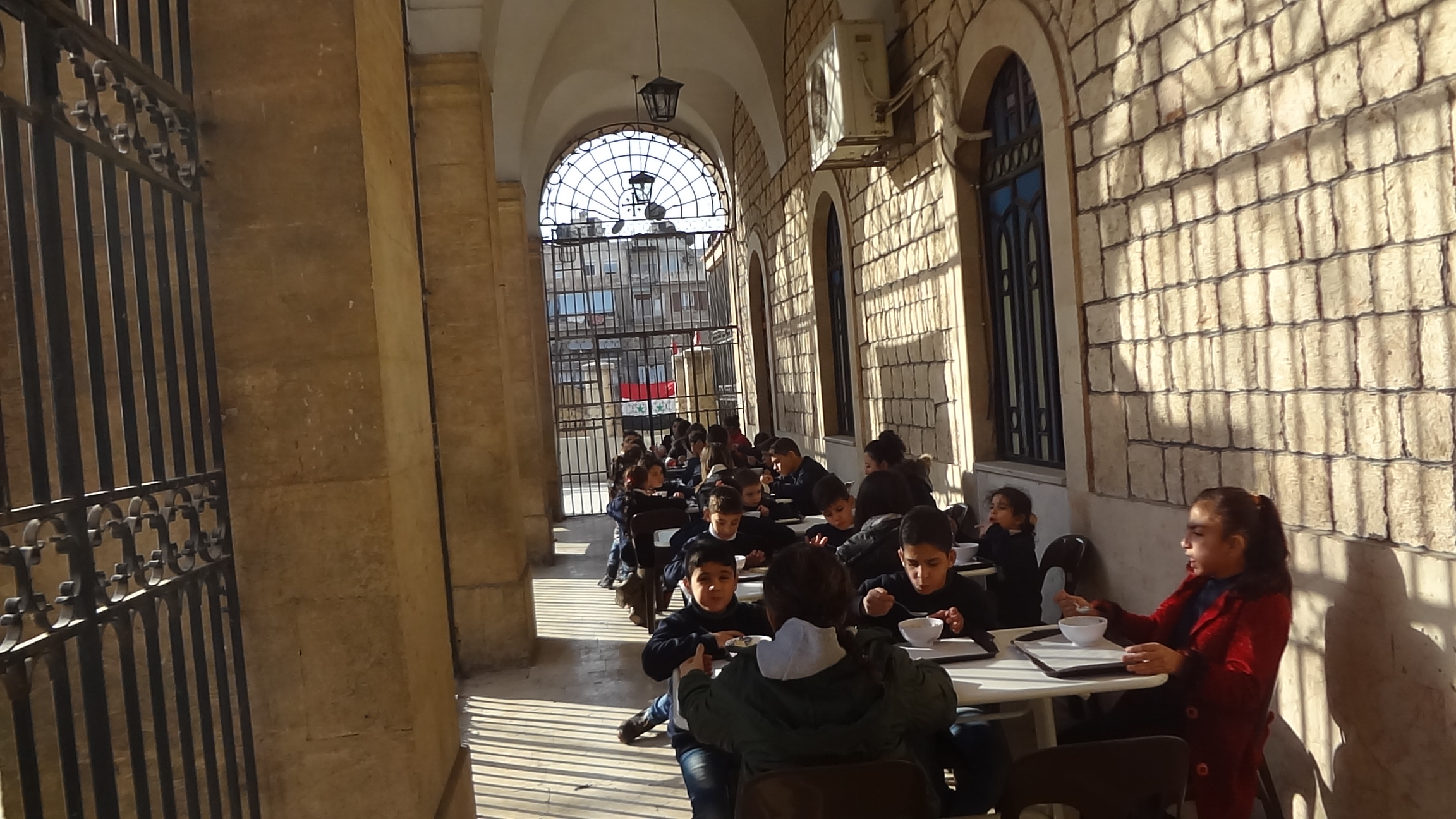 The story of Jean and Vivian is a story of love, hope and courage. They met in Aleppo, Syria, in 2000 while belonging to the Focolare Movement. Vivian is a widow with a one year-old son who is totally deaf. Jean is a carpenter and socially active. Their common commitment to living the Gospel and bringing the ideal of a united world to humanity brought them closer and, in 2003 they got married and have four children. Vivian’s first son, Marc, was the motivation behind their adventure. Because of his need for special care, Vivian went to Lebanon where Marc would later follow and stay at a centre run by the Focolare: “It’s really a foretaste of Heaven,” he says. “Living the Gospel in daily life accompanies the whole educational process. The children grow up in this oasis of peace and develop their talents while overcoming their handicap. The dream began to grow in me of setting up an institute myself, in my own city of Aleppo.” Jean supported him in his venture and, in 2005, their small centre was begun. Other larger ones would follow with larger capacity for up to ten children, all from poor families who couldn’t afford the cost. The centre was always in deficit: “Whenever we needed something,” Jean recalls, “we’d go in front of the crucifix and hand over our needs to Him. Providence arrived right on time every time.”
The story of Jean and Vivian is a story of love, hope and courage. They met in Aleppo, Syria, in 2000 while belonging to the Focolare Movement. Vivian is a widow with a one year-old son who is totally deaf. Jean is a carpenter and socially active. Their common commitment to living the Gospel and bringing the ideal of a united world to humanity brought them closer and, in 2003 they got married and have four children. Vivian’s first son, Marc, was the motivation behind their adventure. Because of his need for special care, Vivian went to Lebanon where Marc would later follow and stay at a centre run by the Focolare: “It’s really a foretaste of Heaven,” he says. “Living the Gospel in daily life accompanies the whole educational process. The children grow up in this oasis of peace and develop their talents while overcoming their handicap. The dream began to grow in me of setting up an institute myself, in my own city of Aleppo.” Jean supported him in his venture and, in 2005, their small centre was begun. Other larger ones would follow with larger capacity for up to ten children, all from poor families who couldn’t afford the cost. The centre was always in deficit: “Whenever we needed something,” Jean recalls, “we’d go in front of the crucifix and hand over our needs to Him. Providence arrived right on time every time.”  The breakout of the war in 2011 brought much death and destruction. Jean lost his carpentry, the centre wasn’t having any financial input and many were living on help from the Church and humanitarian organizations. Many left the country and, even though Jean and Vivian were tormented at the thought, they bought tickets to go. But one thing became clearer and clearer in their hearts: they couldn’t leave “their” deaf children and destroy that dream that had come true with so much effort. “On the night before our departure, I stepped into church,” Jeans says, “I had a deep conversation with Jesus, face to face, man to man. He seemed to speak in my heart and asked me not to go: what would the children now? I felt him posing this tragic question to me. I put my children in His hands. I went home and Vivian and I decided to rip up the tickets and stay in the city forever to be a help to the people who needed us.” “We were hopeful that God would accompany and support us in all our future projects and especially in our family,” echoed Vivian, “and that’s what happened.” Now the centre is their second home, their children also take part in the life of the group and Jean works full time “This community has widened our hearts. There is no longer boy or girl, student or teacher, healthy or handicapped, Muslim or Christian. We live in the one love and beneath the same gaze of a God-Love, incarnate, living in our midst.”
The breakout of the war in 2011 brought much death and destruction. Jean lost his carpentry, the centre wasn’t having any financial input and many were living on help from the Church and humanitarian organizations. Many left the country and, even though Jean and Vivian were tormented at the thought, they bought tickets to go. But one thing became clearer and clearer in their hearts: they couldn’t leave “their” deaf children and destroy that dream that had come true with so much effort. “On the night before our departure, I stepped into church,” Jeans says, “I had a deep conversation with Jesus, face to face, man to man. He seemed to speak in my heart and asked me not to go: what would the children now? I felt him posing this tragic question to me. I put my children in His hands. I went home and Vivian and I decided to rip up the tickets and stay in the city forever to be a help to the people who needed us.” “We were hopeful that God would accompany and support us in all our future projects and especially in our family,” echoed Vivian, “and that’s what happened.” Now the centre is their second home, their children also take part in the life of the group and Jean works full time “This community has widened our hearts. There is no longer boy or girl, student or teacher, healthy or handicapped, Muslim or Christian. We live in the one love and beneath the same gaze of a God-Love, incarnate, living in our midst.”
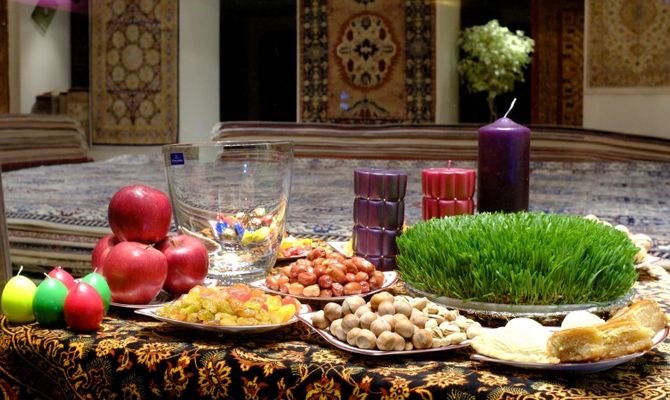
Mar 21, 2018 | Non categorizzato
 The celebration of the Persian New Year coincides with the vernal equinox which marks the beginning of spring, on 21 March, day in which many countries of Asia and Eastern Europe celebrate the feast of Nawroz (literally “new day”) proclaimed the international day of the United Nations which in 2009 was officially registered as an Intangible Cultural Heritage of humanity. Nawroz is an ancient, happy and joyous feast, estimated to be celebrated by 300 million people. Connected to the idea of the rebirth of nature, it is pervaded by a rich symbolism and promotes values of peace, reconciliation, solidarity between generations, friendship among families, peoples and communities.
The celebration of the Persian New Year coincides with the vernal equinox which marks the beginning of spring, on 21 March, day in which many countries of Asia and Eastern Europe celebrate the feast of Nawroz (literally “new day”) proclaimed the international day of the United Nations which in 2009 was officially registered as an Intangible Cultural Heritage of humanity. Nawroz is an ancient, happy and joyous feast, estimated to be celebrated by 300 million people. Connected to the idea of the rebirth of nature, it is pervaded by a rich symbolism and promotes values of peace, reconciliation, solidarity between generations, friendship among families, peoples and communities.
Mar 21, 2018 | Non categorizzato
Could it be that there are still prejudices based on the colour of the skin despite the great achievements of the last century? Many steps have been taken, but work needs to be done to completely eliminate all forms of inequality. On 21 March, the International Day for the Elimination of Racial Discrimination, established in 1966 by the United Nations, reminds us of the massacre in Sharpeville, South Africa, which occurred on 21 March 1960. On that day, perhaps the bloodiest in apartheid history, the police opened fire on a crowd of black citizens protesting against a measure of racial segregation which was imposed on them. About 70 of them remained lifeless on the ground. In these days, campaigns in support of integration and against all forms of discrimination, hatred and violence perpetrated for racial reasons are organized in various parts of the world. The protagonists of these initiatives, as always, are the young people.
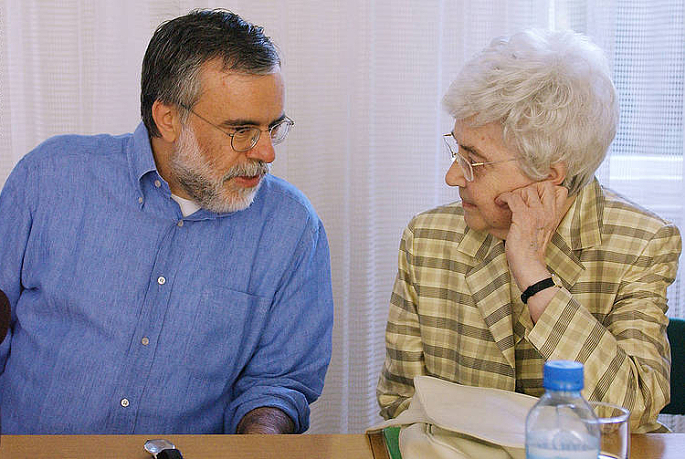
Mar 21, 2018 | Focolare Worldwide
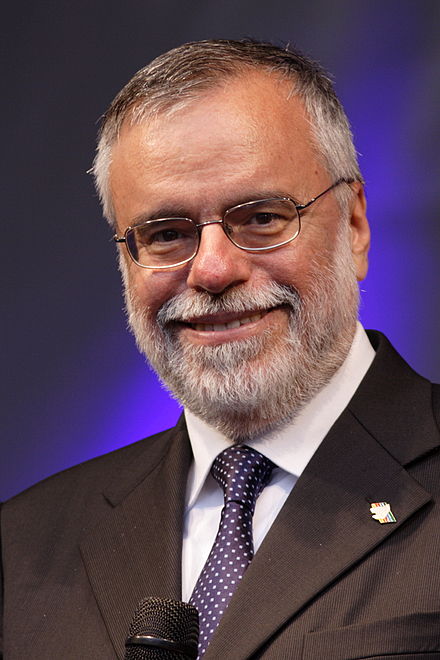 We meet Andrea Riccardi, founder of the Community of Sant’Egidio, at Castel Gandolfo, not far from the Mariapolis Center there. It feels like a holiday, since hundreds of people (in the end they will count close to 2,000) are flowing toward an event on the occasion of the 10th anniversary of Chiara Lubich’s passing. Outside the door of the small hall where we meet, there are many festive voices. “Ten years later, as we return to Chiara Lubich, it is not a return to the past, like archeology,” says Riccardi. “It’s not even a sentimental memory, as people can have for someone who was important in the Church. “But,” he confides, “It is certainly something important in my life.” He mentions the pivotal years in Europe, when democracy was returning after a century-long interruption, when the walls and iron curtains were being dismantled. “I think that Chiara’s message is even more relevant today than it was during the Cold War or in 1989. Today, in this global world, her message speaks of the common destiny of all of us, of the unity of peoples and the human family. Yet it is not a sociologist’s typical message, but a profound one, given that Chiara was a woman who was able to summarize as well as go into depth, to analyze and communicate simply. “Today we need a message of unity, because this global world is not united spiritually. Patriarch Athenagoras, a great friend of Chiara, said, ‘The world is unifying, but there is no spiritual unity.’ “And Chiara tells us that this world can be united, rich with poor, those nearby with those far away, those native to a place with those who have just arrived. Chiara also tells us,” Riccardi adds, “that we, mere men and women, the young and the elderly, that you too, can change the world.
We meet Andrea Riccardi, founder of the Community of Sant’Egidio, at Castel Gandolfo, not far from the Mariapolis Center there. It feels like a holiday, since hundreds of people (in the end they will count close to 2,000) are flowing toward an event on the occasion of the 10th anniversary of Chiara Lubich’s passing. Outside the door of the small hall where we meet, there are many festive voices. “Ten years later, as we return to Chiara Lubich, it is not a return to the past, like archeology,” says Riccardi. “It’s not even a sentimental memory, as people can have for someone who was important in the Church. “But,” he confides, “It is certainly something important in my life.” He mentions the pivotal years in Europe, when democracy was returning after a century-long interruption, when the walls and iron curtains were being dismantled. “I think that Chiara’s message is even more relevant today than it was during the Cold War or in 1989. Today, in this global world, her message speaks of the common destiny of all of us, of the unity of peoples and the human family. Yet it is not a sociologist’s typical message, but a profound one, given that Chiara was a woman who was able to summarize as well as go into depth, to analyze and communicate simply. “Today we need a message of unity, because this global world is not united spiritually. Patriarch Athenagoras, a great friend of Chiara, said, ‘The world is unifying, but there is no spiritual unity.’ “And Chiara tells us that this world can be united, rich with poor, those nearby with those far away, those native to a place with those who have just arrived. Chiara also tells us,” Riccardi adds, “that we, mere men and women, the young and the elderly, that you too, can change the world.  “Chiara was a friend to great people and appreciated by great people. I think of her friendship with John Paul II, who called her his ‘peer, his equal in age.’ But Chiara also showed that the world can change through the least of us who has faith. Like Mary with the Magnificat. “She helped me to understand the value of a charism, because Chiara recognized in me, in the Community of Sant’Egidio, a charism. She had a deep sense of people and experiences of Church.” Riccardi concludes: “For me Chiara is also a very dear memory of a profound friendship. She was a friend, a friend in the small things, in the attention she gave when she invited you to her table, in the phone calls, in taking care of you. “She was also someone who saw accurately in important moments for the Church. I think of, for example, of when John Paul II met with ecclesial movements. Chiara said, ‘This was a flash of inspiration from the Pope, a point of arrival that must also become a new point of departure.’ “Today my affection is accompanied with prayerful thoughts with Chiara, for Chiara.”
“Chiara was a friend to great people and appreciated by great people. I think of her friendship with John Paul II, who called her his ‘peer, his equal in age.’ But Chiara also showed that the world can change through the least of us who has faith. Like Mary with the Magnificat. “She helped me to understand the value of a charism, because Chiara recognized in me, in the Community of Sant’Egidio, a charism. She had a deep sense of people and experiences of Church.” Riccardi concludes: “For me Chiara is also a very dear memory of a profound friendship. She was a friend, a friend in the small things, in the attention she gave when she invited you to her table, in the phone calls, in taking care of you. “She was also someone who saw accurately in important moments for the Church. I think of, for example, of when John Paul II met with ecclesial movements. Chiara said, ‘This was a flash of inspiration from the Pope, a point of arrival that must also become a new point of departure.’ “Today my affection is accompanied with prayerful thoughts with Chiara, for Chiara.”
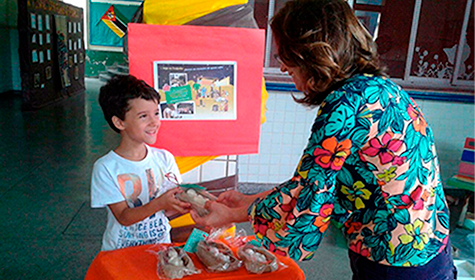
Mar 20, 2018 | Non categorizzato
 A letter of thanks was sent to the gen4 worldwide, with the publication of the balance statement of the initiative “They’ve dislodged Jesus,” undertaken each year by the children of the Focolare Movement during the Christmas season. Last Christmas, thanks to the offers gathered by the sales of the chalk statues of “babes” portraying Baby Jesus, the gen4 with the support of the adults and in some cases also of local institutions, collected 3,627.60 euro that were allocated to eight projects in Brazil, Mexico, Colombia, Venezuela, Peru, Argentina, Burundi, Uganda and Syria. In addition to this, a donation was allocated to medical care, foodstuffs and schooling material for four projects in the Central African Republic, Cameroon, Egypt and Iraq. What comes to the fore, beyond the figures, is the “culture of giving” from which the gen4 draw inspiration.
A letter of thanks was sent to the gen4 worldwide, with the publication of the balance statement of the initiative “They’ve dislodged Jesus,” undertaken each year by the children of the Focolare Movement during the Christmas season. Last Christmas, thanks to the offers gathered by the sales of the chalk statues of “babes” portraying Baby Jesus, the gen4 with the support of the adults and in some cases also of local institutions, collected 3,627.60 euro that were allocated to eight projects in Brazil, Mexico, Colombia, Venezuela, Peru, Argentina, Burundi, Uganda and Syria. In addition to this, a donation was allocated to medical care, foodstuffs and schooling material for four projects in the Central African Republic, Cameroon, Egypt and Iraq. What comes to the fore, beyond the figures, is the “culture of giving” from which the gen4 draw inspiration.
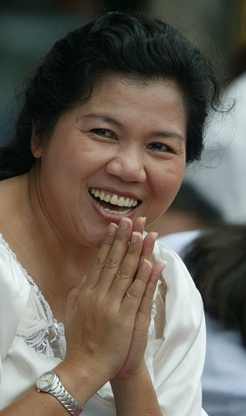
Mar 20, 2018 | Non categorizzato

Foto: Pixabay
Mar 19, 2018 | Focolare Worldwide
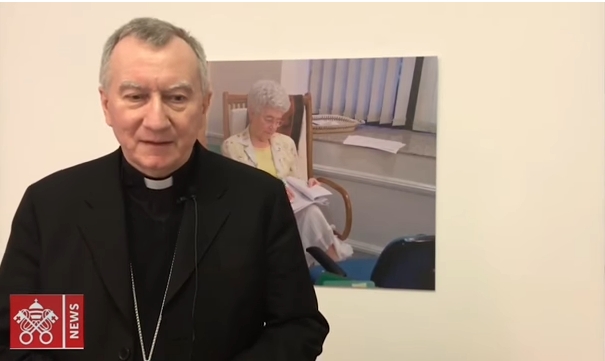
Mar 17, 2018 | Non categorizzato
 A great spiritual force capable of drawing crowds of different ages, social backgrounds, cultures: this is what animated Chiara Lubich and the fruits are still seen today, even in the Church. Cardinal Pietro Parolin, recalling the obedience and docility shown by the Focolare towards the Church – even in the most difficult moments – remarked how the Pontiffs, from Paul VI onwards, always gave their support and encouragement to the Movement. “A constant commitment to communion within the Church, in ecumenical dialogue and in striving to build the human family”, Benedict XVI spoke in the telegram sent on the occasion of Chiara’s funeral, whose “existence”, he continued, “was spent listening to the needs of contemporary society in full fidelity to the Church and to the Pope “. The specific contribution that Chiara has offered to the Church, according to the Vatican Secretary of State, Cardinal Parolin, is having deepened and brought to the fore the “Marian profile of the Church, as well as the apostolic one” and the strong and innovative call to unity: “May all be one for the world to believe”, built and made possible by the “secret” of mutual love found in the “Golden rule” that Jesus himself taught us in “not doing to others what you would not want done to you“.
A great spiritual force capable of drawing crowds of different ages, social backgrounds, cultures: this is what animated Chiara Lubich and the fruits are still seen today, even in the Church. Cardinal Pietro Parolin, recalling the obedience and docility shown by the Focolare towards the Church – even in the most difficult moments – remarked how the Pontiffs, from Paul VI onwards, always gave their support and encouragement to the Movement. “A constant commitment to communion within the Church, in ecumenical dialogue and in striving to build the human family”, Benedict XVI spoke in the telegram sent on the occasion of Chiara’s funeral, whose “existence”, he continued, “was spent listening to the needs of contemporary society in full fidelity to the Church and to the Pope “. The specific contribution that Chiara has offered to the Church, according to the Vatican Secretary of State, Cardinal Parolin, is having deepened and brought to the fore the “Marian profile of the Church, as well as the apostolic one” and the strong and innovative call to unity: “May all be one for the world to believe”, built and made possible by the “secret” of mutual love found in the “Golden rule” that Jesus himself taught us in “not doing to others what you would not want done to you“.
Mar 17, 2018 | Non categorizzato
Christians are not allowed to despair; they’re not allowed to accept defeat. Their homes can fall apart, their wealth can be lost, but they get up and continue to fight against all adversaries. Lazy spirits, nestled in their comfortable ways, become frightened at the idea of a struggle. But Christianity will be around for as long as faith in the Resurrection resists. The Resurrection of Christ, which inserts us in Him and makes us sharers in His life, obliges us to never despair. It gives us the secret for getting up again after every knock down. Lent is also an examination of conscience, through which we can consider what is buzzing around in the depth of our soul and of our society in which Christianity has become business as usual for many of us, without any pulse or impetus, like a sail without wind. Lent prepares us for the Resurrection of Christ, which is the reason for the rebirth of our faith, hope and charity: the victory of deeds over negative tendencies. Easter teaches us to overcome our mournful passions in order to be reborn, each one of us, in a unity of affections with our neighbor and with every population, in a harmony of good works in order to establish ourselves in the kingdom of God. This is translated into a social constitution that has authority, laws and sanctions, actions in favour of the good of the people. It reaches to Heaven, but passes through the world. And it is modelled on the Divine Order. It’s law is the Gospel that contains unity, solidarity, equality, paternity,service, justice, rationality, truth, the battle against the abuse of power, against enmity, error, stupidity… Seeking the kingdom therefore means seeking the happiest conditions for the free expression of the life of individuals and of society as a whole. The reason is obvious: Wherever God reigns, the human person is like a son of God, a creature of infinite value who treats others and is treated by them as a brother [or sister]. And he treats them as he would like to be treated. The goods of the earth are shared in a brotherly way. Love and forgiveness flow. Barriers don’t matter, because they don’t have any meaning within the universality of love. Putting the kingdom of God first, therefore, means raising the goal of human life. Those who seek first the kingdom of Man, seek a goal that is subjected to rivalry and dispute; whereas, the Divine objective draws people higher than their fights, and unites them in love. Then, within that unification, in that higher vision of the things of the earth, matters such as eating, clothing and enjoying take on the right proportions. They’re coloured with new meaning, are simplified in love, and you have the full life. Also in this sense Christ has conquered the world for us. Igino Giordani. Le feste, S.E.I. (Società Editrice Internazionale), Turin, 1954, pp. 110-125.

 It will be discussed on Saturday, April 21, from 16 to 19 pm, within the wider context of a conference promoted by the Focolare Movement. The title of this event is“Together as a sign of hope. Christians and Muslims journeying together in the light of the charism of unity” and it will take place at the Mariapolis Centre in Castel Gandolfo, Rome from the 19 to 22 April. About 600 Christians and Muslims are expected to attend. In a social context, particularly in the western world, marked by fear, prejudice and distrust that build barriers and by ideas that nourish clashes and divisions, witness of a shared commitment between Christians and Muslims, launches a message that goes against the current and sows seeds of hope. These Christians and Muslims unit for peace, solidarity, development and harmony among peoples of different faiths, cultures and traditions. It is possible to live together in harmony, respect, solidarity and peace. It is also possible to work together, share common objectives and cooperate to achieve them, without weakening one’s identity and heritage of values, while exercising a fair and frank confrontation that strengthens mutual understanding and respect, and giving preference to that which unites over that which divides. The driving force of this journey is the charism of unity of Chiara Lubich. On May 18, 1997, in her speech at the Malcolm X Mosque in Harlem, where she made a pact to work for unity and peace together with Imam Wallace Deen Mohammed and the Muslim community present, she said: “Here I have experienced profound fraternity. Its beauty is so remarkable that it can only be God’s work. He has really made us one family for his plans”. While speaking about the underlying principle of this journey of communion, she explained: “The so-called Golden Rule – ‘Do not do to others as you would not have them do to you’ – is common to almost all religions, even if with different versions. This Golden Rule is enough to guarantee our bond of love with each neighbour, and this love would be enough to make humanity become one family”. In the wake of that experience and of initiatives launched in various countries to promote Islamic-Christian dialogue, the coming event at Castelgandolfo aims at being a step foward in the journey towards universal brotherhood and a sign of hope for humanity. “Religious education is attention to peace” says Adnane Mokrani, a professor at the Pontifical Gregorian University and at the Pontifical Institute for Arabic and Islamic Studies (PISAI) and president of Cipax, who will be present at the conference. “With such an approach, there would be no divisions, but there would be solidarity, collaboration, unity among people of different faiths, called to work together for the common good of humanity and to serve everyone without any distinction”. Maria Voce, President of the Focolare Movement, Cardinal Jean-Louis Pierre Tauran, President of the Pontifical Council for Interreligious Dialogue, Abdullah el Radwan, Head of the Islamic Cultural Centre of Italy, Izzedin Elzir, Imam of Florence and president of UCOII, Piero Coda, Dean of the Sophia University Institute and Mohammad Shomali, director of the London Islamic Centre will be among the speakers during this open gathering. Numerous experiences of dialogue and fruitful collaboration will be shared as fragments of unity to be multiplied.
It will be discussed on Saturday, April 21, from 16 to 19 pm, within the wider context of a conference promoted by the Focolare Movement. The title of this event is“Together as a sign of hope. Christians and Muslims journeying together in the light of the charism of unity” and it will take place at the Mariapolis Centre in Castel Gandolfo, Rome from the 19 to 22 April. About 600 Christians and Muslims are expected to attend. In a social context, particularly in the western world, marked by fear, prejudice and distrust that build barriers and by ideas that nourish clashes and divisions, witness of a shared commitment between Christians and Muslims, launches a message that goes against the current and sows seeds of hope. These Christians and Muslims unit for peace, solidarity, development and harmony among peoples of different faiths, cultures and traditions. It is possible to live together in harmony, respect, solidarity and peace. It is also possible to work together, share common objectives and cooperate to achieve them, without weakening one’s identity and heritage of values, while exercising a fair and frank confrontation that strengthens mutual understanding and respect, and giving preference to that which unites over that which divides. The driving force of this journey is the charism of unity of Chiara Lubich. On May 18, 1997, in her speech at the Malcolm X Mosque in Harlem, where she made a pact to work for unity and peace together with Imam Wallace Deen Mohammed and the Muslim community present, she said: “Here I have experienced profound fraternity. Its beauty is so remarkable that it can only be God’s work. He has really made us one family for his plans”. While speaking about the underlying principle of this journey of communion, she explained: “The so-called Golden Rule – ‘Do not do to others as you would not have them do to you’ – is common to almost all religions, even if with different versions. This Golden Rule is enough to guarantee our bond of love with each neighbour, and this love would be enough to make humanity become one family”. In the wake of that experience and of initiatives launched in various countries to promote Islamic-Christian dialogue, the coming event at Castelgandolfo aims at being a step foward in the journey towards universal brotherhood and a sign of hope for humanity. “Religious education is attention to peace” says Adnane Mokrani, a professor at the Pontifical Gregorian University and at the Pontifical Institute for Arabic and Islamic Studies (PISAI) and president of Cipax, who will be present at the conference. “With such an approach, there would be no divisions, but there would be solidarity, collaboration, unity among people of different faiths, called to work together for the common good of humanity and to serve everyone without any distinction”. Maria Voce, President of the Focolare Movement, Cardinal Jean-Louis Pierre Tauran, President of the Pontifical Council for Interreligious Dialogue, Abdullah el Radwan, Head of the Islamic Cultural Centre of Italy, Izzedin Elzir, Imam of Florence and president of UCOII, Piero Coda, Dean of the Sophia University Institute and Mohammad Shomali, director of the London Islamic Centre will be among the speakers during this open gathering. Numerous experiences of dialogue and fruitful collaboration will be shared as fragments of unity to be multiplied.






 Fr Angelo Romano, Rector of the Basilica of St Bartholomew in Rome, for the Community of Sant’Egidio and in charge of dialogue, “There are sectors in which the path of communion has to grow: as Christians we cannot refuse to question ourselves about the phenomenon of migration and take steps together. Another topic to examine more deeply are the conflicts, which generate poverty and suffering and send a message that is contrary to the Gospel, which says that those who are different can never live together; whereas, we believe that the Gospel is a leaven of unity and peace, and Christians are called to provide a new perspective.” The work of the movements is an incarnation of the Gospel: “We’re the answer,” says Martinez, “of that dichotomy that many would like to put between doctrine and mercy, because the theology of the spirit is done with the life.” And proposing a Church that is poor and missionary is not in antithesis with the doctrine, but part of it: “It’s that dialogue with the world and modernity that the Second Vatican Council prophesied,” says Martinez, “which Paul VI was the first to attempt and all the popes to continue. It’s this original synthesis that the Pope asks us to give witness to: a doctrine that one incarnates in the history.” In this prospective, twenty years from 1998, the ecclesial movements appear more and more to be “the Providential answer to the needs of our time”. It is an answer that implies a constant effort towards unity, to bringing the face of Christ to the human peripheries.
Fr Angelo Romano, Rector of the Basilica of St Bartholomew in Rome, for the Community of Sant’Egidio and in charge of dialogue, “There are sectors in which the path of communion has to grow: as Christians we cannot refuse to question ourselves about the phenomenon of migration and take steps together. Another topic to examine more deeply are the conflicts, which generate poverty and suffering and send a message that is contrary to the Gospel, which says that those who are different can never live together; whereas, we believe that the Gospel is a leaven of unity and peace, and Christians are called to provide a new perspective.” The work of the movements is an incarnation of the Gospel: “We’re the answer,” says Martinez, “of that dichotomy that many would like to put between doctrine and mercy, because the theology of the spirit is done with the life.” And proposing a Church that is poor and missionary is not in antithesis with the doctrine, but part of it: “It’s that dialogue with the world and modernity that the Second Vatican Council prophesied,” says Martinez, “which Paul VI was the first to attempt and all the popes to continue. It’s this original synthesis that the Pope asks us to give witness to: a doctrine that one incarnates in the history.” In this prospective, twenty years from 1998, the ecclesial movements appear more and more to be “the Providential answer to the needs of our time”. It is an answer that implies a constant effort towards unity, to bringing the face of Christ to the human peripheries.



 “We’ll never be able to quantify the help that we receive from our brothers and sisters. How much courage their faith inspires in us, how much warmth their love, how much their example draws us!” Chiara Lubich (1920-2008), who wrote these words, was known as someone who drew after her hundreds and thousands of people and constructed relationships with Buddhists, Muslims. She is still being followed by people with no religious affiliation and breatheing new life into politics and economy. The friendship with the first companions of Silvia Lubich whom they knew simply as “Chiara” or Clare, played no small role. It all began with a choice of God and her consecration to Him in 1943, Trent, Italy. However, quite soon it was no longer a single “I”, but a collective subject that began to move, to act, to pray and to love: Chiara and her first companions could have ended becoming anyone, but they became beacons of light on all five continents. This story has many incredible elements, but yet it’s simple. You understand it if you open and read in chapter 13 of John’s Gospel: “I give you a new commandment, that you love one another. As I have loved you, so must you love one another” (13:34). This is a commandment that can only be lived out in the company of others. When Chiara and her companions read this Gospel passage in a bomb shelter, they looked at one another very intensely as they thought about the commitment it would be. They didn’t hesitate, but said to each other: “I’m ready to love you to the point of giving my life for you.” Chiara would later consider this the cornerstone on which the entire Focolare Movement would rest. It’s certainly not something unheard of in the history of the Church, but there might be one thing new about it. Chiara immediately conveyed to her companions whatever she was living and all that the Holy Spirit was inspiring in her. The bond among them was stronger than cement, and I would like to illustrate the qulaity of their relationship that valued and freed potentials, edifying a work that was of God.
“We’ll never be able to quantify the help that we receive from our brothers and sisters. How much courage their faith inspires in us, how much warmth their love, how much their example draws us!” Chiara Lubich (1920-2008), who wrote these words, was known as someone who drew after her hundreds and thousands of people and constructed relationships with Buddhists, Muslims. She is still being followed by people with no religious affiliation and breatheing new life into politics and economy. The friendship with the first companions of Silvia Lubich whom they knew simply as “Chiara” or Clare, played no small role. It all began with a choice of God and her consecration to Him in 1943, Trent, Italy. However, quite soon it was no longer a single “I”, but a collective subject that began to move, to act, to pray and to love: Chiara and her first companions could have ended becoming anyone, but they became beacons of light on all five continents. This story has many incredible elements, but yet it’s simple. You understand it if you open and read in chapter 13 of John’s Gospel: “I give you a new commandment, that you love one another. As I have loved you, so must you love one another” (13:34). This is a commandment that can only be lived out in the company of others. When Chiara and her companions read this Gospel passage in a bomb shelter, they looked at one another very intensely as they thought about the commitment it would be. They didn’t hesitate, but said to each other: “I’m ready to love you to the point of giving my life for you.” Chiara would later consider this the cornerstone on which the entire Focolare Movement would rest. It’s certainly not something unheard of in the history of the Church, but there might be one thing new about it. Chiara immediately conveyed to her companions whatever she was living and all that the Holy Spirit was inspiring in her. The bond among them was stronger than cement, and I would like to illustrate the qulaity of their relationship that valued and freed potentials, edifying a work that was of God.  Ten years went by and it was 1954. Chiara was living with Giosi, Graziella, Natalia, Aletta, Marilen, Bruna and Eli. One day, as Chiara paused to look at them, she recalled the sentence from the book of Proverbs: “Wisdom has built her a house and set up her seven columns” (Proverbs 9:1). She was looking at the seven young women in front of her, each with her own talent, all of them united and rooted in God. These were Wisdom’s seven columns, the seven colours of the spectrum that emerge from the one light of Love. Seven interdependent aspects of love, each flowing from and into the other. Chiara entrusted Giosi with the communion of goods and the paychecks, not only the care of the poor: the red of love. To Graziella she entrusted “witness and spreading,” the orange. Natalia had been her first companion: she personified the heart of this ideal, the cry of Jesus Forsaken of love. She would carry thi secret beyond the Iron Curtain. She was the spirituality and prayer life, the yellow of the spectrum. Aletta would be remembered as the one who encouraged the members to be mindful of their health, and to form a community united in love. Chiara entrusted her with the green, Creation and physical life. To Marilen, who lived for fifteen years in the midst of a Cameroon forest, Chiara entrusted the blue: harmony and the home. Bruna was a bit of an intellectual and Chiara saw her as the one who could develop the aspect of studies: the indigo. Eli was always at Chiara’s side and helped to make sure that all the members around the world were living as one. She was entrusted with the aspect of unity and the means of communication, the violet. Some other of her first companions would also have special tasks: Dori, Ginettta, Gis, Valeria, Lia, Silvana and Palmira.
Ten years went by and it was 1954. Chiara was living with Giosi, Graziella, Natalia, Aletta, Marilen, Bruna and Eli. One day, as Chiara paused to look at them, she recalled the sentence from the book of Proverbs: “Wisdom has built her a house and set up her seven columns” (Proverbs 9:1). She was looking at the seven young women in front of her, each with her own talent, all of them united and rooted in God. These were Wisdom’s seven columns, the seven colours of the spectrum that emerge from the one light of Love. Seven interdependent aspects of love, each flowing from and into the other. Chiara entrusted Giosi with the communion of goods and the paychecks, not only the care of the poor: the red of love. To Graziella she entrusted “witness and spreading,” the orange. Natalia had been her first companion: she personified the heart of this ideal, the cry of Jesus Forsaken of love. She would carry thi secret beyond the Iron Curtain. She was the spirituality and prayer life, the yellow of the spectrum. Aletta would be remembered as the one who encouraged the members to be mindful of their health, and to form a community united in love. Chiara entrusted her with the green, Creation and physical life. To Marilen, who lived for fifteen years in the midst of a Cameroon forest, Chiara entrusted the blue: harmony and the home. Bruna was a bit of an intellectual and Chiara saw her as the one who could develop the aspect of studies: the indigo. Eli was always at Chiara’s side and helped to make sure that all the members around the world were living as one. She was entrusted with the aspect of unity and the means of communication, the violet. Some other of her first companions would also have special tasks: Dori, Ginettta, Gis, Valeria, Lia, Silvana and Palmira. 








 How did Loppiano take the news of the Pope’s visit? “Just a minute after the President,
How did Loppiano take the news of the Pope’s visit? “Just a minute after the President, 


 Easter is now over: today is Easter Monday and it’s a normal working day. It’s really hot and the rain is menacing the skies. It is only the Christians who are feasting. Here and there one can hear the cheering and the cries of Alleluia seeping out from the homes. And yet I’m in a Communist country. But as one goes out of the church, the streets are filled with the incredible sound of motorbikes blocking the traffic. The police in front of the cathedral have to direct the traffic. In order to take part in the Easter Triduum, one has to arrive 30 minutes before to find a place. In church I leave the bag on the bench and nobody touches it. I look at the people: many children, young people, couples and the elderly with their sober but smiling faces. I think of Europe, of the half-empty churches even on feast days. In these parts, even at 5 o’clock in the morning of any day, children, even small ones, together with the adults are in the first rows to sing. Here, everyone knows the prayers and the hymns by heart. In Saigon every corner is swarmed in a disorderly and nearly savage life. Yet, there is a lot of faith, perhaps as in no other Asian city. Because here faith comes at a cost. Everything costs in Vietnam. Some time ago I made a journey by bus, five and a half hours with a throng of people and in the heat. At a certain point quintals of Indian maize were loaded onto the bus among the travellers, dragged underfoot into the baggage compartment. The people started to scream whilst the driver and his assistant shouted at them to shut up. A lady near me who felt embarrassed at seeing me in that confusion, told me: “Life here is hard. Don’t forget it if you want to live here”. I don’t know that lady’s name and perhaps I’ll never see her again. But those words opened a new dimension within me. Life, theirs as well as mine, has to pass through pain, weariness, suffering, to then flow with joy. I understood her this way. From that day everything in me was simplified. Like everybody, I experience joy, but also pain and fatigue. I am one of them. I’m not even considered special because I’m a foreigner, but just one among many foreigners.
Easter is now over: today is Easter Monday and it’s a normal working day. It’s really hot and the rain is menacing the skies. It is only the Christians who are feasting. Here and there one can hear the cheering and the cries of Alleluia seeping out from the homes. And yet I’m in a Communist country. But as one goes out of the church, the streets are filled with the incredible sound of motorbikes blocking the traffic. The police in front of the cathedral have to direct the traffic. In order to take part in the Easter Triduum, one has to arrive 30 minutes before to find a place. In church I leave the bag on the bench and nobody touches it. I look at the people: many children, young people, couples and the elderly with their sober but smiling faces. I think of Europe, of the half-empty churches even on feast days. In these parts, even at 5 o’clock in the morning of any day, children, even small ones, together with the adults are in the first rows to sing. Here, everyone knows the prayers and the hymns by heart. In Saigon every corner is swarmed in a disorderly and nearly savage life. Yet, there is a lot of faith, perhaps as in no other Asian city. Because here faith comes at a cost. Everything costs in Vietnam. Some time ago I made a journey by bus, five and a half hours with a throng of people and in the heat. At a certain point quintals of Indian maize were loaded onto the bus among the travellers, dragged underfoot into the baggage compartment. The people started to scream whilst the driver and his assistant shouted at them to shut up. A lady near me who felt embarrassed at seeing me in that confusion, told me: “Life here is hard. Don’t forget it if you want to live here”. I don’t know that lady’s name and perhaps I’ll never see her again. But those words opened a new dimension within me. Life, theirs as well as mine, has to pass through pain, weariness, suffering, to then flow with joy. I understood her this way. From that day everything in me was simplified. Like everybody, I experience joy, but also pain and fatigue. I am one of them. I’m not even considered special because I’m a foreigner, but just one among many foreigners. 
 Sports and peace have been a winning combination since ancient times, when an “Olympic truce” was put in force during the games that were celebrated in honor of Zeus. All public and private hostilities were put on hold in order to safeguard the athletes and spectators who had to cross enemy territories in order to reach Olympia. The International Day of Sport that will be celebrated April 6 will be held on the same day that, in 1896, saw the reopening of the Olympic Games for the modern era, once again in Greece. This emphasizes the value and relevance of this year’s Day of Sport. Paolo Cipolli is the director of Sportmeet, an international network of athletes and sports professionals. Since 2002 it has been dedicated to and contributed toward developing a sports culture that is focused on peace, development and universal fraternity. “Sport, which some sociologists have defined as an ‘imitation of war’ or ‘war without shooting,’ can still represent an element of reconciliation despite its combative content,” says Cipolli. “Through a process of catharsis, purification through conflict and the element of competition, controlled by the rules of the game, sports holds great potential for relationships.” The recent Winter Games are a great example. “What happened at PyeongChang was truly surprising,” says Cipolli. “At first, the choice of a venue near the border of the two Koreas, especially during a time when there were escalating tensions, seemed ill-fated. And yet, the miracle of sport occurred, and the Olympics showed themselves to be not only an extraordinary chance to change the expectations of a breakdown, but also a surprising opportunity to bring the two countries closer. It was a miracle that threw a curve ball at international politics,” he says. “This has happened before. Many times in recent history, sports became an opportunity to ease tensions. I remember that famous game of ping pong between China and the United States in 1971.” Sportmeet, which began within the Focolare Movement, promotes values of holistic personal growth and peace within the world of sports. What are its goals? “What moves us is the drive to bring our spiritual legacy,
Sports and peace have been a winning combination since ancient times, when an “Olympic truce” was put in force during the games that were celebrated in honor of Zeus. All public and private hostilities were put on hold in order to safeguard the athletes and spectators who had to cross enemy territories in order to reach Olympia. The International Day of Sport that will be celebrated April 6 will be held on the same day that, in 1896, saw the reopening of the Olympic Games for the modern era, once again in Greece. This emphasizes the value and relevance of this year’s Day of Sport. Paolo Cipolli is the director of Sportmeet, an international network of athletes and sports professionals. Since 2002 it has been dedicated to and contributed toward developing a sports culture that is focused on peace, development and universal fraternity. “Sport, which some sociologists have defined as an ‘imitation of war’ or ‘war without shooting,’ can still represent an element of reconciliation despite its combative content,” says Cipolli. “Through a process of catharsis, purification through conflict and the element of competition, controlled by the rules of the game, sports holds great potential for relationships.” The recent Winter Games are a great example. “What happened at PyeongChang was truly surprising,” says Cipolli. “At first, the choice of a venue near the border of the two Koreas, especially during a time when there were escalating tensions, seemed ill-fated. And yet, the miracle of sport occurred, and the Olympics showed themselves to be not only an extraordinary chance to change the expectations of a breakdown, but also a surprising opportunity to bring the two countries closer. It was a miracle that threw a curve ball at international politics,” he says. “This has happened before. Many times in recent history, sports became an opportunity to ease tensions. I remember that famous game of ping pong between China and the United States in 1971.” Sportmeet, which began within the Focolare Movement, promotes values of holistic personal growth and peace within the world of sports. What are its goals? “What moves us is the drive to bring our spiritual legacy,
 “You will be taken seriously,” the Pope ensured. How many times have the young people in this society felt they are not being considered, heeded, and taken seriously? “They may not take us seriously because they fear that our lack of experience may lead us to make mistakes in all fields. The truth is we may still have a lot to learn, but on the other hand we have something the adults don’t have, and that is our youthfulness here and now, a different experience from what they have lived. We certainly need their experience but we have this plus factor which they don’t have. The young people, however, must not fall into useless criticisms of the adults, trying to destroy the other, but instead, try to cultivate a deep inter-generational dialogue and without judgments. The young people and the adults have specific features that offer the possibility of fruitful and mutual enrichment: the adult person rejuvenates and the young mature.” So, besides the experience of dialogue with the young people of other Churches, faiths and convictions, you have also established a dialogue between generations… “In reality the two dimensions are not separate, and the religious dimension should not be distinct from our humanity and our daily lives; it would be a mistake to distinguish spiritual life from normal life. Instead, transcendence is part of man, and understanding that we are limited and seek the answers by going beyond our own selves is an anthropological issue, typical of our being human. Inter-generational dialogue is a fact because there are people of different ages. Humanity renews itself and within this fact there is also a spiritual aspect which is typical of all ages, in adults as in children.
“You will be taken seriously,” the Pope ensured. How many times have the young people in this society felt they are not being considered, heeded, and taken seriously? “They may not take us seriously because they fear that our lack of experience may lead us to make mistakes in all fields. The truth is we may still have a lot to learn, but on the other hand we have something the adults don’t have, and that is our youthfulness here and now, a different experience from what they have lived. We certainly need their experience but we have this plus factor which they don’t have. The young people, however, must not fall into useless criticisms of the adults, trying to destroy the other, but instead, try to cultivate a deep inter-generational dialogue and without judgments. The young people and the adults have specific features that offer the possibility of fruitful and mutual enrichment: the adult person rejuvenates and the young mature.” So, besides the experience of dialogue with the young people of other Churches, faiths and convictions, you have also established a dialogue between generations… “In reality the two dimensions are not separate, and the religious dimension should not be distinct from our humanity and our daily lives; it would be a mistake to distinguish spiritual life from normal life. Instead, transcendence is part of man, and understanding that we are limited and seek the answers by going beyond our own selves is an anthropological issue, typical of our being human. Inter-generational dialogue is a fact because there are people of different ages. Humanity renews itself and within this fact there is also a spiritual aspect which is typical of all ages, in adults as in children. 







 It’s the triumph of the Risen Jesus whom we know and relive personally, in our own small way, after having embraced him forsaken; or when truly united in his name, we experience the effects of his life, the fruits of his Spirit. The Risen Lord must always be present and living in us. The world is waiting for people who not only believe in and love Him one way or another, but people who are authentic witnesses. The world is waiting for people who can truly say, as Mary Magdalene said to the apostles after seeing Jesus near the tomb, those words that we know but which are always new: “We have seen him!” Yes, we have discovered him in the light with which he enlightened us; we have touched him in the peace with which he filled us; we have heard his voice in the depths of our heart; we have rejoiced in his incomparable joy. Source:
It’s the triumph of the Risen Jesus whom we know and relive personally, in our own small way, after having embraced him forsaken; or when truly united in his name, we experience the effects of his life, the fruits of his Spirit. The Risen Lord must always be present and living in us. The world is waiting for people who not only believe in and love Him one way or another, but people who are authentic witnesses. The world is waiting for people who can truly say, as Mary Magdalene said to the apostles after seeing Jesus near the tomb, those words that we know but which are always new: “We have seen him!” Yes, we have discovered him in the light with which he enlightened us; we have touched him in the peace with which he filled us; we have heard his voice in the depths of our heart; we have rejoiced in his incomparable joy. Source: 

 Young people want to find “peace, love, trust, equality, freedom and justice” in the Church. They also search for security, the capacity to listen, consideration, readiness to welcome the contribution of others. These are young people from every corner of the globe, belonging to different faiths, having different beliefs, coming from different social, economic and cultural backgrounds. Even young people who “do not follow traditional religions or say they are religious” but who are “open to spirituality” and want to work for others and for the common good are looking for a guide to provide direction and meaning in life. The young people themselves shared these ideas at a meeting that took place in Rome from March 19th -24th: this meeting was a preparation for the XV Ordinary Synod of Bishops on “Young people, the faith and vocational discernment” that will take place in October 2018. It was Pope Francis himself who wanted this Synod. The 300 young people present for the preparatory meeting and another 15 thousand linked up by web told the Church – gathered to listen in this way for the first time ever – all about their hopes and challenges and what they would like to find in those who are God’s ministers. They also spoke of what they are looking for in society as a whole. They shared their experiences and offered their suggestions to help ensure that the message of the gospel reaches an increasing number of young people, that it is expressed in the right way and with an attitude that is humble and open to dialogue. At the invitation of Pope Francis who asked the young people to speak openly and to be “cheeky” enough to ask difficult questions, they said very clearly that they wanted “attractive role models who are genuine and who do what they say”, “real witnesses who speak the gospel with their lives”, “men and women who can speak with passion about their faith and their relationship with Jesus and encourage others to draw close to him.” They want the Church to be welcoming, merciful, humble, human, inclusive, coherent, believable, “able to empathise with all the young people in the world” and show “tenderness” towards people to “don’t believe in following certain standards.” They are looking for “rational, critical responses to complex questions” such as sexuality, “addiction, marital and family breakdown” and to “the big social problems such as organised crime, human trafficking, violence, corruption, exploitation, murder of women and destruction of the natural environment.” They admit to not having a single, unified vision about complex issues such as migration and welcoming refugees even though there is “a universal duty to care for the dignity of every human being.” They also feel that there is little agreement among young people – neither within the Church nor in the broader world – about controversial issues such as “contraception, abortion, homosexuality, living together, marriage and even how the priesthood is understood.” Nonetheless, even the young people who do not share in the Church’s teaching still “want to be part of it.” Furthermore, they are shocked by the current “political, social and economic instability” and ask the Church to be “solid and with a preference for those who are struggling on the margins of society.” They want a sure guide because “simple answers are not enough.” They also expect the Church to acknowledge the mistakes it has made, all that it has failed to do and even its most painful wounds. This is the only way they can believe and trust the Church. Young people ask to be more involved in decision making, to be given responsibility and leadership roles in a broader context such as parish groups. They also feel that women should be involved more, that there should be more possibility for them to use their talents. They want the Church to be present and to search for them in the social and virtual worlds that they inhabit – in the bar, on the sports field and in social media. They also want to know more about the sacraments and to attend both large-scale events such as the World Youth Day as well as small ones in the diocese and parish. They want to be included, to be part of a group – “even a small local group where we can ask questions and share our Christian life is so important in nurturing and preserving our faith.” In conclusion, they are young people looking for their vocation in the world and for the meaning of life. They care for and cultivate their own spirituality – and almost always – see the Church as a great partner. Now it is up to the Church, as it has said itself, to take notice of what they are saying. The next appointment is in October at the Synod Assembly but, in the meantime, the Pope has said, “You will be taken seriously.”
Young people want to find “peace, love, trust, equality, freedom and justice” in the Church. They also search for security, the capacity to listen, consideration, readiness to welcome the contribution of others. These are young people from every corner of the globe, belonging to different faiths, having different beliefs, coming from different social, economic and cultural backgrounds. Even young people who “do not follow traditional religions or say they are religious” but who are “open to spirituality” and want to work for others and for the common good are looking for a guide to provide direction and meaning in life. The young people themselves shared these ideas at a meeting that took place in Rome from March 19th -24th: this meeting was a preparation for the XV Ordinary Synod of Bishops on “Young people, the faith and vocational discernment” that will take place in October 2018. It was Pope Francis himself who wanted this Synod. The 300 young people present for the preparatory meeting and another 15 thousand linked up by web told the Church – gathered to listen in this way for the first time ever – all about their hopes and challenges and what they would like to find in those who are God’s ministers. They also spoke of what they are looking for in society as a whole. They shared their experiences and offered their suggestions to help ensure that the message of the gospel reaches an increasing number of young people, that it is expressed in the right way and with an attitude that is humble and open to dialogue. At the invitation of Pope Francis who asked the young people to speak openly and to be “cheeky” enough to ask difficult questions, they said very clearly that they wanted “attractive role models who are genuine and who do what they say”, “real witnesses who speak the gospel with their lives”, “men and women who can speak with passion about their faith and their relationship with Jesus and encourage others to draw close to him.” They want the Church to be welcoming, merciful, humble, human, inclusive, coherent, believable, “able to empathise with all the young people in the world” and show “tenderness” towards people to “don’t believe in following certain standards.” They are looking for “rational, critical responses to complex questions” such as sexuality, “addiction, marital and family breakdown” and to “the big social problems such as organised crime, human trafficking, violence, corruption, exploitation, murder of women and destruction of the natural environment.” They admit to not having a single, unified vision about complex issues such as migration and welcoming refugees even though there is “a universal duty to care for the dignity of every human being.” They also feel that there is little agreement among young people – neither within the Church nor in the broader world – about controversial issues such as “contraception, abortion, homosexuality, living together, marriage and even how the priesthood is understood.” Nonetheless, even the young people who do not share in the Church’s teaching still “want to be part of it.” Furthermore, they are shocked by the current “political, social and economic instability” and ask the Church to be “solid and with a preference for those who are struggling on the margins of society.” They want a sure guide because “simple answers are not enough.” They also expect the Church to acknowledge the mistakes it has made, all that it has failed to do and even its most painful wounds. This is the only way they can believe and trust the Church. Young people ask to be more involved in decision making, to be given responsibility and leadership roles in a broader context such as parish groups. They also feel that women should be involved more, that there should be more possibility for them to use their talents. They want the Church to be present and to search for them in the social and virtual worlds that they inhabit – in the bar, on the sports field and in social media. They also want to know more about the sacraments and to attend both large-scale events such as the World Youth Day as well as small ones in the diocese and parish. They want to be included, to be part of a group – “even a small local group where we can ask questions and share our Christian life is so important in nurturing and preserving our faith.” In conclusion, they are young people looking for their vocation in the world and for the meaning of life. They care for and cultivate their own spirituality – and almost always – see the Church as a great partner. Now it is up to the Church, as it has said itself, to take notice of what they are saying. The next appointment is in October at the Synod Assembly but, in the meantime, the Pope has said, “You will be taken seriously.” 
 “I’ve recently written a book about him called “The Cry”. I dedicated it to him with the intention of writing it also on your behalf, on behalf of the whole Movement “as – and this is the dedication – a love letter to
“I’ve recently written a book about him called “The Cry”. I dedicated it to him with the intention of writing it also on your behalf, on behalf of the whole Movement “as – and this is the dedication – a love letter to 

 “September flew by. I had taken a taxi with some other people who resided in the town. We we were leaving the city that had welcomed me: Aleppo. I was among the few – perhaps the only – foreigner that had chosen this place for vacation. The taxi crossed the city, an expanse of neighbourhoods completely destroyed. How many dead were buried beneath those ruins? The driver didn’t seem to think about that as he sped along the street that led south in the direction of Homs. From there he would proceed in the direction of Beirut. After two and a half hours we were able to make out the first houses that was left standing. It was difficult to believe. I was welcomed for a month by the Focolare community. When I arrived at the door of a church, someone said to me: ‘Here you will find real Christians,’ words I had never heard spoken before. But now I understand. I saw for myself how the focolare is the place in which everything is shared: the Providence that comes from around the world, with tables full of clothes, and so forth; but mostly the joys and sorrows of daily life… Here, for years, the only support was the Word of the Gospel, the God of love. How the beginnings of the Focolare history returned to my mind, when Chiara Lubich would describe them saying those words that I heard so many times: ‘It was war time and everything crumbled!’
“September flew by. I had taken a taxi with some other people who resided in the town. We we were leaving the city that had welcomed me: Aleppo. I was among the few – perhaps the only – foreigner that had chosen this place for vacation. The taxi crossed the city, an expanse of neighbourhoods completely destroyed. How many dead were buried beneath those ruins? The driver didn’t seem to think about that as he sped along the street that led south in the direction of Homs. From there he would proceed in the direction of Beirut. After two and a half hours we were able to make out the first houses that was left standing. It was difficult to believe. I was welcomed for a month by the Focolare community. When I arrived at the door of a church, someone said to me: ‘Here you will find real Christians,’ words I had never heard spoken before. But now I understand. I saw for myself how the focolare is the place in which everything is shared: the Providence that comes from around the world, with tables full of clothes, and so forth; but mostly the joys and sorrows of daily life… Here, for years, the only support was the Word of the Gospel, the God of love. How the beginnings of the Focolare history returned to my mind, when Chiara Lubich would describe them saying those words that I heard so many times: ‘It was war time and everything crumbled!’ 


 Green and friendly
Green and friendly 














